Trending Post : Easy Kids Craft Ideas


How to Write an Unforgettable Teacher Appreciation Speech
Sharing is caring!
Today we are showing you how to write a teacher appreciation speech that’ll show your all the teachers how meaningful they are.
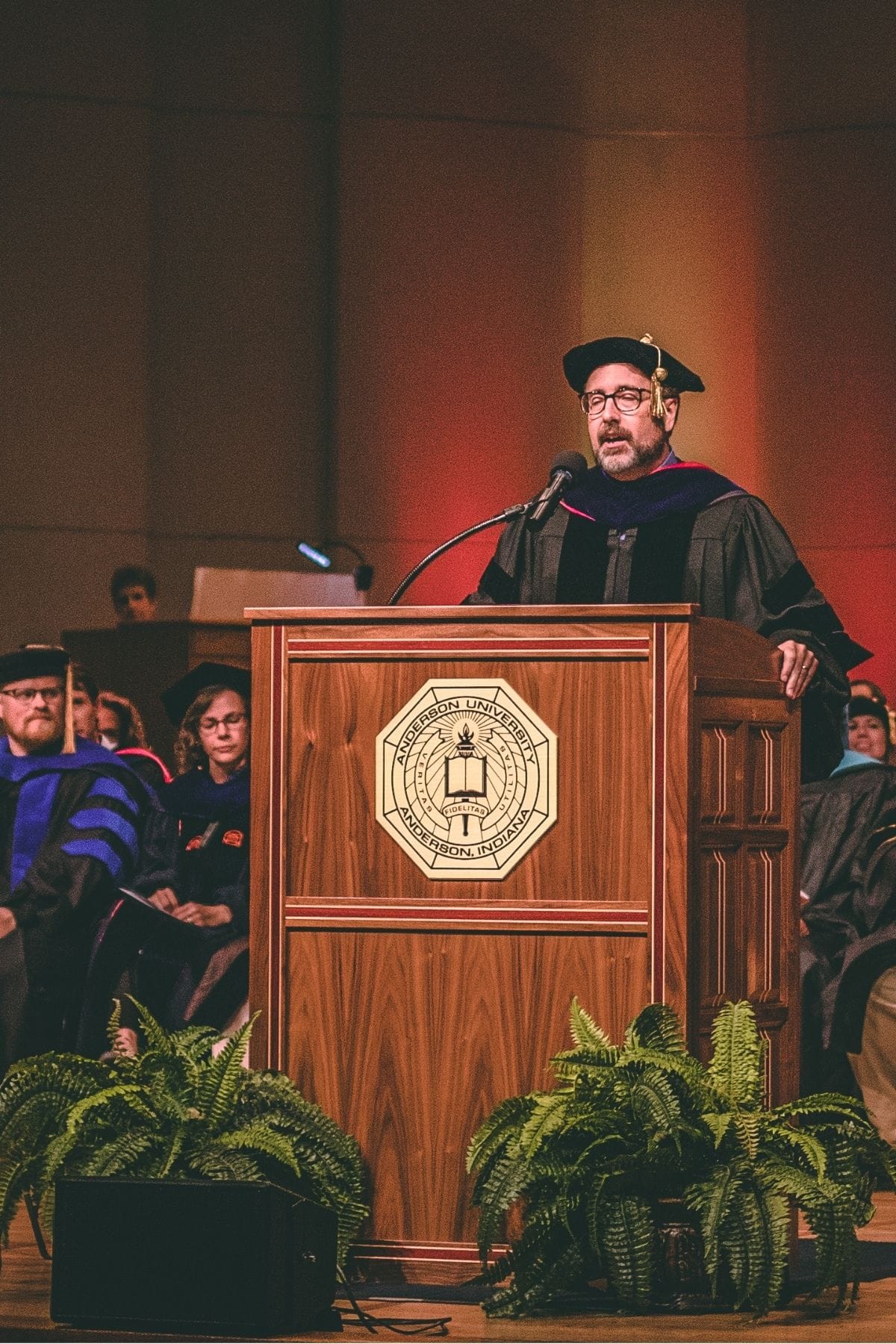
Expressing gratitude towards wonderful teachers is not just a formality, but a meaningful gesture that can leave a lasting impact.
A well written appreciation speech has the power to inspire, uplift, and acknowledge the incredible work that educators do every day and show them how much each teacher deserves tremendous love.
Teachers play a vital role in shaping the lives of their students, instilling knowledge, values, and a passion for learning.
Here we dive into the art of writing a teacher appreciation speech that goes beyond mere words to truly resonate with its audience.
We will explore the significance of honoring teachers, the heartfelt emotions involved, and the importance of expressing gratitude sincerely.
Whether you are a student, a parent, or a colleague looking to convey your appreciation, crafting a thoughtful speech can convey your deep respect and admiration for the dedication and hard work of teachers.
After all, teachers are what make school such a special place. School would be just a hollow building without all the deeds amazing teachers do everyday.
A speech is a great idea for teacher’s appreciation week .
Looking for more great teacher appreciation ideas ? We’ve got lots of great teacher appreciation printables and teacher appreciation craft ideas too!
Table of Contents
Understanding the Role of Teachers in Society
Crafting a heartfelt teacher appreciation speech, structuring an inspiring teacher appreciation speech, delivering the speech with confidence and sincerity, acknowledging the impact of teacher appreciation, teacher appreciation speech example.
Teachers hold a pivotal role in shaping the future of society through their impact on students’ lives. They go beyond imparting knowledge, influencing values, skills, and character development. Let’s delve into the multifaceted role of teachers in our society.
Here are some things to consider before writing your speech.
Impact of Teachers on Students’ Lives
Teachers are more than just educators; they are mentors, role models, and supporters. Their influence extends far beyond the classroom, shaping the beliefs, attitudes, and aspirations of their students.
Teachers instill a sense of curiosity, critical thinking, and a thirst for knowledge that can last a lifetime. They play a crucial role in nurturing the next generation of leaders, innovators, and change-makers.
The relationships teachers build with their students can have a profound impact on their personal and academic growth. Teachers not only teach academic subjects but also impart life lessons, instilling values like empathy, resilience, and perseverance.
They help students discover their strengths, overcome challenges, and realize their full potential. The guidance and encouragement provided by teachers can set students on a path to success and fulfillment.
Challenges Faced by Teachers
Despite their vital role, teachers encounter numerous challenges in their profession. From heavy workloads and limited resources to diverse student needs and societal pressures, teachers navigate a complex landscape every day.
The demands of modern education, including standardized testing, curriculum changes, and technology integration, add to the challenges teachers face.
Moreover, teachers often deal with issues beyond academics, such as student behavior problems, mental health concerns, and societal inequalities.
The emotional labor involved in supporting students’ social and emotional well-being can be draining. Despite these challenges, teachers remain dedicated to their students’ growth and well-being, often going above and beyond their job descriptions.
Appreciation for teachers is crucial not only to boost their morale but also to acknowledge the hard work, passion, and dedication they bring to their profession.
Recognizing the challenges teachers face and expressing gratitude for their contributions can inspire them to continue making a positive impact on students’ lives.
In a society where teachers play such a significant role in shaping the future generations, it is essential to value and appreciate their efforts, recognizing the impact they have on individuals, communities, and the world at large.
Sharing a heartfelt teacher appreciation speech is a meaningful way to express gratitude and admiration for the educators who impact our lives.
Reflecting on personal experiences with teachers and how they have influenced us can add a personal touch to the speech, making it more genuine and memorable.
Personal Reflections on Teacher’s Influence
Begin by reflecting on specific moments when the teacher made a difference in your life.
Recall instances where their guidance, support, or encouragement influenced your personal growth and academic journey.
Share anecdotes that highlight the positive impact the teacher had on you, allowing the audience to understand the depth of your appreciation.
Expressing Specific Appreciation
Expressing gratitude with specific examples can make your speech more impactful. Mention particular qualities or actions of the teacher that you admire and appreciate.
Whether it’s their dedication to helping students, their innovative teaching methods, or their unwavering support, sharing concrete examples can demonstrate the profound impact they have had on you and others.
Adding Personal Touches to the Speech
Adding personal touches to your teacher appreciation speech can make it more heartfelt and memorable. Consider using resources like teacher appreciation poems and teach appreciation quotes to add a creative and touching flair to your message.
These elements can beautifully complement your anecdotes, illustrating the profound bond between teachers and their students.
You can also incorporate personal experiences or lessons learned from the teacher that have shaped your growth and perspective. Personalizing the speech shows thoughtfulness and gratitude, making the teacher feel truly valued and appreciated.
Crafting a teacher appreciation speech that resonates with your audience requires careful structuring to ensure your message is impactful and memorable. Here’s how you can structure your speech to inspire and honor your teachers.
Setting the Tone
The introduction of your teacher appreciation speech sets the tone for the entire address. It serves as the hook that captures the audience’s attention and piques their interest. Consider starting with a personal anecdote, a thought-provoking quote, or a heartfelt thank you to immediately engage your listeners. A captivating introduction not only grabs attention but also sets the stage for the heartfelt appreciation you’re about to express.
Sharing Appreciation Stories
In the body of your speech, sharing personal anecdotes and appreciation stories can profoundly impact your audience. Reflect on specific moments when a teacher’s guidance or support made a difference in your life or the lives of others.
By weaving these stories into your speech, you humanize your message and illustrate the positive influence teachers have. Personal narratives create a connection with your audience and showcase the genuine appreciation you have for your teachers.
You can get ideas in our guide for writing teacher appreciation letter or examples for thank-you notes from parents , which can provide a personal touch and demonstrate the collective appreciation of the community.
Sharing specific instances where teachers have made a significant difference can make your speech more relatable and heartfelt.
Inspiring Closing Remarks
Concluding your teacher appreciation speech with impactful closing remarks leaves a lasting impression on your audience. Use this final opportunity to reinforce your gratitude, summarize key points, and leave the audience inspired.
Consider ending with a with an inspiring message, possibly echoing the sentiments found in thank-you messages from students , leaving a lasting impression of heartfelt appreciation.
Crafting an inspiring teacher appreciation speech involves structuring your message thoughtfully, from the attention-grabbing introduction to the heartfelt conclusion.
By setting the right tone, sharing personal stories, and ending with impactful closing remarks, you can create a speech that honors and celebrates the teachers who have made a difference.
Delivering a teacher appreciation speech with confidence and sincerity is a critical aspect of making a lasting impact on your audience. Here are some tips to help you practice, maintain eye contact, and deliver your speech with genuine emotion:
Tips on Practicing the Speech
- Practice Makes Perfect : Rehearse your speech multiple times to familiarize yourself with the content and flow.
- Record Yourself : Recording your practice sessions allows you to identify areas for improvement, such as pacing and tone.
- Seek Feedback : Ask friends or family to listen to your speech and provide constructive feedback for refinement.
- Visualize Success : Picture yourself delivering the speech confidently and envision a positive response from your audience.
Maintaining Eye Contact
- Connect with Your Audience : Maintain eye contact with different individuals in the room to establish a personal connection and convey sincerity.
- Engage with Emotion : Use eye contact to express genuine gratitude and appreciation for the teachers you are addressing.
- Practice In Front of a Mirror : Practice making eye contact with your reflection to build confidence in maintaining eye contact during the actual speech.
Delivering with Genuine Emotion
- Speak from the Heart : Infuse your speech with personal anecdotes and heartfelt sentiments to evoke genuine emotion.
- Express Gratitude : Verbally express your appreciation for the teachers’ dedication and impact on your life and education.
- Stay True to Your Emotions : Avoid sounding rehearsed by staying authentic and allowing your emotions to shine through in your delivery.
By following these tips, you can deliver your speech for teachers with the confidence and sincerity that will truly inspire and touch the hearts of your audience.
Expressing gratitude towards teachers not only brightens their day but also plays a significant role in shaping their teaching journey. Let’s delve into how gratitude impacts teachers and ways to continue appreciating them beyond a speech.
How Gratitude Impacts Teachers
Gratitude acts as a driving force for teachers, fueling their passion and dedication towards their students. When teachers feel appreciated, it boosts their morale, leading to increased job satisfaction and motivation to excel in their roles.
The simple act of acknowledging their hard work and commitment can have a profound impact on their overall well-being.
It reinforces a sense of value and recognition, creating a positive environment where teachers feel supported and encouraged to continue making a difference in the lives of their students.
Continuing the Appreciation Beyond the Speech
While a thank you speech is a wonderful gesture, it’s essential to continue showing gratitude consistently.
Simple actions such as writing a heartfelt note, volunteering to help with classroom tasks, or participating in school events can go a long way in recognizing and supporting teachers.
Building a culture of appreciation not only benefits individual teachers but also fosters a sense of community within the school.
By consistently showing appreciation and support, we can empower teachers to thrive and inspire future generations with their dedication and passion.
Here’s an example of a great teacher appreciation speech.
Ladies and gentlemen, esteemed colleagues, and most importantly, our honored teachers,
As we gather in this moment of gratitude, we find ourselves reflecting on the invaluable impact you’ve made on our lives. Your dedication extends far beyond the walls of any classroom, reaching deep into the hearts and minds of those you teach. Today, I wish to celebrate you with words that mirror our collective admiration, starting with a poem that echoes our sentiments:
“In the garden of life, teachers plant seeds of knowledge that grow forever. With gentle hands and a nurturing heart, they cultivate dreams, inspire curiosity, and awaken the soul to the endless possibilities that await.”
This poem, though simple, captures the essence of what you do every day. You are the gardeners of human potential, nurturing budding minds with the richness of education and the warmth of your dedication.
In the spirit of expressing our deepest thanks, let me share a quote that resonates profoundly with the essence of your contribution: “A teacher affects eternity; he can never tell where his influence stops.” Your impact is immeasurable, not confined by the here and now but extending into the infinite reach of future generations. Your words, your lessons, and your care forge the legacy of your influence, a legacy that transcends time and space.
Every day, you paint the world with the colors of wisdom and truth, guiding us with patience and understanding, and illuminating the path of learning with the light of your knowledge. Your commitment to education is not just a profession but a profound calling, a dedication to shaping the architects of tomorrow and the guardians of a brighter future.
Through your eyes, we have glimpsed the wonders of the world, and through your words, we have been inspired to pursue our dreams with courage and confidence. You have shown us that the quest for knowledge is not a race to be won but a journey to be savored, filled with endless curiosity and boundless possibilities.
As we stand here in admiration of your unwavering dedication, let us acknowledge that the true essence of teaching is not to fill minds with data but to ignite the spark of understanding and the flame of passion. You have mastered this art with grace, imparting lessons that endure far beyond the final bell.
In closing, let this moment be a testament to our heartfelt appreciation for the countless ways you enrich our lives. Your influence shapes not just the intellect but the very spirit of those you teach, igniting a fire of learning that burns brightly within us all.
Thank you, dear teachers, for every moment, every lesson, and every memory. Your legacy is not just in the minds you’ve enlightened but in the lives you’ve inspired. We are all better for having known you, and our gratitude is as boundless as the knowledge you share.
Thank you, from the bottom of our hearts.
Crafting a heartfelt teacher appreciation speech is not only a gesture of gratitude but also a powerful way to inspire and uplift those who dedicate their lives to education.
Emphasizing the importance of recognizing the hard work and dedication of teachers, we have explored how to structure a speech that resonates with sincerity and admiration.
Remember, simplicity and authenticity are key when expressing your gratitude. Let your words flow naturally, focusing on the impact your teacher has had on your life and the lives of others.
Take the time to reflect on the qualities that make your teacher special and be sure to convey your appreciation with genuine emotion.
By harnessing the power of gratitude in your speech, you have the opportunity to create a lasting impression that will inspire both your teacher and your audience.
So go ahead, write your own teacher appreciation speech and let your words be a beacon of gratitude and inspiration.
Similar Posts

Candy Jar for Teachers (Free Printable)

The Best Teacher Appreciation Ideas for Expressing Gratitude
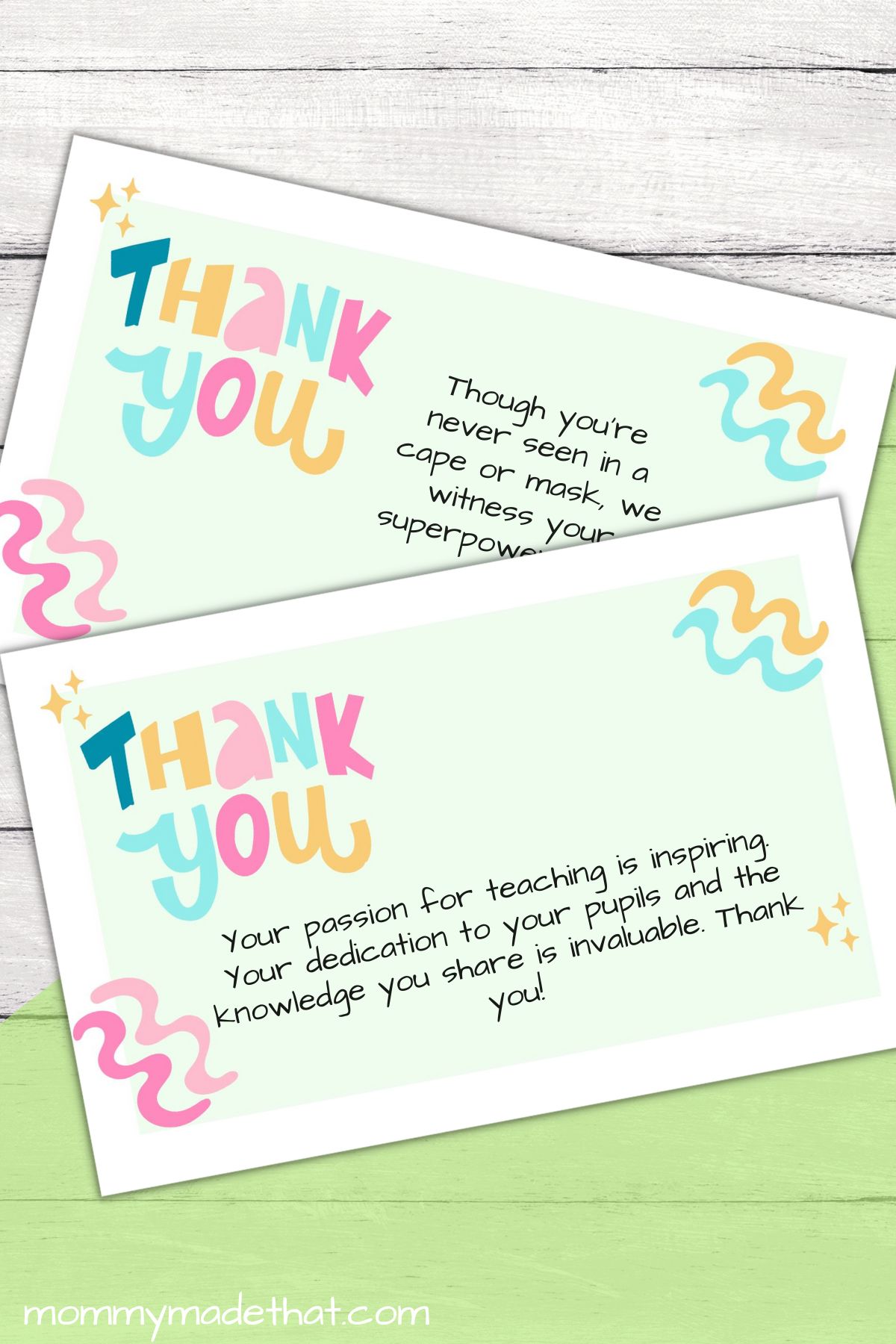
Thank You Message for Teachers from Students that’ll Tug their Heart Strings

The Best Teacher Appreciation Crafts that Make Awesome Gifts

The Best Teacher Appreciation Week Activities & Ideas

Free Teacher Appreciation Printables (Lots to Choose From!)
Leave a reply cancel reply.
Your email address will not be published. Required fields are marked *
- Guest Posts
200 Thank You Messages for Teacher to Appreciate For Their Dedication
Discover 200 heartfelt thank you messages for teachers, expressing gratitude and appreciation for their unwavering dedication and guidance.

Table of Contents
In the education journey, teachers serve as guiding lights, mentors, and inspirations to countless students. Their dedication, patience, and unwavering support shape minds and lives. As students, expressing gratitude towards these remarkable individuals becomes a gesture of politeness and a heartfelt acknowledgment of their profound impact on our growth and development.
In this blog post, we delve into the art of crafting sincere thank-you messages for teachers, exploring various occasions and methods through which students can express their appreciation.
Drawing from many sources and real-world examples, let’s uncover the essence of gratitude towards our educators.
20 Thank you message for teachers from students
Here are 20 thank you message for teachers from students:
- "Thank you for believing in me when I doubted myself."
- "Your passion for teaching is contagious; thank you for igniting our curiosity."
- "Your guidance has been the compass navigating me through challenges. Thank you."
- "With heartfelt appreciation for your tireless efforts in making learning enjoyable."
- "Thank you for being more than a teacher; you are a mentor and a friend."
- "Your dedication to our success inspires us to strive for greatness. Thank you."
- "In your classroom, I found not just knowledge but also the courage to dream."
- "Your words of encouragement echo in my mind; thank you for believing in me."
- "With deepest gratitude for your unwavering support and encouragement."
- "Thank you for seeing potential in me that I didn’t know existed."
- "Your lessons extend far beyond textbooks; thank you for teaching us life skills."
- "Your patience and understanding have made all the difference. Thank you."
- "I am grateful for your commitment to excellence and pushing me to do my best."
- "Thank you for being the light that guided me through moments of darkness."
- "Your impact on my life transcends the boundaries of the classroom. Thank you."
- "With heartfelt appreciation for your dedication to nurturing young minds."
- "Thank you for fostering an environment where learning is both enriching and fun."
- "Your passion for teaching has left an indelible mark on my heart. Thank you."
- "With sincere gratitude for your unwavering belief in our potential."
- "Thank you for being the catalyst that sparked my love for learning."
30 Short thank you messages for teachers
Here are 30 short thank you messages for teachers.
- "Grateful for your guidance."
- "Thank you for everything."
- "You’re simply the best!"
- "Forever indebted to you."
- "Thanks for being awesome."
- "Your impact is immeasurable."
- "You inspire greatness."
- "Thank you for caring."
- "Grateful beyond words."
- "You’re a true inspiration."
- "Forever grateful for your wisdom."
- "You make learning fun."
- "Thank you for believing in me."
- "You’re a gem of a teacher."
- "Your dedication shines through."
- "Gratitude from the heart."
- "You make a difference."
- "Thank you for your patience."
- "Inspired by your passion."
- "Your kindness means a lot."
- "Thank you for being you."
- "Your lessons resonate deeply."
- "Grateful for your encouragement."
- "You’re simply amazing."
- "Your guidance is priceless."
- "Thank you for your support."
- "In awe of your dedication."
- "You’re a true role model."
- "Your impact lasts a lifetime."
- "Thank you for being extraordinary."
30 Teachers Day messages for thank you
Here are 30 Teachers day messages for thank you:
- "On this Teachers’ Day, I extend my deepest gratitude for your invaluable guidance."
- "Wishing you a Teachers’ Day filled with the same joy and inspiration you bring to us every day."
- "Happy Teachers’ Day! Your dedication to teaching is a beacon of light in our lives."
- "Today, we celebrate the heroes without capes – our teachers. Thank you for everything."
- "To the world, you may be just a teacher, but to us, you are a hero. Happy Teachers’ Day!"
- "Wishing you a Happy Teachers’ Day filled with love, respect, and appreciation."
- "Your passion for teaching shines brighter than the sun. Happy Teachers’ Day!"
- "On this special day, we honor the mentors who shape our futures. Happy Teachers’ Day!"
- "Happy Teachers’ Day! Your dedication to excellence inspires us to reach for the stars."
- "Thank you for being the guiding light in our educational journey. Happy Teachers’ Day!"
- "Today, we celebrate the superheroes in our lives – our teachers. Happy Teachers’ Day!"
- "Your wisdom and guidance have sculpted our minds and hearts. Happy Teachers’ Day!"
- "Wishing you a Teachers’ Day filled with appreciation, love, and admiration."
- "Happy Teachers’ Day to the extraordinary individuals who make learning an adventure."
- "Your passion for teaching is contagious; thank you for inspiring us every day. Happy Teachers’ Day!"
- "To the world, you may just be a teacher, but to your students, you are a guiding star. Happy Teachers’ Day!"
- "Thank you for your unwavering dedication to shaping the minds of tomorrow. Happy Teachers’ Day!"
- "Your commitment to education is an inspiration to us all. Happy Teachers’ Day!"
- "Happy Teachers’ Day! Your impact goes beyond the classroom; it shapes our future."
- "Wishing you a Teachers’ Day filled with love, appreciation, and heartfelt gratitude."
- "Thank you for being the guiding force in our educational journey. Happy Teachers’ Day!"
- "On this special day, we celebrate the remarkable individuals who mold our futures. Happy Teachers’ Day!"
- "Happy Teachers’ Day! Your dedication to excellence is truly commendable."
- "Thank you for your tireless efforts in shaping the leaders of tomorrow. Happy Teachers’ Day!"
- "Happy Teachers’ Day! Your impact reaches far beyond the walls of the classroom."
- "Your passion for teaching is a gift to us all. Happy Teachers’ Day!"
- "On this Teachers’ Day, we express our deepest gratitude for your unwavering dedication."
30 Thank you message for teacher after results
Here 30 thank you messages for teacher after the result:
- Your guidance has been instrumental in our success. Thank you.
- Celebrating our achievements, thanks to your unwavering support.
- Our success is a testament to your dedication. Thank you for everything.
- Your belief in us has fueled our accomplishments. Thank you, teacher.
- With heartfelt gratitude for your role in our achievements. Thank you.
- Our success story is incomplete without acknowledging your contribution. Thank you for everything.
- Thank you for guiding us towards excellence and celebrating our victories.
- Your teachings have paved the way for our success. Thank you for everything.
- Grateful for your encouragement and guidance through thick and thin. Thank you.
- Our achievements are a reflection of your dedication. Thank you for everything.
- Thank you for believing in us and celebrating our triumphs.
- Our success is a testament to your unwavering support. Thank you, teacher.
- With deepest appreciation for your role in our journey towards success. Thank you.
- Your faith in us has been the driving force behind our accomplishments. Thank you.
- Celebrating our achievements with heartfelt gratitude towards you. Thank you for everything.
- Thank you for your guidance, which has played a pivotal role in our success.
- Your wisdom and encouragement have been the cornerstone of our achievements. Thank you.
- With sincere appreciation for your guidance and support. Thank you, teacher.
- Our accomplishments are a reflection of your dedication and mentorship. Thank you.
- Thank you for your unwavering support and belief in our potential.
- Celebrating our victories with gratitude towards you. Thank you for everything.
- Your guidance has been the key to our success. Thank you for everything.
- With heartfelt gratitude for your role in shaping our success. Thank you.
- Thank you for being our guiding light and celebrating our achievements.
- Our journey towards success wouldn’t be the same without you. Thank you, teacher.
- With deepest appreciation for your unwavering belief in our abilities. Thank you.
- Thank you for your constant encouragement and support. It means the world to us.
- Celebrating our accomplishments with heartfelt gratitude towards you. Thank you.
- Your guidance has been invaluable to our success. Thank you for everything.
- Thank you for being the wind beneath our wings. Our success is yours too.
20 Thank you message for teacher appreciation
Here are 20 thank you messages for teacher appreciation:
- Thank you for being more than just a teacher—you're a mentor, guide, and inspiration.
- Your dedication to teaching and unwavering support have made a lasting impact on my life. Thank you.
- Your passion for education and commitment to your students shine through in everything you do. Thank you for being an exceptional teacher.
- Thank you for nurturing my curiosity, challenging me to think critically, and inspiring me to reach my fullest potential.
- Your kindness, patience, and encouragement have made all the difference. Thank you for being an incredible teacher.
- Thank you for believing in me, pushing me to excel, and instilling in me a love for learning that will last a lifetime.
- Your enthusiasm for teaching is contagious, and your dedication to your students is truly admirable. Thank you for all that you do.
- Thank you for creating a supportive and engaging learning environment where every student feels valued and respected.
- Your passion for teaching and genuine care for your students make you a truly extraordinary educator. Thank you for your tireless efforts.
- Thank you for inspiring a love for learning, challenging me to grow, and believing in my potential every step of the way.
- Your guidance, wisdom, and encouragement have shaped me into the person I am today. Thank you for being an exceptional teacher.
- Thank you for your unwavering dedication to your students' success and for making learning both meaningful and enjoyable.
- Your positive impact extends far beyond the classroom. Thank you for being a role model, mentor, and friend.
- Thank you for your endless patience, creative teaching methods, and unwavering support. You are a true gift to your students.
- Your passion for teaching and genuine care for your students are evident in everything you do. Thank you for your extraordinary commitment.
- Thank you for inspiring a love for learning, challenging me to think critically, and empowering me to achieve my goals.
- Your guidance and mentorship have made a profound difference in my life. Thank you for being an outstanding teacher.
- Thank you for investing your time, energy, and heart into shaping the minds of your students. You are appreciated more than words can express.
- Your dedication to your students' growth and success is truly remarkable. Thank you for your unwavering commitment to excellence.
- Thank you for being more than just a teacher—you're a beacon of knowledge, a source of inspiration, and a true hero in the classroom.
30 Thank you teacher cards messages
Here are 30 thank you teacher cards messages:
- "You’ve made a difference in my life; thank you for being an amazing teacher."
- "With heartfelt gratitude for your dedication to nurturing young minds. Thank you."
- "Your passion for teaching has inspired us beyond measure. Thank you for everything."
- "Grateful for your guidance and support; you are truly appreciated."
- "Thank you for being a source of inspiration and wisdom."
- "Your kindness and patience have made all the difference. Thank you, teacher."
- "Wishing you endless joy and fulfillment for all you do. Thank you for being extraordinary."
- "Your impact on our lives is immeasurable. Thank you for everything."
- "With sincere appreciation for your unwavering commitment to excellence. Thank you."
- "You’ve touched our hearts and minds in ways you may never know. Thank you."
- "Grateful for your dedication to shaping the minds of tomorrow. Thank you, teacher."
- "Thank you for believing in us and pushing us towards greatness."
- "Your lessons extend far beyond the classroom; they shape our futures. Thank you."
- "Your encouragement has been the fuel for our success. Thank you for everything."
- "With deepest gratitude for your unwavering support and guidance. Thank you."
- "Your impact goes beyond words; it’s felt in every lesson, every day. Thank you."
- "Thank you for making learning an adventure we look forward to every day."
- "Your dedication to our growth and development is truly admirable. Thank you."
- "You’ve been more than a teacher; you’ve been a mentor and a friend. Thank you."
- "Thank you for inspiring us to reach for the stars and never give up."
- "With heartfelt appreciation for your tireless efforts in making a difference. Thank you."
- "Your wisdom and guidance have sculpted our minds and hearts. Thank you, teacher."
- "Thank you for being a shining example of dedication and excellence."
- "Grateful for your unwavering commitment to our success. Thank you, teacher."
- "Your passion for teaching is contagious; thank you for inspiring us every day."
- "Thank you for believing in us and guiding us towards our full potential."
- "With sincere gratitude for your patience, understanding, and wisdom. Thank you."
- "Your impact on our lives will be cherished forever. Thank you for everything."
- "Thank you for the countless ways you’ve enriched our lives. You are truly appreciated."
- "Wishing you joy, fulfillment, and endless blessings for all you do. Thank you, teacher."
30 Thank you message to students from teacher on Teachers Day
30 thank you message to students from teacher on teachers day:
- "On this Teachers’ Day, I extend my deepest gratitude to all my wonderful students."
- "Wishing my amazing students a Happy Teachers’ Day! You inspire me every day."
- "Thank you, dear students, for making every day in the classroom a joyous journey."
- "Happy Teachers’ Day to the brilliant minds who brighten up my days with their enthusiasm."
- "To my incredible students, thank you for making teaching the most rewarding experience."
- "Wishing all my students a Happy Teachers’ Day! You are the reason I love what I do."
- "Thank you for your hard work, dedication, and endless curiosity. Happy Teachers’ Day!"
- "On this special day, I want to express my gratitude to my students for their kindness and respect."
- "Happy Teachers’ Day to my wonderful students! You make teaching an absolute delight."
- "Thank you for your creativity, passion, and willingness to learn. Happy Teachers’ Day!"
- "Wishing all my students a Happy Teachers’ Day filled with love, appreciation, and laughter."
- "To my amazing students, thank you for making every moment in the classroom memorable."
- "Happy Teachers’ Day! Your eagerness to learn and grow inspires me every single day."
- "Thank you for your hard work, perseverance, and positive attitude. Happy Teachers’ Day!"
- "Wishing my fantastic students a Happy Teachers’ Day! You are the heart of our classroom."
- "Thank you for your kindness, respect, and commitment to excellence. Happy Teachers’ Day!"
- "Happy Teachers’ Day to my exceptional students! Your enthusiasm fuels my passion for teaching."
- "To my dedicated students, thank you for making every day in the classroom a rewarding experience."
- "Wishing all my students a Happy Teachers’ Day filled with joy, laughter, and appreciation."
- "Thank you for your curiosity, intelligence, and boundless potential. Happy Teachers’ Day!"
- "Happy Teachers’ Day! Your determination and resilience inspire me beyond words."
- "To my remarkable students, thank you for making teaching the most fulfilling journey."
- "Thank you for your enthusiasm, energy, and love for learning. Happy Teachers’ Day!"
- "Wishing all my students a Happy Teachers’ Day! You make every day brighter."
- "Happy Teachers’ Day to my extraordinary students! Your brilliance lights up our classroom."
- "Thank you for your kindness, generosity, and unwavering support. Happy Teachers’ Day!"
- "To my incredible students, thank you for making every day in the classroom a joyous celebration."
- "Happy Teachers’ Day! Your passion for learning and growth inspires me every single day."
- "Thank you for your hard work, dedication, and positive attitude. Happy Teachers’ Day!"
- "Wishing all my students a Happy Teachers’ Day filled with appreciation, love, and gratitude."
30 Thank you messages for teacher appreciation
Here are 30 thank you messages for teacher appreciation.
- "Your dedication to teaching is truly inspiring. Thank you for all that you do!"
- "Thank you for your patience, kindness, and unwavering support. You are appreciated."
- "With heartfelt gratitude for your commitment to excellence. Thank you, teacher."
- "Your passion for teaching has left a lasting impact on all of us. Thank you."
- "Your guidance and encouragement have made all the difference. Thank you for everything."
- "Wishing you endless joy and fulfillment for all your hard work. Thank you, teacher."
- "Thank you for believing in us and inspiring us to reach for the stars."
- "With sincere appreciation for your dedication to nurturing young minds. Thank you."
- "Your wisdom and guidance have shaped us into who we are today. Thank you, teacher."
- "Thank you for your unwavering support and belief in our potential."
- "Your lessons extend far beyond the classroom; they touch our hearts. Thank you."
- "Grateful for your kindness, patience, and understanding. Thank you, teacher."
- "Thank you for challenging us to be the best versions of ourselves. You are amazing!"
- "Your impact on our lives is immeasurable. Thank you for everything, teacher."
- "With heartfelt gratitude for your tireless efforts in making a difference. Thank you."
- "Thank you for being a source of inspiration and wisdom. You are truly appreciated."
- "Your dedication to our growth and success does not go unnoticed. Thank you."
- "Grateful for your encouragement and support throughout our educational journey. Thank you."
- "Thank you for being the guiding light in our educational journey. You are extraordinary!"
- "Your passion for teaching has ignited a flame within us. Thank you for everything."
- "With deepest appreciation for your unwavering commitment to excellence. Thank you."
- "Thank you for your unwavering dedication to shaping the minds of tomorrow."
- "Grateful for your kindness, generosity, and unwavering support. Thank you, teacher."
- "Thank you for being a remarkable teacher and an even better mentor."
- "With sincere appreciation for your wisdom, guidance, and friendship. Thank you."
- "Your lessons have not only enriched our minds but also touched our hearts. Thank you."
- "Thank you for making a difference in our lives and in the world. You are truly remarkable."
- "With heartfelt gratitude for your unwavering belief in our abilities. Thank you, teacher."
5 short thank you messages for teacher from student (email)
Here are five short thank you messages for teacher from student, suitable for an email:
How to write an effective thank you message for a teacher
Writing an effective thank you message for your teacher is not just a gesture of courtesy; it's a heartfelt expression of gratitude acknowledging their impact on your life and education. Here are some tips to help you craft a meaningful message:
1. Be genuine and sincere
Start your message with genuine appreciation. Your teacher will appreciate sincerity more than anything else. Be specific about what you're thanking them for and how it has made a difference in your life.
2. Personalize your message
Tailor your thank you message to reflect your personal experiences with the teacher. Include specific instances where their guidance, support, or teaching methods have had a positive impact on you.
3. Express specific appreciation
Identify specific qualities or actions of your teacher that you appreciate. Whether it's their patience, encouragement, passion for teaching, or willingness to go the extra mile, let them know what you value most about their teaching style.
4. Keep it concise
While you want your message to be heartfelt, keeping it concise and to the point is also essential. Avoid rambling or going off-topic. A brief and focused message will have a greater impact and be easier for your teacher to read and appreciate.
5. Use their name
Address your teacher directly by name in your message. Personalizing your message adds a personal touch and shows that you value your relationship with them.
6. Reflect on the impact
Take a moment to reflect on your teacher's impact on your academic journey and personal development. Acknowledge how they have helped you grow, learn, and succeed.
7. End on a positive note
Conclude your message with a positive sentiment or well wishes for your teacher. Let them know that you are grateful for their contributions to your life and that you value the relationship you share with them.
1. How can I show appreciation to my teacher besides a thank you message?
Aside from a thank you message, you can show appreciation to your teacher by:
- Offering a handwritten note or card.
- Presenting a small token of appreciation, such as flowers or a gift card.
- Participating actively in class and showing enthusiasm for learning.
- Volunteering to help with classroom tasks or activities.
- Attending parent-teacher conferences to demonstrate your commitment to your education.
2. Is it appropriate to thank a teacher after receiving exam results?
Yes, it’s entirely appropriate to thank your teacher after receiving exam results. Acknowledge their efforts and guidance, especially if their teaching contributed to your success. A simple thank you note or conversation can go a long way in expressing your gratitude.
3. How can I express gratitude to a teacher who has been particularly supportive during challenging times?
Expressing gratitude to a teacher who has been supportive during challenging times is crucial. Consider expressing your gratitude through:
- A heartfelt thank you message or letter.
- Offering words of appreciation in person or during class.
- Sharing specific examples of how their support made a difference to you.
- Expressing your willingness to offer support or assistance if needed.
4. What should I include in a thank you message to a teacher who has inspired me?
In a thank you message to a teacher who has inspired you, consider including:
- Specific examples of how their teaching or mentorship impacted you.
- Expressions of gratitude for their dedication and passion.
- Acknowledgment of the positive influence they've had on your personal and academic growth.
- Well-wishes for their continued success and fulfillment in teaching.
In education, gratitude is a powerful force that bridges the gap between teachers and students. Through heartfelt thank you messages, students can express their appreciation for their teachers' tireless efforts, unwavering support, and profound influence. As we celebrate the invaluable role of educators in shaping minds and futures, let us never underestimate the impact of a simple yet sincere expression of gratitude.
When crafting thank-you messages for teachers, remember that words have the power to uplift, inspire, and forge lasting connections. Whether through heartfelt notes, thoughtful gestures, or genuine conversations, let us seize every opportunity to express our gratitude to the teachers who enrich our lives and inspire us to reach for the stars.
50 Thank You Messages for Designers to Share Appreciation with Them
100+ thank you messages for colleagues when leaving a company to express gratitude, unlock the biggest secret of engagement to retain your top performers., -->guest contributor -->.
We often come across some fantastic writers who prefer to publish their writings on our blogs but prefer to stay anonymous. We dedicate this section to all superheroes who go the extra mile for us.
Let's begin this new year with an engaged workforce!
Empuls is the employee engagement platform for small and mid-sized businesses to help engage employees and improve company culture.
Quick Links
employee engagement survey software | employee engagement software | employee experience platform | employee recognition software
hr retention software | employee feedback software | employee benefits software | employee survey software | employee rewards platform | internal communication software | employee communication software | reward system for employees | employee retention software | digital employee experience platform | employee health software | employee perks platform | employee rewards and recognition platform | social intranet software | workforce communications platform | company culture software | employee collaboration software | employee appreciation software | social recognition platform | virtual employee engagement platform | peer recognition software | retail employee engagement | employee communication and engagement platform | gamification software for employee engagement | corporate communication software | digital tools for employee engagement | employee satisfaction survey software | all in one communication platform | employee benefits communication software | employee discount platform | employee engagement assessment tool | employee engagement software for aged care | employee engagement software for event management | employee engagement software for healthcare | employee engagement software for small business | employee engagement software uk | employee incentive platform | employee recognition software for global companies | global employee rewards software | internal communication software for business | online employee recognition platform | remote employee engagement software | workforce engagement software | voluntary benefits software | employee engagement software for hospitality | employee engagement software for logistics | employee engagement software for manufacturing | employee feedback survey software | employee internal communication platform | employee learning engagement platform | employee awards platform | employee communication software for hospitality | employee communication software for leisure | employee communication software for retail | employee engagement pulse survey software | employee experience software for aged care | employee experience software for child care | employee experience software for healthcare | employee experience software for logistics | employee experience software for manufacturing | employee experience software for mining | employee experience software for retail | employee experience software for transportation | restaurant employee communication software | employee payout platform | culture analytics platform
Benefits of employee rewards | Freelancer rewards | Me time | Experience rewards
Employee experience platform | Rules of employee engagement | Pillars of employee experience | Why is employee experience important | Employee communication | Pillars of effective communication in the work place | Build strong employee loyalty
Building Culture Garden | Redefining the Intranet for Your Organization | Employee Perks and Discounts Guide
Employee Benefits | Getting Employee Recognition Right | Integrates with Slack | Interpreting Empuls Engagement Survey Dashboard | Building Culture of Feedback | Remote Working Guide 2021 | Engagement Survey Guide for Work Environment Hygiene Factors | Integrates with Microsoft Teams | Engagement Survey Guide for Organizational Relationships and Culture | Ultimate Guide to Employee Engagement | The Employee Experience Revolution | Xoxoday Empuls: The Employee Engagement Solution for Global Teams | Employee Experience Revolution | Elastic Digital Workplace | Engagement Survey Guide for Employee Recognition and Career Growth | Engagement Survey Guide for Organizational Strategic Connect | The Only Remote Working Guide You'll Need in 2021 | Employee Experience Guide | Effective Communication | Working in the Times of COVID-19 | Implementing Reward Recognition Program | Recognition-Rich Culture | Remote Working Guide | Ultimate Guide to Workplace Surveys | HR Digital Transformation | Guide to Managing Team | Connect with Employees
Total Rewards | Employee Background Verification | Quit Quitting | Job Description | Employee of the Month Award
Extrinsic Rewards | 360-Degree Feedback | Employee Self-Service | Cost to Company (CTC) | Peer-to-Peer Recognition | Tangible Rewards | Team Building | Floating Holiday | Employee Surveys | Employee Wellbeing | Employee Lifecycle | Social Security Wages | Employee Grievance | Salaried Employee | Performance Improvement Plan | Baby Boomers | Human Resources | Work-Life Balance | Compensation and Benefits | Employee Satisfaction | Service Awards | Gross-Up | Workplace Communication | Hiring Freeze | Employee Recognition | Positive Work Environment | Performance Management | Organizational Culture | Employee Turnover | Employee Feedback | Loud Quitting | Employee Onboarding | Informal Communication | Intrinsic Rewards | Talent Acquisition | Employer Branding | Employee Orientation | Social Intranet | Disgruntled Employee | Seasonal Employment | Employee Discounts | Employee Burnout | Employee Empowerment | Paid Holiday | Employee Retention | Employee Branding | Payroll | Employee Appraisal | Exit Interview | Millennials | Staff Appraisal | Retro-Pay | Organizational Development | Restricted Holidays | Talent Management Process | Hourly Employee | Monetary Rewards | Employee Training Program | Employee Termination | Employee Strength | Milestone Awards | Induction | Performance Review | Contingent Worker | Layoffs | Job Enlargement | Employee Referral Rewards | Compensatory Off | Performance Evaluation | Employee Assistance Programs | Garden Leave | Resignation Letter | Human Resource Law | Resignation Acceptance Letter | Spot Awards | Generation X | SMART Goals | Employee Perks | Generation Y | Generation Z | Employee Training Development | Non-Monetary Rewards | Biweekly Pay | Employee Appreciation | Variable Compensation | Minimum Wage | Remuneration | Performance-Based Rewards | Hourly to Yearly | Employee Rewards | Paid Time Off | Recruitment | Relieving Letter | People Analytics | Employee Experience | Employee Retention | Employee Satisfaction | Employee Turnover | Intrinsic Rewards | People Analytics | Employee Feedback | Employee of the Month Award | Extrinsic Rewards | Employee Surveys | Employee Experience | Total Rewards | Performance-Based Rewards | Employee Referral Rewards | Employee Lifecycle | Social Intranet | Tangible Rewards | Service Awards | Milestone Awards | Peer-to-Peer Recognition | Employee Turnover

50 Inspiring Examples of Thank-You Messages for Teachers & Mentors
By Status.net Editorial Team on November 23, 2023 — 14 minutes to read
Crafting a heartfelt thank you message for a teacher or mentor can make all the difference in acknowledging their hard work and the impact they’ve had on your life. Here are some tips to help you create a meaningful note that truly expresses your gratitude.
First, take a moment to think about the specific things that the teacher or mentor has done for you. This could include lessons they’ve taught, new skills they’ve introduced, or the time and effort they’ve dedicated to your success. Use these thoughts to draft a personalized message that highlights these unique aspects. For example:
Dear Mrs. Brown,
Thank you for your continuous support and guidance throughout the school year. Your patience and dedication in teaching me algebra have made a significant difference in my understanding and confidence. I am truly grateful.
Make sure to provide context in your message. Explain how their support has helped you both academically and personally. Providing concrete examples can strengthen your thank you message and make it more memorable. Here’s an example:
Dear Mr. Johnson,
I wanted to express my gratitude for all the invaluable advice and encouragement you’ve given me during our mentorship. Your insights on pursuing a career in engineering have clarified my path forward, and the time you spent reviewing my college applications boosted my chances immeasurably. Thank you for being such a dedicated and inspiring mentor.
A touch of emotion can go a long way in conveying your appreciation. Don’t be afraid to show your feelings and express how their help and guidance have positively influenced your life. Example:
Dear Miss Lee,
You’re not just a wonderful teacher; you’re also a caring and supportive friend. Your wisdom and kindness have helped me through some tough times, and I’m so grateful to have had you in my corner. Thank you for everything you’ve done for me.
A well-written, heartfelt note will mean a great deal to your teacher or mentor. It is an excellent way to demonstrate your appreciation and respect, while also reminding them of the powerful impact they have on their students’ lives.
Simple Thank-You Messages for Teachers
- Thank you for your guidance and support.
- I truly appreciate all that you’ve done for me.
- I am so grateful to have you as my teacher/mentor.
You can also personalize your message by mentioning something specific that your teacher or mentor has done for you. This can make your message more meaningful, and it shows that you have taken the time to reflect on their impact in your life. Here are some sample phrases that you could use:
- Thank you for always encouraging me to try my best.
- I will never forget the late nights you spent helping me with my projects.
- Your patience and understanding made all the difference for me.
Don’t forget to include some words of encouragement or appreciation for the teacher or mentor themselves. They often put in long hours and dedicate their lives to helping others, so it’s nice to let them know that their efforts are not going unnoticed. Some examples include:
- You’re an amazing teacher, and I feel lucky to have learned from you.
- Your passion for your subject is truly inspiring.
- It’s clear that you care deeply about your students, and I want you to know how much I admire that.
If you are comfortable doing so, you could briefly touch on the positive impact your teacher or mentor has had on your life or personal growth. This can be a powerful way to wrap up your thank you message and leave a lasting impression. Here are a few examples to inspire you:
- Your guidance has changed the way I approach challenges, and I am forever grateful.
- You’ve helped me grow into a more confident and capable person.
- I wouldn’t be where I am today without your support and encouragement.
Examples of Thank-You Messages for Teachers
Here’s a list of example thank-you messages that you can use as inspiration to craft your own unique message. Feel free to use these as-is, or adapt and personalize them to suit your own style and relationship with your teacher.
- Thank you for always believing in me and pushing me to reach my full potential. Your guidance and support have made a world of difference in my life.
- I am so grateful for your patience and dedication in helping me grow, both academically and personally. You’ve truly made a lasting impact on my life.
- Your passion for teaching and your ability to make complex subjects easy to understand have inspired me to pursue my own dreams. Thank you for being such a great mentor and role model.
- Thank you for being a constant source of support, encouragement, and inspiration. You’ve shown me the true meaning of perseverance and hard work.
- Your kindness, understanding, and sense of humor always brighten up the classroom. Thank you for making learning so enjoyable and engaging.
- You’ve made such a positive impact on my life, and I can’t thank you enough for all the time, effort, and care you put into helping me succeed.
- Your unwavering commitment to your students’ success is truly admirable. Thank you for being the best teacher I could ever ask for.
- Your dedication to teaching and your ability to connect with your students make you an incredible teacher. I’m so grateful for the time and effort you invest in my education.
- Thank you for being such a caring and compassionate teacher. You’ve made all the difference in helping me overcome challenges and grow as a person.
- Your encouragement and support have helped me to believe in myself and achieve my goals. I couldn’t have done it without you.
Showing Gratitude Towards Mentors
- Thank you for being a guiding light in my life. Your support and encouragement have helped me grow personally and professionally.
- I am grateful for the time and effort you’ve invested in mentoring me. Your advice has been invaluable, and I genuinely appreciate your help.
- You have made a significant difference in my life, and I can’t thank you enough for your guidance and wisdom.
- Your unwavering support and belief in me have given me the confidence to pursue my dreams. Thank you for being an incredible mentor.
- Thanks for being an amazing teacher and mentor. Your patience and dedication have truly inspired me to strive for greatness.
Don’t hesitate to get personal by mentioning specific experiences or instances where your mentor’s advice made a difference:
- I’ll never forget the time you stayed late to help me perfect my presentation skills. Your pointers have significantly improved my ability to communicate effectively, and I am genuinely grateful.
- Your advice on time management has made all the difference during my busy semesters. Thanks to you, I’ve learned how to prioritize tasks and maintain focus on my goals.
- The techniques you taught me for dealing with conflict and difficult situations have been invaluable both in my professional and personal life. Thank you for sharing your wisdom.
Or, you can express your gratitude by highlighting your mentor’s qualities that you admire the most:
- Your ability to listen and provide constructive feedback has taught me the importance of effective communication. Thank you for being an excellent mentor and role model.
- Your passion for teaching and dedication to your students is truly inspiring. You have helped me see the value in lifelong learning, and I am grateful for your guidance.
- Your incredible patience and understanding have allowed me to grow, even when I was struggling. Thank you for your unwavering support and encouragement.
Thoughtful Messages for Mentors
- Thank you for always believing in me and pushing me to reach my full potential. Your unwavering support has made a significant difference in my life.
- Your guidance and wisdom have not only helped me grow professionally, but also personally. I am so grateful to have you as my mentor. Thank you for everything you do.
- I truly appreciate the time and effort you put into helping me become the best version of myself. You are an amazing mentor, and I am so grateful for your support and encouragement.
Sometimes, a heartfelt message can brighten your mentor’s day and let them know that their efforts have not gone unnoticed:
- I couldn’t have achieved my goals without your guidance, support, and encouragement. Thank you for being an incredible mentor!
- Your dedication to helping me succeed has made all the difference in my journey to success. Thank you for being a fantastic mentor and for always having my back.
- Thank you for your patience, understanding, and constant support. Your mentorship has been invaluable, and I am so grateful for everything you have done for me.
You can also share a message that highlights specific ways your mentor has helped you grow. You can mention specific instances where their advice or support made a significant impact:
- Thank you for helping me navigate through difficult challenges at work. Your guidance has been a tremendous help, and I appreciate your invaluable insights.
- Your encouragement to step out of my comfort zone has led me to incredible opportunities and growth. Thanks for being an incredible mentor and believing in me.
- Thank you for always being there to offer advice, constructive feedback, and encouragement. You’ve truly made a difference in my career and personal development.
Feel free to make your message as personalized as possible, incorporating memorable experiences and anecdotes:
- The lessons I’ve learned from you, not only about work but also about life, have made me a better person. Thank you for being an extraordinary mentor and shaping my life.
- I will never forget the time you stayed late to help me prepare for my big presentation. Your dedication as a mentor is truly appreciated—thank you for everything.
- I still remember the first day we met, and you told me I had the potential to do great things. Thanks to your mentorship, I believe in myself and my abilities more than ever before.
Personalized Thank-You Messages for Teachers
A personalized thank you message can make all the difference in showing your appreciation. Here are some examples to help you craft the perfect message for your teacher or mentor.
- Consider what personal stories or moments you have shared with your teacher or mentor. You can mention a specific time when their guidance or support made a significant impact on your life. Example : “Dear Mr. Smith, remember the time when I was struggling with my math assignments, and you stayed after class to help me grasp the concepts? Your patience and dedication not only helped me excel in math but also taught me the value of perseverance. Thank you so much!”
- Highlight your teacher’s unique qualities or teaching style that resonates with you. It could be their passion for the subject, their creativity, or their ability to inspire students. Example : “Mr. Brown, your passion for history and engaging teaching style made those lessons fun and brought the past to life. Your lively discussions and interesting anecdotes during class sparked my interest in history like never before. Thank you!”
- You can mention the lasting impact and lessons they have imparted on you that will undoubtedly influence your future endeavors. Example : “Mrs. Garcia, your unwavering support and encouragement throughout our journey in the robotics club has been invaluable. The confidence and teamwork skills you have instilled in me will undoubtedly benefit me in all aspects of life. Thank you for everything!”
Customizable Templates for Messages
Looking for the perfect way to express your gratitude to a teacher or mentor? Check out these customizable templates to help you craft the perfect thank you message. Feel free to personalize each message to make it unique and heartfelt.
Template 1: Expressing Gratitude for Support and Guidance Dear [Teacher/Mentor’s Name],
I wanted to take a moment to thank you for all the support and guidance you have given me throughout [specific time or event]. Your dedication and passion for teaching have made a significant impact on my life. You helped me overcome challenges and achieve my goals.
Your patience, understanding, and encouragement have been invaluable to me, and I will always cherish the lessons I’ve learned from you. Thank you, [Teacher/Mentor’s Name], for believing in me and inspiring me to continue learning and growing.
Sincerely, [Your Name]
Template 2: Commending on a Specific Lesson or Achievement Dear [Teacher/Mentor’s Name],
I wanted to express my gratitude for the extraordinary lesson you taught about [specific topic or skill]. Your unique approach and engaging teaching style made it easy to understand and retain the information. This lesson has proven to be invaluable and has greatly contributed to my success in [specific achievement or task].
Your expertise and dedication to helping your students not only learn but also grow as individuals truly sets you apart. Thank you for making such a difference in my life.
Warm regards, [Your Name]
Template 3: Appreciating the Caring and Encouraging Nature Dear [Teacher/Mentor’s Name],
Thank you for always being such a caring and supportive figure in my life. Your endless encouragement and belief in my abilities have given me the confidence to tackle even the most challenging tasks.
I feel incredibly fortunate to have had you as my teacher/mentor throughout [specific time or event]. Your guidance has positively impacted my academic journey, and I will always be grateful for the difference you have made.
With heartfelt thanks, [Your Name]
Best Practices
- Personalize your message: Share specific examples of how your teacher or mentor has positively impacted your life. This demonstrates that you truly value their efforts and time.
- Choose the right medium: Consider the preferences of your teachers and mentors when deciding how to deliver your message – a handwritten note, email, or even a small gift might be appropriate.
- Timing is important: While there’s no wrong time to express gratitude, consider sending your message after a significant event or milestone. This could be at the end of a school year, after receiving help with a difficult project, or when you achieve a personal goal.
- Keep cultural sensitivities in mind: Be aware of any cultural differences or preferences that may influence how your message will be received. This is especially important if your teacher or mentor is from a different cultural background than you.
- Proofread your message: Before sending your message, give it a thorough read-through to check for any errors or inaccuracies. This demonstrates that you have taken the time to carefully craft your expression of gratitude.
Frequently Asked Questions
What are some short and sweet thank you messages for teachers.
- “Thank you for inspiring me every day!”
- “Your patience and dedication have made all the difference.”
- “So grateful for your guidance and support.”
- “You’ve given me the gift of knowledge – thank you!”
How can I express appreciation to a teacher leaving the school?
- Write a heartfelt letter describing the impact they’ve had on you and your classmates.
- Create a photo album or scrapbook filled with memories and messages from students.
- Organize a farewell party, including speeches from students or colleagues who want to express their gratitude.
- Gift them with a keepsake, like a personalized mug or custom-made artwork, that will remind them of their time at the school.
What are some words of gratitude for a mentor’s support and guidance?
- “I’m so grateful to have had you as a mentor.”
- “Your wisdom and encouragement have been invaluable.”
- “Thanks for always believing in me and pushing me to be my best.”
- “Your guidance has made me stronger, wiser, and more confident.”
Can you provide thank you notes from students to teachers?
“Dear [Teacher’s Name],
I wanted to take a moment to say thank you for all that you’ve done for me this year. Your dedication, enthusiasm, and humor have made learning so much more enjoyable. I will cherish the memories and lessons from your class for years to come.
Sincerely, [Your Name]”
“Hey [Teacher’s Name],
Just wanted to say a quick thank you for being such an amazing teacher! You’ve not only taught me the subject matter, but you’ve also taught me what it means to have passion and dedication. I’ll never forget the impact you’ve had on my growth.
Best, [Your Name]”
What’s a meaningful way for parents to say thank you to teachers?
- Write a thoughtful thank you note, sharing specific examples of how the teacher has positively impacted your child.
- Volunteer your time in the classroom or at school events to show your appreciation.
- Offer a small gift as a token of gratitude, such as a gift card, a homemade treat or a special item related to the teacher’s interests.
- Give public recognition, either through social media or at a school function, to show your appreciation to the teacher.
How can a principal show appreciation towards teachers?
- Organize a special “Teacher Appreciation Week” or day with events, treats, and recognition for their hard work.
- Offer professional development opportunities, resources, and support to help them grow in their careers.
- Provide regular feedback and encouragement, celebrating their successes and accomplishments.
- Create a positive, collaborative, and nurturing work environment where teachers feel valued and supported.
- Perfect Ways to Say "Thank You for the Opportunity" (Examples)
- 120 Examples: Heartfelt Thank-You Messages and Phrases
- Interview Follow-up Email Examples (1-2-3 weeks)
- 10 Smart Examples of An Interview Thank You Email
- Thanking Someone [30 Responses for Professional Scenarios]
- 60 Thank You Messages for Attending the Event (Heartfelt Appreciation Notes)
How to Write a Teachers’ Day Speech: A Guide for Students and Teachers
Hitiksha jain.
- Speech Writing

A teachers’ day speech is a special occasion speech. It is a speech where you acknowledge your teachers, gurus or mentors for being an absolute human guide and encouraging you to dream. On this special day, you express your gratitude towards them, it can be in the form of a speech or stage performances.
‘When one teaches, two learn.’ Robert Heinlein
Teachers’ Day is that one event which not only excites the students, but the teachers as well. It is an important day for the students, as it gives them a chance to recognize the efforts put in by their teachers to ensure that they get proper education and ethics in life. Likewise, the teachers also await the Teachers’ Day celebration, as their efforts get acknowledged and honoured by their students.
But why is it important to celebrate Teachers’ Day?
Teaching is considered to be the most sacred and noble professions of all, as teachers are the ones to craft the other professions.
Teachers have the ability to change the students’ life for the better. Teaching is a tough job; however, it is that one job where you can make the optimum impact on another person’s life.
However, we often tend to forget the importance teachers have in our lives. So, on this day you make them realize how important they are in your life along with this you appreciate their existence, their efforts and their guidance.

Not only students, but teachers also express their views to the students because their profession is nothing without their students.
If you are looking for tips on how you can draft a heart touching speech for teachers’ day, don’t worry we’ve got some suggestions for you (teacher or student).
But remember, the only key to give a heartwarming speech is Authenticity.

Tips to Remember Before you Draft your Teachers’ Day Speech:
1) appreciate, do not exaggerate.
When you give a speech on occasions like teachers’ day, it demands you to be authentic while sharing your experiences or showing gratitude. Being authentic will help you make your speech pure and impressive at the same time.
Try to articulate your feelings in the simplest form which will make your speech sound genuine.
Exaggeration in a speech might make you lose your credibility, making it sound unreal.
In case of students giving a speech for their teachers, you can appreciate their efforts, praise them, or the way in which they helped you garner knowledge, improve your skills, grow confidence as well as to help you choose the right path to success.
In short, when thinking about the best way to thank your teacher/s, consider what exceptional they did or above their call of duty? How did they inspire you or change your thinking? Did they inspire some new academic avocation or activity? What skills will you hold dear in future?
You are basically trying to acknowledge the efforts that your teachers have put in. So try and make your acknowledgement sound genuine and speak from your heart and not just for the sake of saying it.
In case of teachers giving a speech on teachers’ day, you can talk more on the lines of how your students have been motivating you or how happy you are to see their efforts to do better everyday, for instance, showing their interests in the extracurricular activities or competitions.
Pro tip- Do not overdo it, for instance over praising your teachers or students, the listeners will understand it is not coming from your heart.
2) Dedicate your Thoughts
The speaker should be expressive about one’s emotions. Your speech is dedicated to the event of Teachers’ day, so everything you speak has to support the event.
For students giving a speech on teachers’ day, the speaker can dedicate the speech mainly to acknowledge his teachers, communicate gratitude towards them and applaud them for being a beacon of light in their lives.
For teachers giving a speech on teachers’ day, you can talk more about why it is celebrated, the importance of a teacher in a student’s life, what motivates you to be a teacher.
3) The PURPOSE should be at the Heart of your Speech
One thing you need to bear in your mind is the purpose of your speech. Purpose means, why is the speech drafted or for what are you drafting the speech.
For instance, in case of students , the speech is drafted for your teachers in order to pay them a tribute or acknowledge their efforts.
Similarly, in case of teachers , your speech is drafted for the students as well the fellow teachers, so your purpose of talking would be the joy you experience while teaching or guiding your students or expressing your gratitude for the efforts the students have taken to make your day special.
Therefore, your speech needs to revolve much around teachers’ day, so that you don’t deviate from the purpose of your speech.
4) Duration of the Speech
The goal of any speaker is to make his speech memorable and at the same time the one which has a long-lasting impact.
While drafting your speech, try to keep it short and sweet, as it is more likely to hold your audiences’ attention. It also forces you to say what you mean and nothing more. Meaning, you will cover only those points that are central to your message or speech.
Stick to your topic and then draft your speech accordingly – use as few words as possible and limited anecdotes to retain your audiences’ attention without sacrificing the essential information.
Make sure the points you want to make come out clearly.
We’ve written an article on How to Deliver a 1 Minute Speech: Tips, Examples, Topics & More . Check it out to get some tips on how you can deliver a short speech.
After keeping in mind these few suggestions, the next step would be to organize your content, so that your speech flows smoothly.
Here’s an article on How to make your speech flow smoothly . You can review this article to get a better understanding regarding the same.
In order to give a clear and a structured speech, your speech needs to be divided into three parts, mainly- Introduction, Body and Conclusion.
How to Organize your Teachers’ Day Speech?
1) introduction.
An introduction can be best considered as the foundation of your speech. Just as you can’t build a building without forming its base, you cannot build your speech until and unless you don’t introduce your topic.
Introducing your topic will help you gain the audiences’ attention because you’re revealing the purpose of you standing in front of them.
The goal is to start your speech with impact and to do this, you can start by telling a story or a quote, or by asking an interesting question.
Here’s an article that we’ve written on various storytelling approaches that you can consider for your next speech.
You can start your speech with, say like a story or a quote and then connect it to the occasion of Teachers’ day or teachers in general.
For instance, a student can start his speech with a hypothetical situation, supposing a life without a teacher and then connect it to being thankful for having them in your life as torch bearers.
A teacher can start her speech by expressing her gratitude towards the program that has been organized for them along with a few lines regarding why is teachers’ day celebrated
To start your speech with a bang, you can review the article that we wrote on 15 powerful speech opening lines and how to create your own.
After choosing an impactful opening remark, the next part would be the body of your speech.
Oftentimes, more importance is given to the opening and closing remarks and everything in between is considered to be filler. This should not be the case because the body of a speech is where you offer the evidence or data to support your main message.
Taking the previous example in case of students , you can actually start expressing your gratitude towards them, recognize their efforts, explain their importance in your life, and much more.
In case of teachers , you can build your speech on the basis of how your students motivate you or how you feel about teaching as a profession, or what joy you experience while teaching.
3) Conclusion
The conclusion of your speech should restate your main message.
You basically summarize the main points of your speech which will help you to create a long-lasting impression in the minds of your audience.
You can end your speech in much the same way you began- with a story, quotation, or a question.
In case of students ending their Teachers’ day speech, you can thank your teachers for being an essential part of your journey.
In case of teachers ending their Teachers’ day speech, they can provide a bunch of advice to their students.
We have a few suggestions or tips on Ways to end your speech with maximum impact .
To make this simple, here are some points that you can cover while drafting your speech.
4 Points Students can cover in their Teachers’ Day Speech :
- Teacher’s importance in your life
- Acknowledge their efforts that they have put in for you
- You can highlight the significance of teachers’ day
- Express your gratitude towards them

Sample Speech by Students for their Teachers
Education without teachers is like a body without a soul. “A good teacher can inspire hope, ignite the imagination and instill a love of learning” , says Brad Henry. Let’s pick the first keyword over here – ‘HOPE’. A teacher is capable of returning the lost light in a student’s life. Therefore, teachers are the torch bearers who show us the path of success and walk us through the entire path until we achieve something. Today we all have gathered here to celebrate the presence of those unsung heroes without whom no profession would have existed, our teachers. It is said that parents give birth to a child, but it is the Teacher who makes sure that the child is not only raised as a tough individual, but also as an ideal citizen. We students have sometimes made it so difficult for a teacher to survive, especially if we personally find a subject boring, but it is the teacher who has made us learn a lesson which is To Never Give Up. Even if we are disrespectful, intolerant, and sometimes cross all our limits of being bearable, she still continues to motivate us. What a teacher writes on the blackboard of life can never be erased. The values, the skills and the life lessons taught by them are something we all will hold dear in our lives. You are the reason behind our dreams and our farsightedness. You have prepared us to become the fittest and the finest individuals. Without your presence we wouldn’t have learnt how to dream. Thank you for guiding us when we were wrong and being on your toes to get the best out of us, we all are very grateful to have you all as our teachers. I would like to conclude my speech through a short poem called Teachers by Kevin William Huff that summarizes the role of a teacher in a student’s life. Teachers Inspire a love of knowledge and truth As you light the path which leads our youth For our future brightens with each lesson your teach Each smile you lengthen Each goal you help reach For the dawn of each poet, each philosopher and king Begins with a teacher And the wisdom they bring
Download the Teacher’s day Sample Speech by a Student here.
6 Points Teachers can cover in their Teachers’ Day Speech:
- Appreciate the efforts your students have put in to organize the event
- Express your joy or why you like teaching
- How students motivate you to teach
- Why do we celebrate teachers’ day
- What do you feel about teaching as a profession
- Few advices to the students for their future endeavours

Sample Speech by Teachers for their Students
“There’s no word in the language I revere more than teacher. My heart sings when a kid refers to me as his teacher, and it always has. I’ve honored myself and the entire family of man by becoming a teacher.” —Pat Conroy, Author It is said that Teachers have got their designation because of the existence of students, who are taught lessons for life. Welcoming the Principal, my fellow teachers and my dear students. It gives me immense pleasure to thank each and every student present here for putting up such a lovely program. We teachers feel highly privileged to have students like you all, so I would like to dedicate this day to all our students. Teaching for me is one of those careers, where you learn something new every day as well as impart knowledge and skills to train individuals and make them ready to face the real world. We really appreciate all the support that you’ve been giving us over the years and continuously reminding us about the value of our work and our potential to impact your lives for the greater good. In short, your support helps us remain mindful of our ultimate purpose and hold on to the passion that fuels our fire. This special day reminds me of my own gurus and their impact on my life. I remember one of my teachers telling me this, “Beyond the undone and unseen lies the unachieved.” Meaning, to do something that nobody has done or seen and that’s when you will achieve what nobody has. To achieve something extraordinary you need to conquer the 3 D’s- Desire, Determination and Discipline. Desire means being passionate about something you love. Determination refers to being dedicated towards something that you are passionate about. Discipline refers to practicing what you are determined about. As teachers, we strongly believe it is our key responsibility to dig in the foundation to construct pillars of great strength. And I truly appreciate the efforts all the teachers have been putting in so as to achieve this. Before I sign off for the day I would like to give you all a piece of advice. Each one of you is different, each one of you has a different caliber, challenge yourself and chase your dreams. There will be a time in your life when you might fail, but don’t give up. Your success lies without your level of patience. Do great for the society and help everyone possible. Never take your profession on your head because at first, you have to be a good human before becoming a good professional. Hence, I proudly say teaching for me is sacred and I revere teaching as a profession.
Download the Teacher’s day Sample Speech by a Teacher here.
Final Thoughts
Teachers play a major role in shaping the minds of the students. They inspire, motivate, influence, and encourage the students to think differently as well as they instill values and ethics in them.
Hence, students should not hesitate in paying a tribute to their teachers. A speech is the best way to convey your thoughts and appreciate their selfless efforts, as words hold immense power in them.
You can consider these tips and speech samples while drafting your speech in order to make your speech a remarkable one.
The success of any speech comes in when you try to speak from your heart and express what you feel in its truest sense.
Enroll in our transformative 1:1 Coaching Program
Schedule a call with our expert communication coach to know if this program would be the right fit for you

Lost Voice? Here’s How to Recover Sore Throat and Speak Again

7 Keys to Emcee Like a Pro: Unlock Your Hosting Potential

8 Ways to Rise Above the Noise to Communicate Better

- [email protected]
- +91 98203 57888
Get our latest tips and tricks in your inbox always
Copyright © 2023 Frantically Speaking All rights reserved
Kindly drop your contact details so that we can arrange call back
Select Country Afghanistan Albania Algeria AmericanSamoa Andorra Angola Anguilla Antigua and Barbuda Argentina Armenia Aruba Australia Austria Azerbaijan Bahamas Bahrain Bangladesh Barbados Belarus Belgium Belize Benin Bermuda Bhutan Bosnia and Herzegovina Botswana Brazil British Indian Ocean Territory Bulgaria Burkina Faso Burundi Cambodia Cameroon Canada Cape Verde Cayman Islands Central African Republic Chad Chile China Christmas Island Colombia Comoros Congo Cook Islands Costa Rica Croatia Cuba Cyprus Czech Republic Denmark Djibouti Dominica Dominican Republic Ecuador Egypt El Salvador Equatorial Guinea Eritrea Estonia Ethiopia Faroe Islands Fiji Finland France French Guiana French Polynesia Gabon Gambia Georgia Germany Ghana Gibraltar Greece Greenland Grenada Guadeloupe Guam Guatemala Guinea Guinea-Bissau Guyana Haiti Honduras Hungary Iceland India Indonesia Iraq Ireland Israel Italy Jamaica Japan Jordan Kazakhstan Kenya Kiribati Kuwait Kyrgyzstan Latvia Lebanon Lesotho Liberia Liechtenstein Lithuania Luxembourg Madagascar Malawi Malaysia Maldives Mali Malta Marshall Islands Martinique Mauritania Mauritius Mayotte Mexico Monaco Mongolia Montenegro Montserrat Morocco Myanmar Namibia Nauru Nepal Netherlands Netherlands Antilles New Caledonia New Zealand Nicaragua Niger Nigeria Niue Norfolk Island Northern Mariana Islands Norway Oman Pakistan Palau Panama Papua New Guinea Paraguay Peru Philippines Poland Portugal Puerto Rico Qatar Romania Rwanda Samoa San Marino Saudi Arabia Senegal Serbia Seychelles Sierra Leone Singapore Slovakia Slovenia Solomon Islands South Africa South Georgia and the South Sandwich Islands Spain Sri Lanka Sudan Suriname Swaziland Sweden Switzerland Tajikistan Thailand Togo Tokelau Tonga Trinidad and Tobago Tunisia Turkey Turkmenistan Turks and Caicos Islands Tuvalu Uganda Ukraine United Arab Emirates United Kingdom United States Uruguay Uzbekistan Vanuatu Wallis and Futuna Yemen Zambia Zimbabwe land Islands Antarctica Bolivia, Plurinational State of Brunei Darussalam Cocos (Keeling) Islands Congo, The Democratic Republic of the Cote d'Ivoire Falkland Islands (Malvinas) Guernsey Holy See (Vatican City State) Hong Kong Iran, Islamic Republic of Isle of Man Jersey Korea, Democratic People's Republic of Korea, Republic of Lao People's Democratic Republic Libyan Arab Jamahiriya Macao Macedonia, The Former Yugoslav Republic of Micronesia, Federated States of Moldova, Republic of Mozambique Palestinian Territory, Occupied Pitcairn Réunion Russia Saint Barthélemy Saint Helena, Ascension and Tristan Da Cunha Saint Kitts and Nevis Saint Lucia Saint Martin Saint Pierre and Miquelon Saint Vincent and the Grenadines Sao Tome and Principe Somalia Svalbard and Jan Mayen Syrian Arab Republic Taiwan, Province of China Tanzania, United Republic of Timor-Leste Venezuela, Bolivarian Republic of Viet Nam Virgin Islands, British Virgin Islands, U.S.


Thank you Speech for Teachers
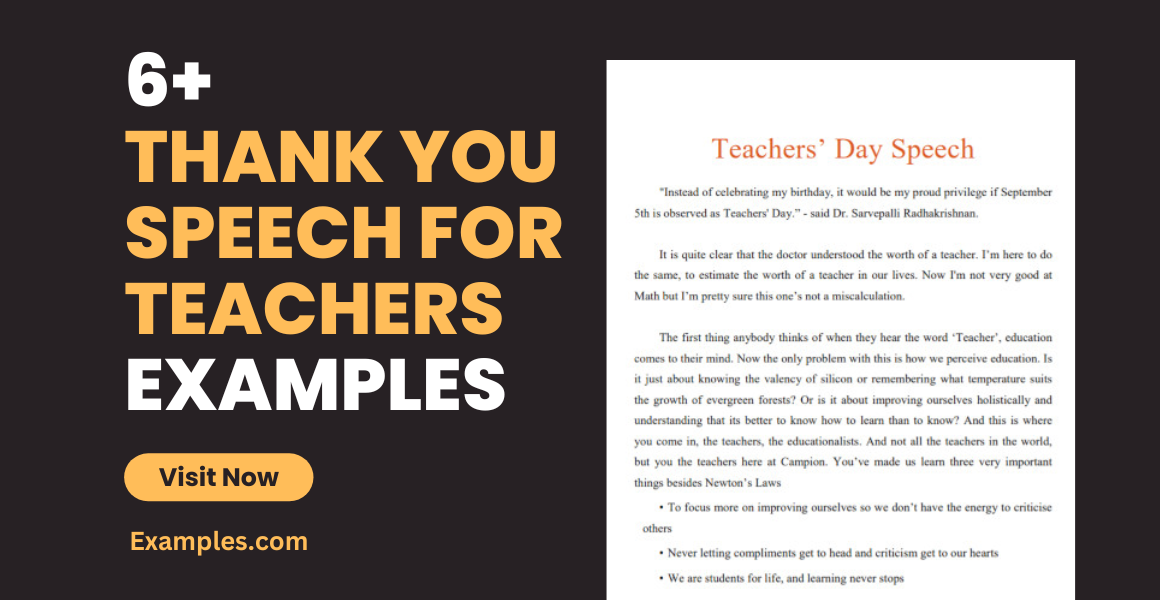
It is without a doubt that teaching is a profession that can be both rewarding and challenging. Oftentimes, teachers are not recognized for their hard work, rather they are often ignored by people. Thinking that a teacher’s job is easy and anyone can do it. Fortunately, these days, teachers are slowly getting the recognition they deserve and the fact that they are less ignored. To any student, a teacher can be many things. A friend, a second parent, and a hero. Are you a student who wishes to thank their teachers for their job well done? Or are you a principal who wishes to thank his or her teacher staff for doing a great job? Either way, if you are looking for a good speech to thank your teachers, here is something you should check out.
Listed below we have some great thank you speech for teachers examples in PDF. Choose which you want and simply click the download button.
1. Thank you Speech for Teachers Template
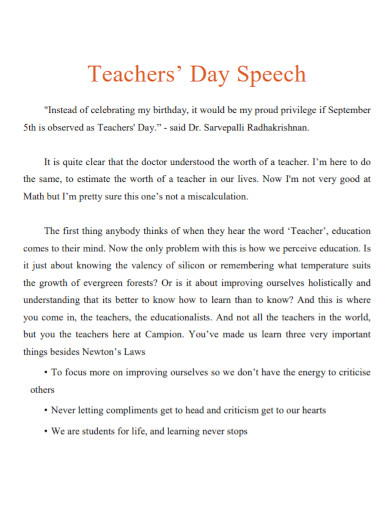
Size: 181 KB
2. Golden Award Thank you Speech for Teachers
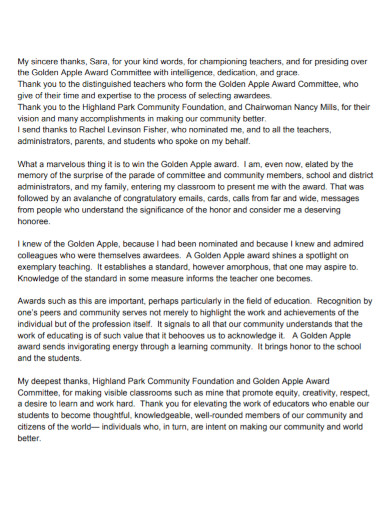
Size: 41 KB
3. Caverley Award Thank you Speech for Teachers
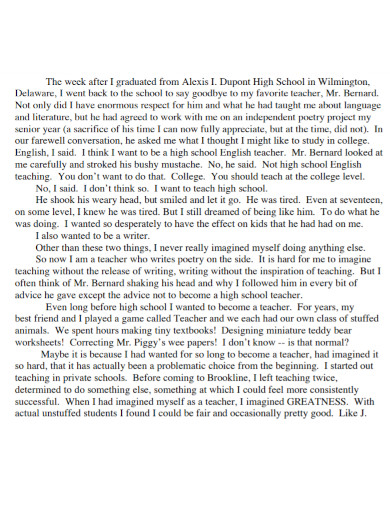
Size: 136 KB
4. Thank you Speech for Professional Teachers
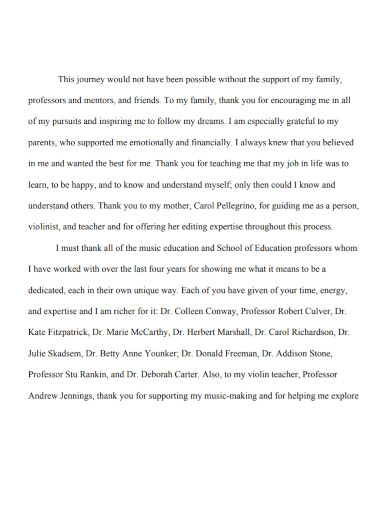
Size: 837 KB
5. Formal Thank you Speech for Teachers
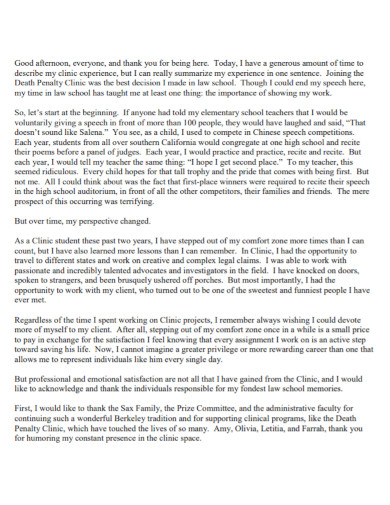
Size: 188 KB
6. Printable Thank you Speech for Teachers
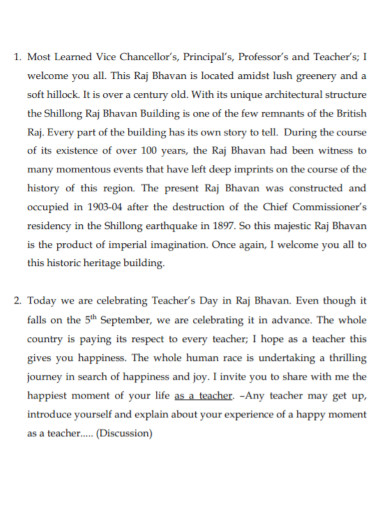
Size: 53 KB
7. President Thank you Speech for Teachers
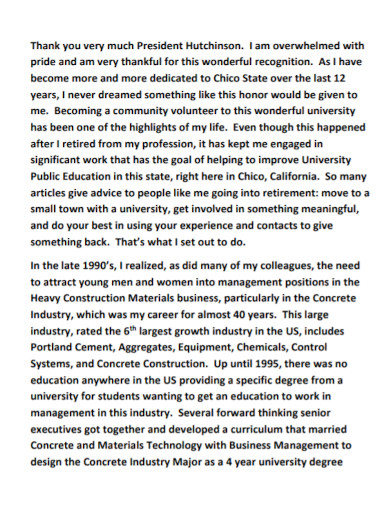
Size: 55 KB
Defining the Word Thank you
When defining the word thank you, this is an expression of appreciation . A way of saying you are grateful for who or what the person is doing or has done. An action that can be expressed either through words or through deeds.
Defining a Thank You Speech
A thank you speech is a type of speech wherein you are showing your appreciation for someone. A type of action where you are acknowledging all the deeds that have been done by the person. A short public speech that serves to show recognition for the doings that were offered by the person you are thanking for.
Defining the Word Teachers
A person who teaches. A person who is responsible for educating students. A teacher is an individual who engages in the education of a person.
Ways to Write a Thank You Speech for Teachers
The following guidelines will help you write a good thank you speech for teachers.
- Who is it for – When writing your speech , remember to state who you are writing for. Who are you thanking for?
- Don’t make it too long – Remember you are not writing a story. You are writing a speech to simply say thank you to someone.
- Say what you need to say – Just like the guideline above, do not make it too long but say what you need to say. A simple thank you may be enough but you should also add some reasons as to why you are showing gratitude.
- Practice your speech – The one thing to remember is not to bring the copy of your speech. You may use cue cards or be familiarized with what you wrote. Avoid having to bring the whole copy of your speech in front of the stage.
- Avoid saying vulgar words – Avoid saying vulgar or bad words in your speech. Be careful not to say something bad about the person you are speaking and thanking for.
How long is a thank you speech?
A thank you speech is usually a page long. This may depend on the one making the speech but it rarely goes to two pages long. You can write a paragraph or two as long as you don’t go over a page. You are simply saying thank you to the person or people whom you are showing gratitude to.
Do I need to mention the names of the people I wish to thank?
If you know their names, it is better to write them down. But in case you do not know and simply wish to thank all your teachers in general, you may simply put it to the teachers and your message.
Am I allowed to bring the copy of my speech in front?
It is highly advisable that you are familiar with your speech than to bring the whole copy in front. Not only is it not formal, it can distract you from saying what you really want to say. Be familiar with your speech. Use some keywords and key terms that go with it. Glance once in a while at your cue cards but avoid reading from them. You must always keep eye contact with your audience.
Why is a thank you speech so important?
A thank you speech is a way to show your appreciation towards someone who has done a good job. It is a way to show how thankful you are for the deeds they have done. It is also a way to prove how grateful you are for the opportunities they have shared with you. Your message can be a simple thank you or get creative with what you wish to tell them.
Do I need to write a thank you speech for each teacher I want to say thanks to?
No. If you wish to write one thank you speech for all the teachers you want to say thanks too, you may do so. Simply by writing their names, give each one of them a paragraph where you are going to write how much you appreciate their efforts and how you appreciate them in general. But if you wish to write a different set of speeches for your teachers, you may do so as well. Except it may take some time and tend to get longer. The best advice is to write one speech and their names and your messages for them.
There you have it. Simple guidelines on what to write in a thank you speech for your teachers. You need not have to write a whole novel or a short story type of speech. A simple thank you may be enough but to use a speech to thank them is better.
Teachers do not often get the appreciation they deserve but with the simple speech to say thank you for their efforts, their jobs and how you are grateful with what they are doing is enough for them to continue with their jobs. Writing the speech, remember the simple guidelines. Get creative as well. A good thank you speech comes from the heart.
Thank you Speech Generator for Teachers
Text prompt
- Instructive
- Professional
Write a Thank you Speech for Teachers on Teacher's Day.
Create a Thank you Speech for Teachers at the end of the school year.
- Games, topic printables & more
- The 4 main speech types
- Example speeches
- Commemorative
- Declamation
- Demonstration
- Informative
- Introduction
- Student Council
- Speech topics
- Poems to read aloud
- How to write a speech
- Using props/visual aids
- Acute anxiety help
- Breathing exercises
- Letting go - free e-course
- Using self-hypnosis
- Delivery overview
- 4 modes of delivery
- How to make cue cards
- How to read a speech
- 9 vocal aspects
- Vocal variety
- Diction/articulation
- Pronunciation
- Speaking rate
- How to use pauses
- Eye contact
- Body language
- Voice image
- Voice health
- Public speaking activities and games
- About me/contact
How to write a good speech in 7 steps
By: Susan Dugdale
- an easily followed format for writing a great speech
Did you know writing a speech doesn't have be an anxious, nail biting experience?
Unsure? Don't be.
You may have lived with the idea you were never good with words for a long time. Or perhaps giving speeches at school brought you out in cold sweats.
However learning how to write a speech is relatively straight forward when you learn to write out loud.
And that's the journey I am offering to take you on: step by step.
To learn quickly, go slow
Take all the time you need. This speech format has 7 steps, each building on the next.
Walk, rather than run, your way through all of them. Don't be tempted to rush. Familiarize yourself with the ideas. Try them out.
I know there are well-advertised short cuts and promises of 'write a speech in 5 minutes'. However in reality they only truly work for somebody who already has the basic foundations of speech writing in place.
The foundation of good speech writing
These steps are the backbone of sound speech preparation. Learn and follow them well at the outset and yes, given more experience and practice you could probably flick something together quickly. Like any skill, the more it's used, the easier it gets.
In the meantime...
Step 1: Begin with a speech overview or outline
Are you in a hurry? Without time to read a whole page? Grab ... The Quick How to Write a Speech Checklist And come back to get the details later.
- WHO you are writing your speech for (your target audience)
- WHY you are preparing this speech. What's the main purpose of your speech? Is it to inform or tell your audience about something? To teach them a new skill or demonstrate something? To persuade or to entertain? (See 4 types of speeches: informative, demonstrative, persuasive and special occasion or entertaining for more.) What do you want them to think, feel or do as a result of listening the speech?
- WHAT your speech is going to be about (its topic) - You'll want to have thought through your main points and have ranked them in order of importance. And have sorted the supporting research you need to make those points effectively.
- HOW much time you have for your speech eg. 3 minutes, 5 minutes... The amount of time you've been allocated dictates how much content you need. If you're unsure check this page: how many words per minute in a speech: a quick reference guide . You'll find estimates of the number of words required for 1 - 10 minute speeches by slow, medium and fast talkers.
Use an outline
The best way to make sure you deliver a perfect speech is to start by carefully completing a speech outline covering the essentials: WHO, WHY, WHAT and HOW.
Beginning to write without thinking your speech through is a bit like heading off on a journey not knowing why you're traveling or where you're going to end up. You can find yourself lost in a deep, dark, murky muddle of ideas very quickly!
Pulling together a speech overview or outline is a much safer option. It's the map you'll follow to get where you want to go.
Get a blank speech outline template to complete
Click the link to find out a whole lot more about preparing a speech outline . ☺ You'll also find a free printable blank speech outline template. I recommend using it!
Understanding speech construction
Before you begin to write, using your completed outline as a guide, let's briefly look at what you're aiming to prepare.
- an opening or introduction
- the body where the bulk of the information is given
- and an ending (or summary).
Imagine your speech as a sandwich
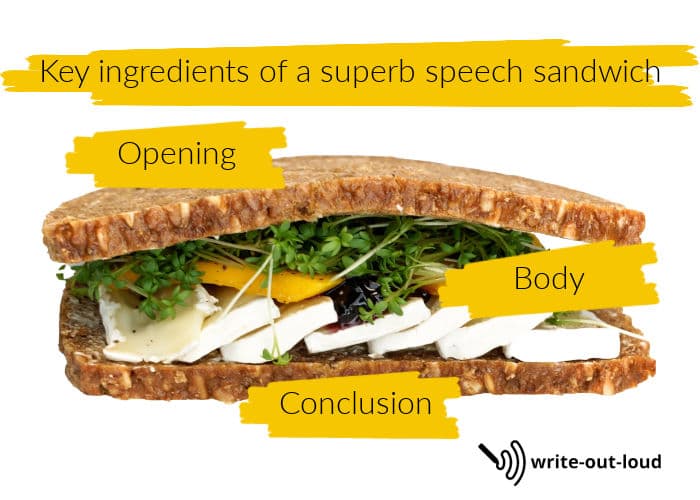
If you think of a speech as a sandwich you'll get the idea.
The opening and ending are the slices of bread holding the filling (the major points or the body of your speech) together.
You can build yourself a simple sandwich with one filling (one big idea) or you could go gourmet and add up to three or, even five. The choice is yours.
But whatever you choose to serve, as a good cook, you need to consider who is going to eat it! And that's your audience.
So let's find out who they are before we do anything else.
Step 2: Know who you are talking to
Understanding your audience.
Did you know a good speech is never written from the speaker's point of view? ( If you need to know more about why check out this page on building rapport .)
Begin with the most important idea/point on your outline.
Consider HOW you can explain (show, tell) that to your audience in the most effective way for them to easily understand it.
Writing from the audience's point of view

To help you write from an audience point of view, it's a good idea to identify either a real person or the type of person who is most likely to be listening to you.
Make sure you select someone who represents the "majority" of the people who will be in your audience. That is they are neither struggling to comprehend you at the bottom of your scale or light-years ahead at the top.
Now imagine they are sitting next to you eagerly waiting to hear what you're going to say. Give them a name, for example, Joe, to help make them real.
Ask yourself
- How do I need to tailor my information to meet Joe's needs? For example, do you tell personal stories to illustrate your main points? Absolutely! Yes. This is a very powerful technique. (Click storytelling in speeches to find out more.)
- What type or level of language is right for Joe as well as my topic? For example if I use jargon (activity, industry or profession specific vocabulary) will it be understood?
Step 3: Writing as you speak
Writing oral language.
Write down what you want to say about your first main point as if you were talking directly to Joe.
If it helps, say it all out loud before you write it down and/or record it.
Use the information below as a guide
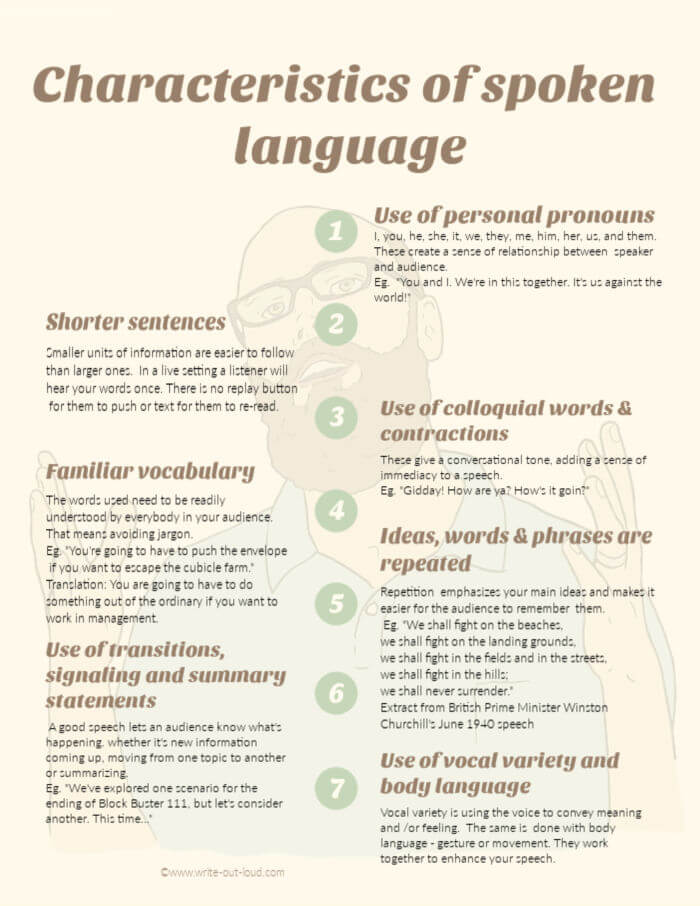
(Click to download The Characteristics of Spoken Language as a pdf.)
You do not have to write absolutely everything you're going to say down * but you do need to write down, or outline, the sequence of ideas to ensure they are logical and easily followed.
Remember too, to explain or illustrate your point with examples from your research.
( * Tip: If this is your first speech the safety net of having everything written down could be just what you need. It's easier to recover from a patch of jitters when you have a word by word manuscript than if you have either none, or a bare outline. Your call!)
Step 4: Checking tone and language
The focus of this step is re-working what you've done in Step 2 and 3.
You identified who you were talking to (Step 2) and in Step 3, wrote up your first main point. Is it right? Have you made yourself clear? Check it.
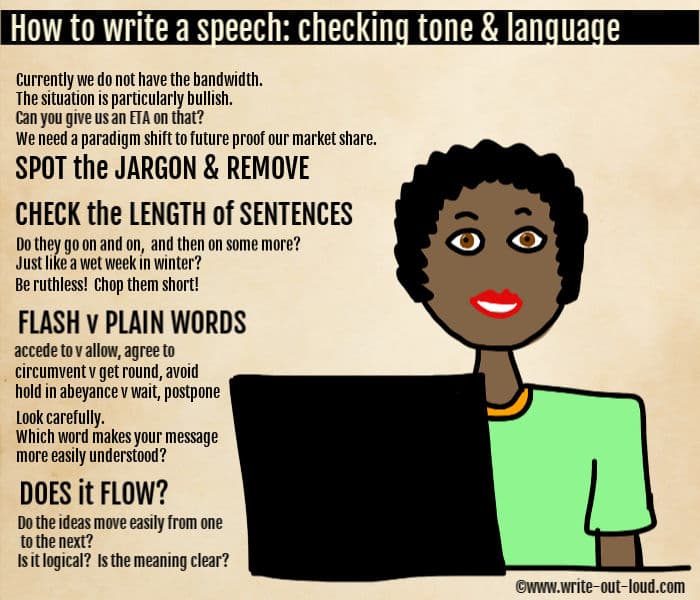
How well you complete this step depends on how well you understand the needs of the people who are going to listen to your speech.
Please do not assume because you know what you're talking about the person (Joe) you've chosen to represent your audience will too. Joe is not a mind-reader!
How to check what you've prepared
- Check the "tone" of your language . Is it right for the occasion, subject matter and your audience?
- Check the length of your sentences. You need short sentences. If they're too long or complicated you risk losing your listeners.
Check for jargon too. These are industry, activity or group exclusive words.
For instance take the phrase: authentic learning . This comes from teaching and refers to connecting lessons to the daily life of students. Authentic learning is learning that is relevant and meaningful for students. If you're not a teacher you may not understand the phrase.
The use of any vocabulary requiring insider knowledge needs to be thought through from the audience perspective. Jargon can close people out.
- Read what you've written out loud. If it flows naturally, in a logical manner, continue the process with your next main idea. If it doesn't, rework.
We use whole sentences and part ones, and we mix them up with asides or appeals e.g. "Did you get that? Of course you did. Right...Let's move it along. I was saying ..."
Click for more about the differences between spoken and written language .
And now repeat the process
Repeat this process for the remainder of your main ideas.
Because you've done the first one carefully, the rest should follow fairly easily.
Step 5: Use transitions
Providing links or transitions between main ideas.
Between each of your main ideas you need to provide a bridge or pathway for your audience. The clearer the pathway or bridge, the easier it is for them to make the transition from one idea to the next.
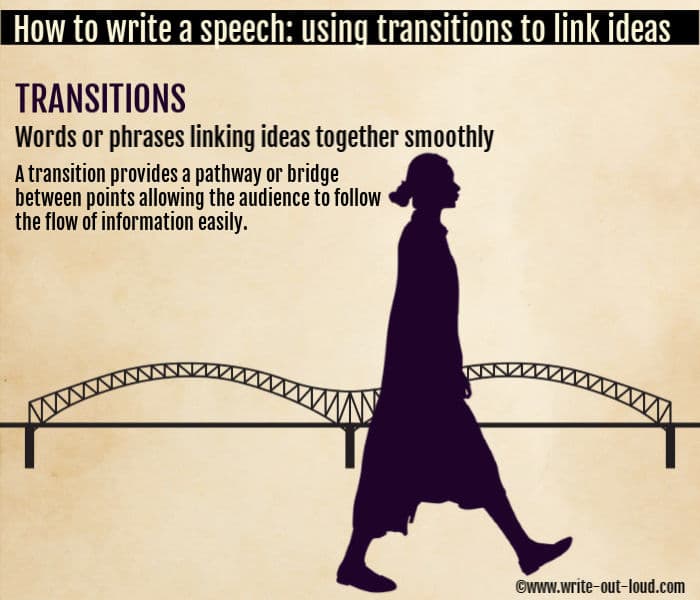
If your speech contains more than three main ideas and each is building on the last, then consider using a "catch-up" or summary as part of your transitions.
Is your speech being evaluated? Find out exactly what aspects you're being assessed on using this standard speech evaluation form
Link/transition examples
A link can be as simple as:
"We've explored one scenario for the ending of Block Buster 111, but let's consider another. This time..."
What follows this transition is the introduction of Main Idea Two.
Here's a summarizing link/transition example:
"We've ended Blockbuster 111 four ways so far. In the first, everybody died. In the second, everybody died BUT their ghosts remained to haunt the area. In the third, one villain died. His partner reformed and after a fight-out with the hero, they both strode off into the sunset, friends forever. In the fourth, the hero dies in a major battle but is reborn sometime in the future.
And now what about one more? What if nobody died? The fifth possibility..."
Go back through your main ideas checking the links. Remember Joe as you go. Try each transition or link out loud and really listen to yourself. Is it obvious? Easily followed?
Keep them if they are clear and concise.
For more about transitions (with examples) see Andrew Dlugan's excellent article, Speech Transitions: Magical words and Phrases .
Step 6: The end of your speech
The ideal ending is highly memorable . You want it to live on in the minds of your listeners long after your speech is finished. Often it combines a call to action with a summary of major points.
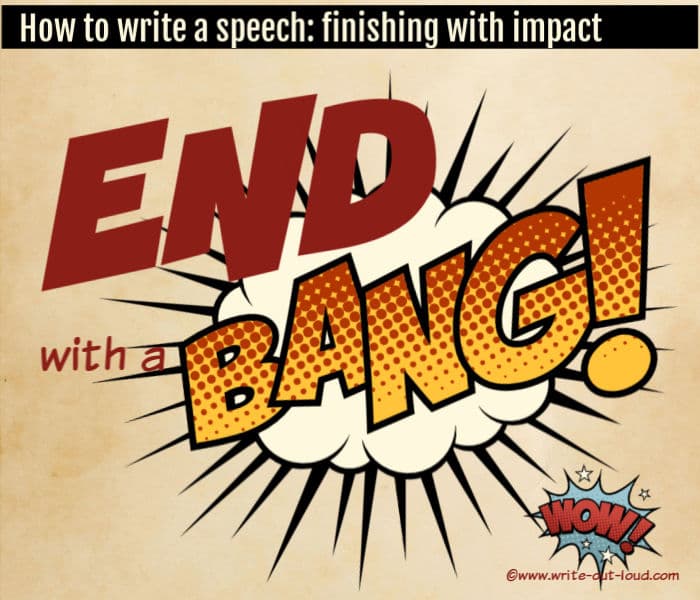
Example speech endings
Example 1: The desired outcome of a speech persuading people to vote for you in an upcoming election is that they get out there on voting day and do so. You can help that outcome along by calling them to register their support by signing a prepared pledge statement as they leave.
"We're agreed we want change. You can help us give it to you by signing this pledge statement as you leave. Be part of the change you want to see!
Example 2: The desired outcome is increased sales figures. The call to action is made urgent with the introduction of time specific incentives.
"You have three weeks from the time you leave this hall to make that dream family holiday in New Zealand yours. Can you do it? Will you do it? The kids will love it. Your wife will love it. Do it now!"
How to figure out the right call to action
A clue for working out what the most appropriate call to action might be, is to go back to your original purpose for giving the speech.
- Was it to motivate or inspire?
- Was it to persuade to a particular point of view?
- Was it to share specialist information?
- Was it to celebrate a person, a place, time or event?
Ask yourself what you want people to do as a result of having listened to your speech.
For more about ending speeches
Visit this page for more about how to end a speech effectively . You'll find two additional types of speech endings with examples.
Write and test
Write your ending and test it out loud. Try it out on a friend, or two. Is it good? Does it work?
Step 7: The introduction
Once you've got the filling (main ideas) the linking and the ending in place, it's time to focus on the introduction.
The introduction comes last as it's the most important part of your speech. This is the bit that either has people sitting up alert or slumped and waiting for you to end. It's the tone setter!
What makes a great speech opening?
Ideally you want an opening that makes listening to you the only thing the 'Joes' in the audience want to do.
You want them to forget they're hungry or that their chair is hard or that their bills need paying.
The way to do that is to capture their interest straight away. You do this with a "hook".
Hooks to catch your audience's attention
Hooks come in as many forms as there are speeches and audiences. Your task is work out what specific hook is needed to catch your audience.
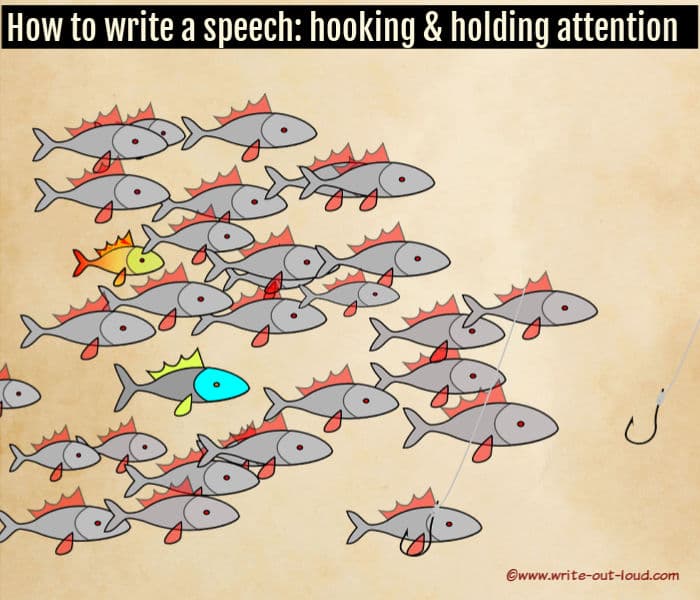
Go back to the purpose. Why are you giving this speech?
Once you have your answer, consider your call to action. What do you want the audience to do, and, or take away, as a result of listening to you?
Next think about the imaginary or real person you wrote for when you were focusing on your main ideas.
Choosing the best hook
- Is it humor?
- Would shock tactics work?
- Is it a rhetorical question?
- Is it formality or informality?
- Is it an outline or overview of what you're going to cover, including the call to action?
- Or is it a mix of all these elements?
A hook example
Here's an example from a fictional political speech. The speaker is lobbying for votes. His audience are predominately workers whose future's are not secure.
"How's your imagination this morning? Good? (Pause for response from audience) Great, I'm glad. Because we're going to put it to work starting right now.
I want you to see your future. What does it look like? Are you happy? Is everything as you want it to be? No? Let's change that. We could do it. And we could do it today.
At the end of this speech you're going to be given the opportunity to change your world, for a better one ...
No, I'm not a magician. Or a simpleton with big ideas and precious little commonsense. I'm an ordinary man, just like you. And I have a plan to share!"
And then our speaker is off into his main points supported by examples. The end, which he has already foreshadowed in his opening, is the call to vote for him.
Prepare several hooks
Experiment with several openings until you've found the one that serves your audience, your subject matter and your purpose best.
For many more examples of speech openings go to: how to write a speech introduction . You'll find 12 of the very best ways to start a speech.
That completes the initial seven steps towards writing your speech. If you've followed them all the way through, congratulations, you now have the text of your speech!
Although you might have the words, you're still a couple of steps away from being ready to deliver them. Both of them are essential if you want the very best outcome possible. They are below. Please take them.
Step 8: Checking content and timing
This step pulls everything together.
Check once, check twice, check three times & then once more!
Go through your speech really carefully.
On the first read through check you've got your main points in their correct order with supporting material, plus an effective introduction and ending.
On the second read through check the linking passages or transitions making sure they are clear and easily followed.
On the third reading check your sentence structure, language use and tone.
Double, triple check the timing
Now go though once more.
This time read it aloud slowly and time yourself.
If it's too long for the time allowance you've been given make the necessary cuts.
Start by looking at your examples rather than the main ideas themselves. If you've used several examples to illustrate one principal idea, cut the least important out.
Also look to see if you've repeated yourself unnecessarily or, gone off track. If it's not relevant, cut it.
Repeat the process, condensing until your speech fits the required length, preferably coming in just under your time limit.
You can also find out how approximately long it will take you to say the words you have by using this very handy words to minutes converter . It's an excellent tool, one I frequently use. While it can't give you a precise time, it does provide a reasonable estimate.
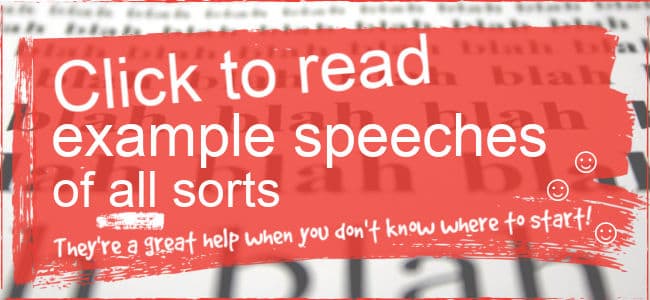
Step 9: Rehearsing your speech
And NOW you are finished with writing the speech, and are ready for REHEARSAL .
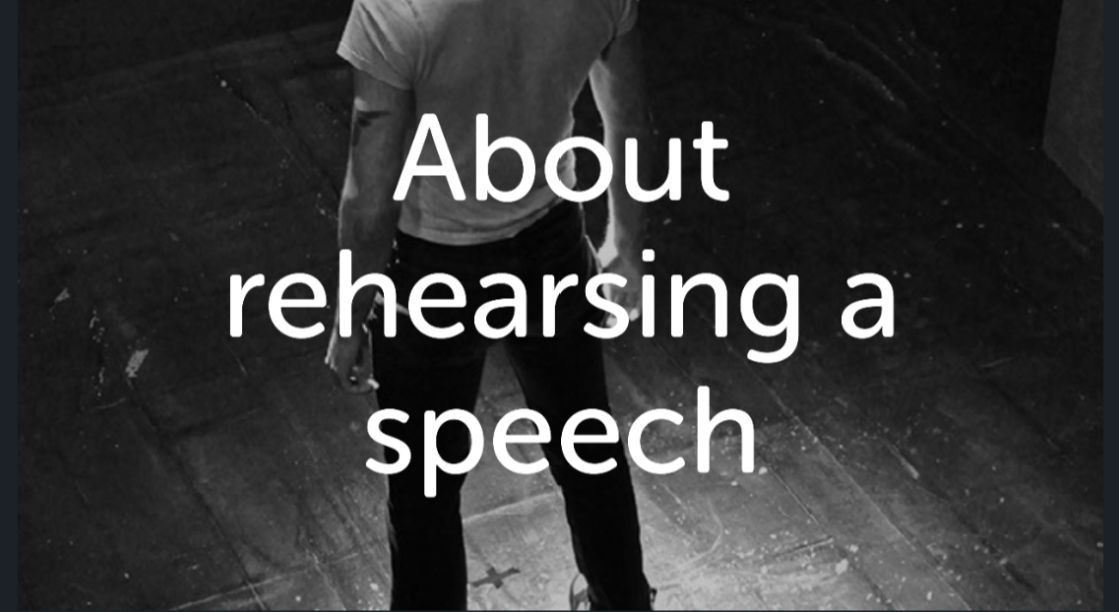
Please don't be tempted to skip this step. It is not an extra thrown in for good measure. It's essential.
The "not-so-secret" secret of successful speeches combines good writing with practice, practice and then, practicing some more.
Go to how to practice public speaking and you'll find rehearsal techniques and suggestions to boost your speech delivery from ordinary to extraordinary.
The Quick How to Write a Speech Checklist
Before you begin writing you need:.
- Your speech OUTLINE with your main ideas ranked in the order you're going to present them. (If you haven't done one complete this 4 step sample speech outline . It will make the writing process much easier.)
- Your RESEARCH
- You also need to know WHO you're speaking to, the PURPOSE of the speech and HOW long you're speaking for
The basic format
- the body where you present your main ideas
Split your time allowance so that you spend approximately 70% on the body and 15% each on the introduction and ending.
How to write the speech
- Write your main ideas out incorporating your examples and research
- Link them together making sure each flows in a smooth, logical progression
- Write your ending, summarizing your main ideas briefly and end with a call for action
- Write your introduction considering the 'hook' you're going to use to get your audience listening
- An often quoted saying to explain the process is: Tell them what you're going to tell them (Introduction) Tell them (Body of your speech - the main ideas plus examples) Tell them what you told them (The ending)
TEST before presenting. Read aloud several times to check the flow of material, the suitability of language and the timing.

- Return to top
speaking out loud
Subscribe for FREE weekly alerts about what's new For more see speaking out loud

Top 10 popular pages
- Welcome speech
- Demonstration speech topics
- Impromptu speech topic cards
- Thank you quotes
- Impromptu public speaking topics
- Farewell speeches
- Phrases for welcome speeches
- Student council speeches
- Free sample eulogies
From fear to fun in 28 ways
A complete one stop resource to scuttle fear in the best of all possible ways - with laughter.

Useful pages
- Search this site
- About me & Contact
- Blogging Aloud
- Free e-course
- Privacy policy
©Copyright 2006-24 www.write-out-loud.com
Designed and built by Clickstream Designs

Speech Script: Teachers’ Day
Teachers’ Day is a special occasion where we express our gratitude and appreciation for the invaluable contributions of educators in shaping our lives. Delivering a heartfelt speech is a wonderful way to honor teachers on this significant day. In this article, we will provide a comprehensive guide on how to write an inspiring speech for Teachers’ Day, highlighting key elements such as understanding the audience, structuring the speech, incorporating personal anecdotes, expressing gratitude, and delivering a memorable conclusion.
Table of Contents
Understanding the Audience
Before you begin writing your Teachers’ Day speech, it is crucial to understand your audience. Consider the diverse group of teachers who will be present, ranging from seasoned educators to newly appointed teachers. Acknowledge their dedication, passion, and the challenges they face in their noble profession. Tailor your speech to resonate with their experiences and aspirations, ensuring that your words create a sense of unity and appreciation among the educators.
Structuring the Speech
An organized structure is essential for an effective speech. Begin with a warm introduction, capturing the attention of your audience. Provide a brief overview of the significance of Teachers’ Day and the purpose of your speech. Transition into the main body, divided into several key points. Each point should focus on a specific aspect, such as the impact of teachers on students’ lives, the transformative power of education, or the importance of continuous learning. Use clear and concise language, and support your points with relevant examples or anecdotes. Finally, conclude your speech by summarizing the key ideas and reinforcing the message of appreciation and gratitude.
Incorporating Personal Anecdotes
Personal anecdotes add a touch of authenticity and emotional connection to your speech. Share your own experiences as a student and highlight the teachers who have made a lasting impact on your life. Recall specific moments or instances that exemplify their dedication, compassion, or innovative teaching methods. By sharing these personal stories, you not only honor the teachers who have influenced you but also inspire others to reflect on their own experiences with educators. Remember to maintain a balance between personal anecdotes and broader messages that resonate with the entire audience.
Expressing Gratitude
Teachers’ Day is an opportune time to express heartfelt gratitude. Take a moment to acknowledge the hard work, sacrifices, and unwavering commitment demonstrated by teachers. Reflect on the challenges they face, including the demanding nature of their profession and their role in shaping future generations. Express appreciation for their guidance, patience, and belief in their students’ potential. Consider incorporating quotes, poems, or excerpts from famous speeches that exemplify the impact of teachers on society. Be sincere and genuine in your expressions of gratitude, as it will resonate deeply with your audience.
Delivering a Memorable Conclusion
A powerful conclusion leaves a lasting impression on your audience. Summarize the key points of your speech, emphasizing the significance of teachers and their role as catalysts for change. Inspire your audience with a call to action, encouraging them to continue making a difference in the lives of students. Conclude with a heartfelt thank you, expressing gratitude once again for the dedication and passion exhibited by teachers. Consider ending with a memorable quote or a thought-provoking statement that encapsulates the essence of your speech.
Teachers’ Day Speech Example #1
Esteemed teachers, respected guests, and dear students,
Today, we gather here to celebrate a group of extraordinary individuals who shape our minds, inspire our hearts, and ignite our passion for learning—our teachers. On this special occasion of Teachers’ Day, we come together to express our deepest gratitude and appreciation for the invaluable contributions they make in our lives. In this speech, we will reflect on the profound impact of teachers, the transformative power of education, and the importance of honoring and celebrating these remarkable individuals.
Teachers hold the power to change lives, to ignite curiosity, and to unlock the potential within each of us. They are the guiding lights that illuminate our path to knowledge and understanding. Through their dedication, expertise, and unwavering belief in our abilities, they empower us to dream big, to challenge ourselves, and to reach for the stars. Teachers not only impart academic knowledge but also nurture our character, values, and life skills. They instill in us the confidence to face challenges, the resilience to persevere, and the compassion to make a positive impact in the world.
Education is the key that unlocks the doors of opportunity and empowers us to shape our own destinies. Teachers play a pivotal role in this transformative journey. They create inclusive and engaging learning environments where we can explore new ideas, ask questions, and discover our passions. They encourage critical thinking, creativity, and independent thought, equipping us with the tools to navigate an ever-changing world. Beyond textbooks and exams, teachers impart life lessons, values, and the importance of empathy and respect for others. They foster a love for lifelong learning and inspire us to become lifelong learners ourselves.
Teachers’ Day is a time to honor and celebrate the tireless efforts, dedication, and unwavering commitment of our teachers. It is an opportunity to express our gratitude for the sacrifices they make, the extra hours they invest, and the personal care they provide to ensure our success. Today, let us reflect on the impact teachers have made in our lives and the countless ways they have shaped our futures.
Let us recognize the teachers who have gone above and beyond, who have nurtured our potential, and who have believed in us when we doubted ourselves. Their guidance and mentorship have left an indelible mark on our hearts and minds. Today, we acknowledge their selflessness, their passion for teaching, and their relentless pursuit of our growth and development.
Beyond individual teachers, let us celebrate the entire teaching community. The collective efforts of teachers shape the foundation of education and society as a whole. Let us acknowledge their resilience, adaptability, and dedication, especially in the face of unprecedented challenges. Their unwavering commitment to our education and well-being is deserving of our highest praise and appreciation.
In conclusion, on this special occasion of Teachers’ Day, let us honor and celebrate the guiding lights who have touched our lives and shaped our futures. Let us express our gratitude not only through words but through our actions, by applying the lessons they have taught us and making a positive impact in the world. To all the remarkable teachers present here today and to teachers around the world, we extend our deepest appreciation and wish you a joyous and fulfilling Teachers’ Day.
Teachers’ Day Speech Example #2
Esteemed educators, distinguished guests, and dear students,
Today, we gather here to celebrate the incredible influence of teachers in our lives and to commemorate the significance of their role on this special occasion of Teachers’ Day. Teachers are the architects of our intellectual and personal growth, guiding us along the path of knowledge and empowering us to reach our fullest potential. In this speech, we will reflect on the enduring impact of teachers, the transformative power of education, and the profound gratitude we owe to these remarkable individuals.
Teachers are the guiding light that illuminates the path to discovery and understanding. They possess the extraordinary ability to ignite a flame of curiosity within us, sparking a lifelong love for learning. Through their passion, knowledge, and dedication, they provide us with the tools to navigate the complexities of the world. Teachers foster critical thinking, encourage intellectual curiosity, and instill in us the confidence to voice our opinions and ideas. They create an environment that nurtures creativity, problem-solving skills, and resilience. Their unwavering support and belief in our abilities empower us to explore our potential and pursue our dreams.
Education is a transformative force that has the power to shape lives and create a better future. Teachers are the catalysts of this transformation, molding not only our minds but also our character. They equip us with the knowledge and skills necessary to navigate the challenges of life and contribute meaningfully to society. Teachers go beyond textbooks, imparting life lessons, values, and empathy. They inspire us to become compassionate individuals who are aware of the world around us. Teachers foster a sense of inclusivity, celebrating diversity and nurturing a respectful and harmonious community.
Teachers’ Day is a momentous occasion to express our sincerest gratitude and honor the teachers who have made a profound impact on our lives. Let us take this opportunity to acknowledge their unwavering dedication, sacrifice, and unwavering belief in our potential. Today, we celebrate not just individual teachers, but the entire teaching community. Every teacher, whether in a classroom, a laboratory, or through virtual platforms, plays a crucial role in shaping the minds of future generations.
Let us remember those teachers who have gone above and beyond, who have inspired us to dream big and supported us in achieving our goals. Their mentorship and guidance have left an indelible mark on our lives. Today, we honor their commitment to our growth and their tireless efforts to make a difference.
As students, let us also recognize our responsibility to honor our teachers by embracing education with enthusiasm, integrity, and a thirst for knowledge. Let us strive to be lifelong learners, continuing to grow and develop even beyond the boundaries of the classroom.
In conclusion, on this momentous Teachers’ Day, let us celebrate the enduring impact of teachers on our lives. Their dedication, passion, and commitment have shaped our minds, influenced our character, and paved the way for our future success. Today and every day, let us express our deepest gratitude to the remarkable teachers who have illuminated our path and inspired us to reach for the stars. To all the teachers present here today and to teachers around the world, we extend our heartfelt appreciation and wish you a joyous and fulfilling Teachers’ Day.
Teachers’ Day Speech Example #3
Honorable educators, esteemed guests, and dear students,
Today, we gather here to pay tribute to the profound impact of teachers in shaping minds, nurturing souls, and igniting a lifelong love for learning. On this auspicious occasion of Teachers’ Day, we come together to celebrate the unwavering dedication and invaluable contributions of these remarkable individuals. In this speech, we will reflect on the enduring influence of teachers, the transformative power of education, and the deep gratitude we owe to those who have guided us on our educational journey.
Teachers are the guiding lights that illuminate the paths to knowledge, wisdom, and self-discovery. They possess the unique ability to recognize and nurture the potential within each student. In their classrooms, they create an environment that fosters growth, curiosity, and intellectual exploration. With passion and expertise, they impart knowledge, challenge assumptions, and inspire us to think critically. Teachers not only teach us subjects but also guide us in navigating life’s complexities, instilling values, empathy, and resilience. They believe in our capabilities and provide unwavering support, empowering us to overcome obstacles and achieve our goals.
Education is a transformative force that empowers individuals and drives positive change in society. Teachers are the catalysts of this transformation, shaping generations of learners. Through education, they open doors of opportunity, broaden perspectives, and equip us with the tools to thrive in a rapidly evolving world. Teachers foster creativity, encourage innovation, and nurture the skills necessary for success. They inspire us to become lifelong learners, instilling a hunger for knowledge and a passion for personal growth. Beyond academic subjects, teachers cultivate critical thinking, compassion, and social responsibility, molding well-rounded individuals who contribute meaningfully to their communities.
Teachers’ Day is a momentous occasion to honor and appreciate the tireless efforts and unwavering commitment of our teachers. It is an opportunity to express our deepest gratitude for their selflessness, patience, and dedication to our education and well-being. Today, let us remember and celebrate those teachers who have left an indelible mark on our lives, who have gone beyond their call of duty, and who have believed in our potential when we doubted ourselves.
Let us acknowledge the sacrifices teachers make, often going above and beyond their responsibilities to ensure our success. Their encouragement, mentorship, and guidance have shaped our futures and inspired us to become the best versions of ourselves. Today, we express our heartfelt appreciation for their unwavering support and the countless hours they invest in our growth.
Moreover, let us extend our gratitude to the entire teaching community. Teachers work collaboratively, sharing knowledge, best practices, and inspiration. They support and uplift one another, united by a common goal of nurturing young minds. The collective efforts of teachers shape the foundation of education, laying the groundwork for a brighter and more enlightened future.
In conclusion, on this special Teachers’ Day, let us celebrate the everlasting influence of teachers, the guiding lights who have shaped our lives and set us on a path to success. Their dedication, passion, and unwavering belief in our potential have made a lasting impact. May we always remember their invaluable contributions and strive to honor their legacy by embracing education, pursuing knowledge, and making a positive difference in the world. To all the exceptional teachers present here today and to educators worldwide, we extend our deepest gratitude and wish you a joyous and fulfilling Teachers’ Day.
Final Thoughts
Writing an inspiring speech for Teacher’s Day requires careful consideration of the audience, a well-structured outline, personal anecdotes, expressions of gratitude, and a memorable conclusion. By honoring teachers through our words, we celebrate their impact on our lives and recognize their pivotal role in shaping the future generations.
About Mr. Greg
Mr. Greg is an English teacher from Edinburgh, Scotland, currently based in Hong Kong. He has over 5 years teaching experience and recently completed his PGCE at the University of Essex Online. In 2013, he graduated from Edinburgh Napier University with a BEng(Hons) in Computing, with a focus on social media.
Mr. Greg’s English Cloud was created in 2020 during the pandemic, aiming to provide students and parents with resources to help facilitate their learning at home.
Whatsapp: +85259609792
[email protected]


The ultimate guide to crafting a Teacher’s Day Speech that will make your teachers feel like superheroes!
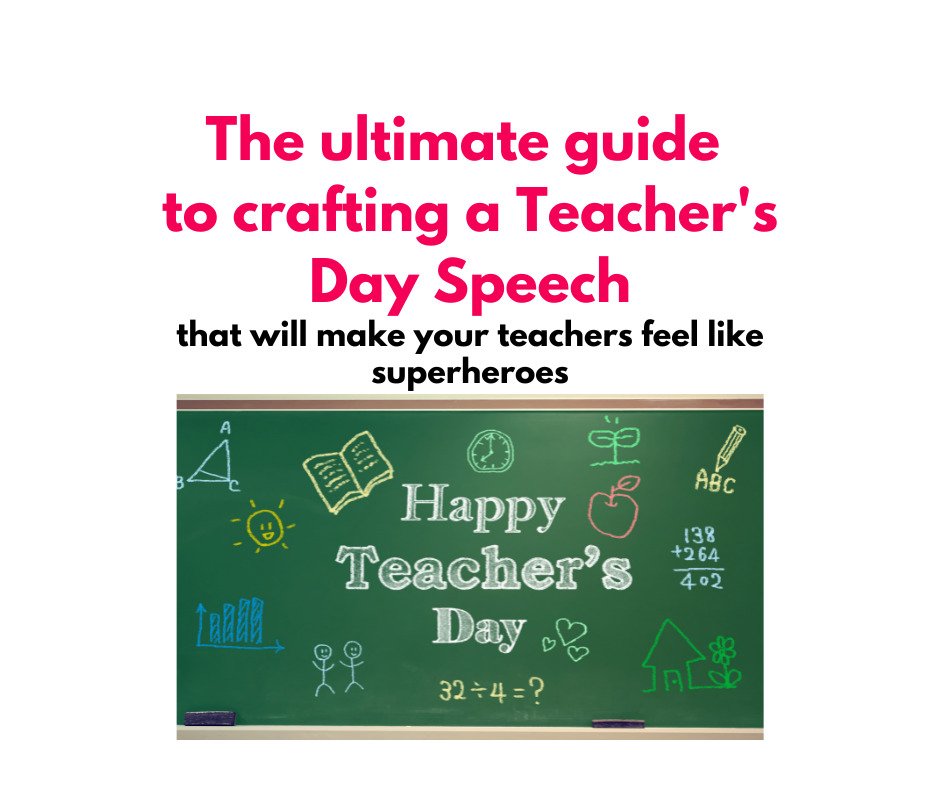
Help your child deliver a memorable Teachers’ Day speech with these expert tips. From brainstorming ideas to perfecting their delivery, we’ve got you covered. Don’t miss out on this ultimate guide for proud parents!
Are you feeling the pressure of writing a perfect Teacher’s Day Speech that will make your teachers feel appreciated and valued? Don’t worry, you’re not alone. As a parent or a kid, it can be daunting to find the right words to express your gratitude to the teachers who have dedicated their lives to educating and nurturing you. But fear not, we’re here to help you craft a speech that will make your teachers feel like superheroes!
Maybe you’re feeling overwhelmed by the task at hand, thinking “How am I supposed to sum up everything my teacher means to me in just a few minutes?” It’s understandable to feel that way. After all, your teacher has been a constant source of support and inspiration throughout the year. But take a deep breath and relax. We’ve got your back.
In this ultimate guide, we’ll walk you through the steps to create a heartfelt and impactful Teacher’s Day Speech. We’ll provide you with practical tips, real-life examples, and a ton of inspiration to help you express your gratitude and admiration for your teachers.
So, let’s begin! By the end of this article, you’ll be ready to deliver a speech that will make your teachers feel like superheroes.
Crafting a Superhero-worthy Teacher’s Day Speech: Expressing Gratitude, Acknowledging Hard Work, and Recognizing Contributions
As Teacher’s Day approaches, it’s time to start thinking about how to make your teachers feel appreciated and valued. After all, teachers play a pivotal role in shaping our lives and futures. They are the unsung heroes who work tirelessly to inspire and educate us. So, it’s only fitting that we take the time to acknowledge and thank them for all that they do.
But what exactly makes a Teacher’s Day Speech stand out? How can we express our gratitude in a way that truly resonates with our teachers? The key is to make them feel like superheroes.
Teachers have the power to transform lives. They are the ones who instill a love for learning and guide us through our academic journey. Without them, we wouldn’t be where we are today. That’s why it’s so important to make them feel appreciated and valued.
So, how do we do that? The first step is to express gratitude. Thank your teachers for their unwavering support, their guidance, and their dedication. Let them know how much you appreciate everything they’ve done for you.
Next, acknowledge their hard work. Teaching is not an easy job, and it takes a lot of effort and patience to be a great teacher. So, take a moment to recognize the sacrifices they’ve made and the challenges they’ve overcome.
Finally, recognize their contributions. Teachers play a crucial role in shaping our lives, and they deserve recognition for all that they do. Whether it’s through a heartfelt speech or a thoughtful gift, let your teachers know that their contributions have not gone unnoticed.
By following these key elements, you can create a Teacher’s Day Speech that truly makes your teachers feel like superheroes.
So, let’s start crafting a speech that shows our teachers just how much they mean to us.
Practical tips for crafting an effective Best Teacher’s Day Speech
Teachers are the backbone of our society, nurturing and molding young minds to become responsible and productive members of society. As such, it is important to recognize and appreciate the hard work and dedication that they put into their profession. One of the most effective ways to do so is by delivering a heartfelt and memorable Teachers’ Day Speech.
Crafting a good Teachers’ Day Speech can seem daunting, but with the right mindset and approach, anyone can deliver a speech that resonates with their audience.
Here are some practical tips to help you write the best Teachers’ Day Speech:
Start with Preparation
Before you start writing your speech, take some time to gather your thoughts and prepare an outline. Identify the key points that you want to cover and the message you want to convey. It is important to have a clear idea of what you want to say and how you want to say it.
Organise the Speech
It is essential to organize your speech to ensure that it flows logically and is easy to follow. Start with an introduction that captures the audience’s attention, briefly introduce yourself and the purpose of the speech. In the body of the speech, express your gratitude, highlight your teacher’s contributions, and share personal anecdotes. In the conclusion, summarise your thoughts and reiterate your appreciation.
Duration of the Speech
When delivering a Teachers’ Day speech, it is crucial to keep it brief and to the point. An ideal Teachers’ Day speech should not exceed 10 minutes. This ensures that your speech is engaging and memorable, without being too long and tedious.
Express your gratitude to your teacher for their dedication, hard work, and contribution towards your growth and development. Highlight specific examples of how your teacher has impacted your life, both academically and personally.
Do Not Exaggerate
While it’s essential to acknowledge your teacher’s efforts, it’s crucial not to exaggerate. Be sincere and truthful in your speech, and avoid making false statements or claims.
Do Not Undermine the Purpose of the Speech
Keep in mind the purpose of the Teachers’ Day speech – to express your gratitude and appreciation. Avoid any negative comments or criticisms and stay focused on the positive aspects.
Dedicate Your Thoughts
When crafting your Teachers’ Day speech, take the time to reflect on your teacher’s impact on your life. Dedicate your thoughts and emotions to ensure that your speech is authentic and heartfelt.
Incorporate Humor and Emotion
Incorporating humor and emotion into your speech can make it more engaging and memorable. Use personal anecdotes, metaphors, and analogies to make your speech relatable and impactful. However, ensure that the humor is appropriate and does not undermine the purpose of the speech.
Use Personal Anecdotes
A good speech is one that connects with the audience on a personal level. Share personal anecdotes or stories that showcase the impact that teachers have had on your life. This will help you establish an emotional connection with your audience and make your speech more memorable.
Be Unconventional
While there are some standard conventions for a Teachers’ Day Speech, don’t be afraid to break the mold and try something new. Perhaps you can incorporate a poem, a song, or a visual aid to make your speech more memorable.
Practice, Practice, Practice
Once you have written your speech, practice delivering it multiple times. This will help you become more comfortable with the material and ensure that you deliver a polished and confident speech.
By following these tips and incorporating your own unique style, you can craft a speech that celebrates and honors the hard work and dedication of teachers everywhere. Remember to speak from the heart, and your message will resonate with your audience for years to come.
After guiding your child to write a well-crafted Teachers’ Day Speech, the next step is to help them practice and deliver it with confidence. Here are some tips to ensure your child’s speech is not only impressive but also emotionally touching:
- Practice, Practice, Practice: Encourage your child to rehearse their speech in front of a mirror or with family and friends. This will help them overcome stage fright and build their confidence.
- Focus on Intonation and Voice Modulation: The tone of voice and modulation can make or break a speech. Encourage your child to practice speaking in a clear, confident, and emotive tone. Teach them to emphasize important words, phrases, and expressions to make their speech more impactful.
- Maintain a Moderate Rate of Speech: Your child should speak at a pace that is neither too fast nor too slow. Speaking too fast may cause the audience to miss important points, while speaking too slowly can make the speech boring and uninteresting.
- Use a Pleasing Pitch: Your child’s pitch should be pleasing to the ear. Teach them to speak with a tone that is neither too high nor too low. This will make their speech more engaging and interesting to listen to.
- Engage the Audience with Presentation: Encourage your child to use appropriate gestures and body language to complement their speech. This will help them connect with the audience and keep them engaged throughout the speech.
- Maintain Eye Contact: Your child should maintain eye contact with the audience while delivering their speech. This will make them appear confident and sincere.
By following these tips, your child can deliver an impressive and touching speech that will leave their teachers feeling appreciated and valued.
Sample Teachers’ Day Speech Ideas in English
Here are some sample speeches that you can use as a guide:
Sample Teacher’s Day Speech #1
Dear Teachers,
A very good morning to each and every one of you. Today, on the occasion of Teachers’ Day, I stand here with immense pleasure to express my heartfelt gratitude to all the teachers who have played a pivotal role in shaping my life.
Teachers’ Day is not just a day to celebrate, but also a day to recognize and appreciate the contributions of our teachers. Without you, we would not be the person we are today. You have been the guiding light who has led us towards the path of success.
I vividly remember my first day in school when I was scared and lost. But, my teacher came to me with a warm smile and guided me through the day. From that day on, I knew that I had found a second home in school. I found a family in my teachers who nurtured me with knowledge and values that would stay with me for the rest of my life.
Teachers, you have inspired us to dream big and reach for the stars. You have motivated us to believe in ourselves and our abilities. You have instilled in us the importance of hard work and determination, and the value of ethics and integrity. You have not just taught us subjects, but also taught us life skills that are invaluable.
As a student, I understand the immense hard work and dedication that goes into being a teacher. You have to be a mentor, a friend, and a guide, all rolled into one. And yet, you always manage to go above and beyond to ensure that we have the best learning experience.
Today, I would like to take this opportunity to thank each and every one of you for your unwavering support, encouragement, and guidance. Thank you for always being there for us, for pushing us to do better, and for believing in us even when we didn’t believe in ourselves.
In conclusion, I would like to say that teachers are not just educators, but also life changers. You have the power to shape the future of our nation by shaping the future of your students. So, on this Teachers’ Day, I urge you to keep inspiring and motivating us, and to keep making a positive impact in the world.
Thank you, and Happy Teachers’ Day!
Sample Teacher’s Day Speech #2
Good morning everyone,
I stand before you today with a heart full of gratitude and a mind filled with memories that I will cherish for the rest of my life. Today, on Teacher’s Day, I would like to take a moment to thank all the wonderful teachers who have helped shape me into the person I am today.
I have been lucky enough to have many great teachers throughout my academic journey, but I would like to specifically thank two teachers who have had a profound impact on my life. The first is my primary school teacher, Mrs. Smith, who not only taught me how to read and
write, but also how to be kind, compassionate and curious. She encouraged me to ask questions and explore the world around me, and for that I will always be grateful.
The second teacher I would like to thank is my high school English teacher, Mr. Johnson. He not only taught me the intricacies of literature and writing, but also taught me the value of hard work and perseverance. He believed in me when I didn’t believe in myself and pushed me to strive for excellence.
But today is not just about thanking individual teachers, it is about acknowledging the tireless efforts of all teachers who work day in and day out to provide their students with the best possible education. Teaching is not an easy job, and yet they do it with dedication and passion.
On this Teacher’s Day, I urge all of us to remember the importance of teachers and the role they play in shaping our future. Let us not take them for granted and show them the respect and appreciation they deserve.
In conclusion, I would like to say thank you to all the teachers out there who have touched our lives in one way or another. Your hard work and dedication do not go unnoticed and we are all grateful for everything you do. Happy Teacher’s Day!
Sample Teacher’s Day Speech #3
Dear teachers and fellow students,
Today is a day we set aside to recognize the hard work, dedication and unwavering commitment of our teachers. We come together to celebrate them and express our gratitude for their role in shaping our lives.
As I stand here today, I am reminded of the countless hours that our teachers have put in to help us become the best version of ourselves. They have not only imparted knowledge but also instilled in us values that will guide us throughout our lives.
I vividly remember the day when I walked into this school as a nervous and timid student, unsure of what the future held for me. But it was the teachers who welcomed me with open arms, believed in me, and pushed me to reach my full potential.
Our teachers have gone above and beyond to ensure that we receive a quality education, often sacrificing their own time and resources to make it happen. They have encouraged us to dream big and work hard, and have been there every step of the way to guide and support us.
Today, we want to express our heartfelt gratitude to all our teachers for the immeasurable impact they have had on our lives. We are grateful for your patience, your kindness, and your unwavering commitment to our growth and development.
To the teachers, we want you to know that you are our role models, our mentors, and our heroes. We look up to you and admire your passion for teaching and your willingness to go the extra mile for us. You have inspired us to be the best version of ourselves, and for that, we are forever grateful.
In conclusion, on behalf of all the students, I want to say thank you to our teachers for everything that you do. Your dedication and passion have not gone unnoticed, and we want you to know that you have made a profound impact on our lives. Happy Teacher’s Day!
Sample Teacher’s Day Speech #4
Dear respected teachers, fellow students, and distinguished guests,
I am honored to stand before you all on this special occasion of Teacher’s Day. I want to take this opportunity to express my gratitude and appreciation to all the teachers who have made a profound impact on my life.
Teachers are more than just educators. They are mentors, role models, and guides who help us navigate through the complexities of life. They inspire us to be our best selves and push us to achieve our fullest potential. Without their guidance and support, we would not be where we are today.
As students, we are blessed to have some of the most dedicated and passionate teachers who go above and beyond to make sure we are learning and growing every day. They put in long hours, sacrifice their personal time, and invest in our futures.
I want to take this moment to thank each and every one of our teachers for their tireless efforts in shaping our minds and character. Thank you for the encouragement, the patience, and the kindness you have shown us. You have made a difference in our lives, and we are forever grateful.
I also want to acknowledge the challenges that teachers have faced in the past year and a half. The pandemic has brought unprecedented changes and difficulties in the education system, and teachers have had to adapt quickly to new teaching methods and technologies. Despite these challenges, they have continued to put the needs of their students first and have gone above and beyond to ensure that we receive a quality education.
As we celebrate this day, let us also reflect on the importance of education and the vital role that teachers play in shaping our society. Let us commit to supporting and appreciating our teachers every day, not just on this special occasion.
Once again, I want to express my deepest appreciation and respect for all the teachers who have touched our lives. Thank you for being our superheroes.
Happy Teacher’s Day!
Sample Teacher’s Day Speech #5
Today, we gather to celebrate and honor our teachers on this special occasion of Teacher’s Day. It’s a day to express our gratitude and appreciation for all the hard work and dedication that they put into shaping our lives and helping us achieve our goals.
As I stand before you, I am reminded of the countless memories that we have shared with our teachers – from the laughter and joy of learning new things to the challenges and struggles that they have helped us overcome. Our teachers have always been there for us, guiding us every step of the way.
They have taught us not just academic subjects but also valuable life lessons such as honesty, integrity, and respect. They have nurtured our talents and encouraged us to pursue our passions. They have been our mentors, our friends, and our role models.
On this special day, I want to take a moment to thank each and every one of our teachers for the profound impact that they have had on our lives. Your patience, kindness, and dedication have inspired us to be better versions of ourselves. You have helped us realize our full potential and taught us to believe in ourselves.
I also want to acknowledge the sacrifices that our teachers make every day to ensure that we receive the best education possible. They spend long hours preparing lessons, grading papers, and providing us with extra help when we need it. They do all of this with a smile on their faces, knowing that they are making a difference in our lives.
As we celebrate Teacher’s Day, let us pledge to continue to learn from our teachers and to show our appreciation for all that they do for us. Let us strive to make them proud by working hard, pursuing our dreams, and becoming responsible citizens of our country.
Once again, thank you to all of our teachers for being the guiding light in our lives. Happy Teacher’s Day!
Sample Teacher’s Day Speech #6
I stand before you today on this special occasion of Teacher’s Day to express my heartfelt gratitude and appreciation to all the teachers who have played a significant role in shaping me into the person I am today.
As a student, I have had the privilege of being taught by some of the most inspiring teachers who have not only imparted knowledge but also instilled values and ethics that have helped me become a better human being.
I still remember my first day of school when I was nervous and scared. But my teacher, Ms. Sarah, welcomed me with a warm smile and made me feel at ease. Her patience, kindness, and dedication towards her students left an indelible mark on my heart, and I can confidently say that I would not be where I am today without her guidance and support.
Throughout my academic journey, I have had the pleasure of being taught by several other wonderful teachers who have not only challenged me to push my limits but also encouraged me to believe in myself and my abilities.
It is because of them that I have developed a love for learning, a thirst for knowledge, and a desire to make a positive impact on society.
Today, on this special day, I would like to take this opportunity to acknowledge and appreciate all the teachers who have made a difference in my life and the lives of countless others.
To all the teachers out there, I want you to know that your hard work, dedication, and passion do not go unnoticed. Your efforts have not only enriched the lives of your students but have also contributed to building a better and brighter future for our world.
Once again, thank you to all the teachers who have made a positive impact on my life. Your unwavering support and belief in me have given me the confidence to pursue my dreams and make a difference in the world.
How to Prepare Your Child for the Speech
Preparing your child for a speech can be a daunting task, but with the right approach, it can be an enjoyable experience for both you and your child. Whether your child is giving a speech for a school assembly or a special occasion like Teacher’s Day, here are some tips to help them prepare and deliver an outstanding speech.
- Start Early: It’s important to give your child enough time to prepare their speech. This will allow them to research the topic, organize their thoughts, and practice their delivery. Encourage your child to start working on their speech at least a week in advance.
- Understand the Audience: Before your child starts writing their speech, it’s important to understand the audience they will be speaking to. This will help them tailor their speech to the interests and expectations of the listeners.
- Practice, Practice, Practice: Once your child has written their speech, encourage them to practice it several times. This will help them feel more confident and comfortable with their delivery. You can also practice with them by giving feedback and suggestions for improvement.
- Intonation and Voice Modulation: Encourage your child to practice their intonation and voice modulation. This will help them to add emphasis to important points and create a more engaging delivery. A monotone delivery can quickly lose the attention of the audience.
- Moderate Rate of Speech: Encourage your child to speak at a moderate rate. Speaking too fast can cause the audience to lose track of what’s being said, while speaking too slow can cause them to lose interest.
- Use Personal Anecdotes: Encourage your child to include personal anecdotes in their speech. This will help them connect with the audience on a deeper level and make their speech more memorable.
- Incorporate Humor: Humor is a great way to engage the audience and make the speech more entertaining. Encourage your child to include appropriate humor in their speech.
- Keep it Short and Simple: Encourage your child to keep their speech short and to the point. A long, rambling speech can quickly lose the interest of the audience.
- Use Visual Aids: If appropriate, encourage your child to use visual aids to support their speech. This can include slides, pictures, or props that help to illustrate their points.
- Be Confident: Finally, encourage your child to be confident in their delivery. Remind them that they have worked hard to prepare their speech and that they have important things to share with the audience. With the right preparation and mindset, your child can deliver a successful and memorable speech.
- Encourage them to practice in front of a mirror: This will help them to work on their facial expressions and body language, which are important aspects of delivering a great speech.
- Record their practice sessions: By recording their practice sessions, your child can listen to themselves and identify areas where they need to improve, such as intonation, pacing, or clarity.
- Provide constructive feedback: When listening to your child’s practice sessions, be sure to offer constructive feedback that will help them improve their speech. Focus on specific areas where they can improve, and be sure to offer praise for what they’re doing well.
- Help them to memorize the speech: While it’s not necessary for your child to memorize their entire speech, it’s a good idea for them to memorize the opening and closing lines, as well as any important points they want to make.
- Practice with an audience: Encourage your child to practice their speech in front of a small audience, such as family members or close friends. This will help them to get used to speaking in front of others and build their confidence.
- Remind them to breathe: Before your child begins their speech, remind them to take a deep breath and exhale slowly. This will help to calm their nerves and steady their voice.
- Dress appropriately: Encourage your child to dress appropriately for the occasion. This will help them to feel confident and professional, which will shine through in their speech.
Remember, the most important thing is to help your child feel confident and prepared for their Teacher’s Day speech. With your guidance and support, they’ll be able to deliver a speech that is heartfelt, meaningful, and impactful.
Final Thoughts: Empower Your Child to Give an Unforgettable Speech on Teacher’s Day
As a parent, you may feel overwhelmed by the prospect of helping your child prepare a speech for Teacher’s Day. It’s natural to feel nervous about how your child will perform and how their teacher and peers will react.
But let me tell you this: you are not alone. Every parent wants their child to shine and make a positive impact, especially on such a special occasion as Teacher’s Day.
Perhaps you’re thinking, ‘But what if my child doesn’t have a natural talent for public speaking? What if they forget their lines or freeze on stage?’
First of all, it’s important to remember that every child is unique and has their own strengths and weaknesses. Some children may feel more comfortable speaking in front of an audience than others, but with the right guidance and practice, every child can improve their communication skills and deliver a meaningful speech.
Secondly, the benefits of helping your child prepare a speech for Teacher’s Day are immense. Not only will your child learn how to express their gratitude and appreciation for their teacher, but they will also gain valuable skills such as public speaking, critical thinking, and creativity. They will feel more confident and empowered, and their teacher and peers will be inspired by their words.
So, don’t be afraid to embrace this opportunity and guide your child towards giving an unforgettable speech on Teacher’s Day. Use the tips and strategies outlined in this article, and remember to practice patience, kindness, and encouragement with your child.
I believe in you and your child, and I know that with your support, they will deliver a speech that will make you proud and leave a lasting impact on their teacher and classmates.
Thank you for reading, and best of luck to you and your child on Teacher’s Day!

30+ Easy to do Best Out of Waste Craft Ideas for Kids that will keep them busy for hours

Master Your Time: The Ultimate Guide to Daily Planning for Moms Who Need to Stay on Top of Everything
Meet Neha, a dynamic working mom, avid traveler, and seasoned parenting blogger. With over a decade of experience, Neha shares practical tips and insights on parenting, lifestyle, making money, and travel. Her warm and approachable style inspires trust, offering accurate information and compassionate support. Whether you're a seasoned parent or exploring new aspects of life, Neha's blog is your go-to resource for a well-rounded guide to modern family living.

Master the Art of Beautiful Handwriting with Engaging Free Cursive Writing Worksheets for Kids!

Empower Your Little Girl’s Imagination with the Best Books for 8-Year-Old Girls: Top Picks for Adventure, Fantasy, and More!

Best Educational Toys For 8 Year Old kids 2023

Best Educational Toys for 5 Years Old Children
Leave a reply cancel reply.
- Free worksheets
- Early Childhood Education
- Parenting Tips
- Kids Activities and Crafts
- Money-Making and Saving tips
- Downloadable Worksheets
- Bestsellers
- Sharing our Experiences – Our Story: Get to Know Us Better
- How to earn money FAQs
- Get in Touch: Contact Us Today
- Shipping and Delivery
- Return and Refund Policy
- Privacy Policy

Easter Fun Activity Bundle

Shopping cart

How it works
Transform your enterprise with the scalable mindsets, skills, & behavior change that drive performance.
Explore how BetterUp connects to your core business systems.
We pair AI with the latest in human-centered coaching to drive powerful, lasting learning and behavior change.
Build leaders that accelerate team performance and engagement.
Unlock performance potential at scale with AI-powered curated growth journeys.
Build resilience, well-being and agility to drive performance across your entire enterprise.
Transform your business, starting with your sales leaders.
Unlock business impact from the top with executive coaching.
Foster a culture of inclusion and belonging.
Accelerate the performance and potential of your agencies and employees.
See how innovative organizations use BetterUp to build a thriving workforce.
Discover how BetterUp measurably impacts key business outcomes for organizations like yours.
A demo is the first step to transforming your business. Meet with us to develop a plan for attaining your goals.

- What is coaching?
Learn how 1:1 coaching works, who its for, and if it's right for you.
Accelerate your personal and professional growth with the expert guidance of a BetterUp Coach.
Types of Coaching
Navigate career transitions, accelerate your professional growth, and achieve your career goals with expert coaching.
Enhance your communication skills for better personal and professional relationships, with tailored coaching that focuses on your needs.
Find balance, resilience, and well-being in all areas of your life with holistic coaching designed to empower you.
Discover your perfect match : Take our 5-minute assessment and let us pair you with one of our top Coaches tailored just for you.

Research, expert insights, and resources to develop courageous leaders within your organization.
Best practices, research, and tools to fuel individual and business growth.
View on-demand BetterUp events and learn about upcoming live discussions.
The latest insights and ideas for building a high-performing workplace.
- BetterUp Briefing
The online magazine that helps you understand tomorrow's workforce trends, today.
Innovative research featured in peer-reviewed journals, press, and more.
Founded in 2022 to deepen the understanding of the intersection of well-being, purpose, and performance
We're on a mission to help everyone live with clarity, purpose, and passion.
Join us and create impactful change.
Read the buzz about BetterUp.
Meet the leadership that's passionate about empowering your workforce.

For Business
For Individuals
How to write a speech that your audience remembers

Whether in a work meeting or at an investor panel, you might give a speech at some point. And no matter how excited you are about the opportunity, the experience can be nerve-wracking .
But feeling butterflies doesn’t mean you can’t give a great speech. With the proper preparation and a clear outline, apprehensive public speakers and natural wordsmiths alike can write and present a compelling message. Here’s how to write a good speech you’ll be proud to deliver.
What is good speech writing?
Good speech writing is the art of crafting words and ideas into a compelling, coherent, and memorable message that resonates with the audience. Here are some key elements of great speech writing:
- It begins with clearly understanding the speech's purpose and the audience it seeks to engage.
- A well-written speech clearly conveys its central message, ensuring that the audience understands and retains the key points.
- It is structured thoughtfully, with a captivating opening, a well-organized body, and a conclusion that reinforces the main message.
- Good speech writing embraces the power of engaging content, weaving in stories, examples, and relatable anecdotes to connect with the audience on both intellectual and emotional levels.
Ultimately, it is the combination of these elements, along with the authenticity and delivery of the speaker , that transforms words on a page into a powerful and impactful spoken narrative.

What makes a good speech?
A great speech includes several key qualities, but three fundamental elements make a speech truly effective:
Clarity and purpose
Remembering the audience, cohesive structure.
While other important factors make a speech a home run, these three elements are essential for writing an effective speech.
The main elements of a good speech
The main elements of a speech typically include:
- Introduction: The introduction sets the stage for your speech and grabs the audience's attention. It should include a hook or attention-grabbing opening, introduce the topic, and provide an overview of what will be covered.
- Opening/captivating statement: This is a strong statement that immediately engages the audience and creates curiosity about the speech topics.
- Thesis statement/central idea: The thesis statement or central idea is a concise statement that summarizes the main point or argument of your speech. It serves as a roadmap for the audience to understand what your speech is about.
- Body: The body of the speech is where you elaborate on your main points or arguments. Each point is typically supported by evidence, examples, statistics, or anecdotes. The body should be organized logically and coherently, with smooth transitions between the main points.
- Supporting evidence: This includes facts, data, research findings, expert opinions, or personal stories that support and strengthen your main points. Well-chosen and credible evidence enhances the persuasive power of your speech.
- Transitions: Transitions are phrases or statements that connect different parts of your speech, guiding the audience from one idea to the next. Effective transitions signal the shifts in topics or ideas and help maintain a smooth flow throughout the speech.
- Counterarguments and rebuttals (if applicable): If your speech involves addressing opposing viewpoints or counterarguments, you should acknowledge and address them. Presenting counterarguments makes your speech more persuasive and demonstrates critical thinking.
- Conclusion: The conclusion is the final part of your speech and should bring your message to a satisfying close. Summarize your main points, restate your thesis statement, and leave the audience with a memorable closing thought or call to action.
- Closing statement: This is the final statement that leaves a lasting impression and reinforces the main message of your speech. It can be a call to action, a thought-provoking question, a powerful quote, or a memorable anecdote.
- Delivery and presentation: How you deliver your speech is also an essential element to consider. Pay attention to your tone, body language, eye contact , voice modulation, and timing. Practice and rehearse your speech, and try using the 7-38-55 rule to ensure confident and effective delivery.
While the order and emphasis of these elements may vary depending on the type of speech and audience, these elements provide a framework for organizing and delivering a successful speech.

How to structure a good speech
You know what message you want to transmit, who you’re delivering it to, and even how you want to say it. But you need to know how to start, develop, and close a speech before writing it.
Think of a speech like an essay. It should have an introduction, conclusion, and body sections in between. This places ideas in a logical order that the audience can better understand and follow them. Learning how to make a speech with an outline gives your storytelling the scaffolding it needs to get its point across.
Here’s a general speech structure to guide your writing process:
- Explanation 1
- Explanation 2
- Explanation 3
How to write a compelling speech opener
Some research shows that engaged audiences pay attention for only 15 to 20 minutes at a time. Other estimates are even lower, citing that people stop listening intently in fewer than 10 minutes . If you make a good first impression at the beginning of your speech, you have a better chance of interesting your audience through the middle when attention spans fade.
Implementing the INTRO model can help grab and keep your audience’s attention as soon as you start speaking. This acronym stands for interest, need, timing, roadmap, and objectives, and it represents the key points you should hit in an opening.
Here’s what to include for each of these points:
- Interest : Introduce yourself or your topic concisely and speak with confidence . Write a compelling opening statement using relevant data or an anecdote that the audience can relate to.
- Needs : The audience is listening to you because they have something to learn. If you’re pitching a new app idea to a panel of investors, those potential partners want to discover more about your product and what they can earn from it. Read the room and gently remind them of the purpose of your speech.
- Timing : When appropriate, let your audience know how long you’ll speak. This lets listeners set expectations and keep tabs on their own attention span. If a weary audience member knows you’ll talk for 40 minutes, they can better manage their energy as that time goes on.
- Routemap : Give a brief overview of the three main points you’ll cover in your speech. If an audience member’s attention starts to drop off and they miss a few sentences, they can more easily get their bearings if they know the general outline of the presentation.
- Objectives : Tell the audience what you hope to achieve, encouraging them to listen to the end for the payout.
Writing the middle of a speech
The body of your speech is the most information-dense section. Facts, visual aids, PowerPoints — all this information meets an audience with a waning attention span. Sticking to the speech structure gives your message focus and keeps you from going off track, making everything you say as useful as possible.
Limit the middle of your speech to three points, and support them with no more than three explanations. Following this model organizes your thoughts and prevents you from offering more information than the audience can retain.
Using this section of the speech to make your presentation interactive can add interest and engage your audience. Try including a video or demonstration to break the monotony. A quick poll or survey also keeps the audience on their toes.
Wrapping the speech up
To you, restating your points at the end can feel repetitive and dull. You’ve practiced countless times and heard it all before. But repetition aids memory and learning , helping your audience retain what you’ve told them. Use your speech’s conclusion to summarize the main points with a few short sentences.
Try to end on a memorable note, like posing a motivational quote or a thoughtful question the audience can contemplate once they leave. In proposal or pitch-style speeches, consider landing on a call to action (CTA) that invites your audience to take the next step.

How to write a good speech
If public speaking gives you the jitters, you’re not alone. Roughly 80% of the population feels nervous before giving a speech, and another 10% percent experiences intense anxiety and sometimes even panic.
The fear of failure can cause procrastination and can cause you to put off your speechwriting process until the last minute. Finding the right words takes time and preparation, and if you’re already feeling nervous, starting from a blank page might seem even harder.
But putting in the effort despite your stress is worth it. Presenting a speech you worked hard on fosters authenticity and connects you to the subject matter, which can help your audience understand your points better. Human connection is all about honesty and vulnerability, and if you want to connect to the people you’re speaking to, they should see that in you.
1. Identify your objectives and target audience
Before diving into the writing process, find healthy coping strategies to help you stop worrying . Then you can define your speech’s purpose, think about your target audience, and start identifying your objectives. Here are some questions to ask yourself and ground your thinking :
- What purpose do I want my speech to achieve?
- What would it mean to me if I achieved the speech’s purpose?
- What audience am I writing for?
- What do I know about my audience?
- What values do I want to transmit?
- If the audience remembers one take-home message, what should it be?
- What do I want my audience to feel, think, or do after I finish speaking?
- What parts of my message could be confusing and require further explanation?
2. Know your audience
Understanding your audience is crucial for tailoring your speech effectively. Consider the demographics of your audience, their interests, and their expectations. For instance, if you're addressing a group of healthcare professionals, you'll want to use medical terminology and data that resonate with them. Conversely, if your audience is a group of young students, you'd adjust your content to be more relatable to their experiences and interests.
3. Choose a clear message
Your message should be the central idea that you want your audience to take away from your speech. Let's say you're giving a speech on climate change. Your clear message might be something like, "Individual actions can make a significant impact on mitigating climate change." Throughout your speech, all your points and examples should support this central message, reinforcing it for your audience.
4. Structure your speech
Organizing your speech properly keeps your audience engaged and helps them follow your ideas. The introduction should grab your audience's attention and introduce the topic. For example, if you're discussing space exploration, you could start with a fascinating fact about a recent space mission. In the body, you'd present your main points logically, such as the history of space exploration, its scientific significance, and future prospects. Finally, in the conclusion, you'd summarize your key points and reiterate the importance of space exploration in advancing human knowledge.
5. Use engaging content for clarity
Engaging content includes stories, anecdotes, statistics, and examples that illustrate your main points. For instance, if you're giving a speech about the importance of reading, you might share a personal story about how a particular book changed your perspective. You could also include statistics on the benefits of reading, such as improved cognitive abilities and empathy.
6. Maintain clarity and simplicity
It's essential to communicate your ideas clearly. Avoid using overly technical jargon or complex language that might confuse your audience. For example, if you're discussing a medical breakthrough with a non-medical audience, explain complex terms in simple, understandable language.
7. Practice and rehearse
Practice is key to delivering a great speech. Rehearse multiple times to refine your delivery, timing, and tone. Consider using a mirror or recording yourself to observe your body language and gestures. For instance, if you're giving a motivational speech, practice your gestures and expressions to convey enthusiasm and confidence.
8. Consider nonverbal communication
Your body language, tone of voice, and gestures should align with your message . If you're delivering a speech on leadership, maintain strong eye contact to convey authority and connection with your audience. A steady pace and varied tone can also enhance your speech's impact.
9. Engage your audience
Engaging your audience keeps them interested and attentive. Encourage interaction by asking thought-provoking questions or sharing relatable anecdotes. If you're giving a speech on teamwork, ask the audience to recall a time when teamwork led to a successful outcome, fostering engagement and connection.
10. Prepare for Q&A
Anticipate potential questions or objections your audience might have and prepare concise, well-informed responses. If you're delivering a speech on a controversial topic, such as healthcare reform, be ready to address common concerns, like the impact on healthcare costs or access to services, during the Q&A session.
By following these steps and incorporating examples that align with your specific speech topic and purpose, you can craft and deliver a compelling and impactful speech that resonates with your audience.

Tools for writing a great speech
There are several helpful tools available for speechwriting, both technological and communication-related. Here are a few examples:
- Word processing software: Tools like Microsoft Word, Google Docs, or other word processors provide a user-friendly environment for writing and editing speeches. They offer features like spell-checking, grammar correction, formatting options, and easy revision tracking.
- Presentation software: Software such as Microsoft PowerPoint or Google Slides is useful when creating visual aids to accompany your speech. These tools allow you to create engaging slideshows with text, images, charts, and videos to enhance your presentation.
- Speechwriting Templates: Online platforms or software offer pre-designed templates specifically for speechwriting. These templates provide guidance on structuring your speech and may include prompts for different sections like introductions, main points, and conclusions.
- Rhetorical devices and figures of speech: Rhetorical tools such as metaphors, similes, alliteration, and parallelism can add impact and persuasion to your speech. Resources like books, websites, or academic papers detailing various rhetorical devices can help you incorporate them effectively.
- Speechwriting apps: Mobile apps designed specifically for speechwriting can be helpful in organizing your thoughts, creating outlines, and composing a speech. These apps often provide features like voice recording, note-taking, and virtual prompts to keep you on track.
- Grammar and style checkers: Online tools or plugins like Grammarly or Hemingway Editor help improve the clarity and readability of your speech by checking for grammar, spelling, and style errors. They provide suggestions for sentence structure, word choice, and overall tone.
- Thesaurus and dictionary: Online or offline resources such as thesauruses and dictionaries help expand your vocabulary and find alternative words or phrases to express your ideas more effectively. They can also clarify meanings or provide context for unfamiliar terms.
- Online speechwriting communities: Joining online forums or communities focused on speechwriting can be beneficial for getting feedback, sharing ideas, and learning from experienced speechwriters. It's an opportunity to connect with like-minded individuals and improve your public speaking skills through collaboration.
Remember, while these tools can assist in the speechwriting process, it's essential to use them thoughtfully and adapt them to your specific needs and style. The most important aspect of speechwriting remains the creativity, authenticity, and connection with your audience that you bring to your speech.

5 tips for writing a speech
Behind every great speech is an excellent idea and a speaker who refined it. But a successful speech is about more than the initial words on the page, and there are a few more things you can do to help it land.
Here are five more tips for writing and practicing your speech:
1. Structure first, write second
If you start the writing process before organizing your thoughts, you may have to re-order, cut, and scrap the sentences you worked hard on. Save yourself some time by using a speech structure, like the one above, to order your talking points first. This can also help you identify unclear points or moments that disrupt your flow.
2. Do your homework
Data strengthens your argument with a scientific edge. Research your topic with an eye for attention-grabbing statistics, or look for findings you can use to support each point. If you’re pitching a product or service, pull information from company metrics that demonstrate past or potential successes.
Audience members will likely have questions, so learn all talking points inside and out. If you tell investors that your product will provide 12% returns, for example, come prepared with projections that support that statement.
3. Sound like yourself
Memorable speakers have distinct voices. Think of Martin Luther King Jr’s urgent, inspiring timbre or Oprah’s empathetic, personal tone . Establish your voice — one that aligns with your personality and values — and stick with it. If you’re a motivational speaker, keep your tone upbeat to inspire your audience . If you’re the CEO of a startup, try sounding assured but approachable.
4. Practice
As you practice a speech, you become more confident , gain a better handle on the material, and learn the outline so well that unexpected questions are less likely to trip you up. Practice in front of a colleague or friend for honest feedback about what you could change, and speak in front of the mirror to tweak your nonverbal communication and body language .
5. Remember to breathe
When you’re stressed, you breathe more rapidly . It can be challenging to talk normally when you can’t regulate your breath. Before your presentation, try some mindful breathing exercises so that when the day comes, you already have strategies that will calm you down and remain present . This can also help you control your voice and avoid speaking too quickly.
How to ghostwrite a great speech for someone else
Ghostwriting a speech requires a unique set of skills, as you're essentially writing a piece that will be delivered by someone else. Here are some tips on how to effectively ghostwrite a speech:
- Understand the speaker's voice and style : Begin by thoroughly understanding the speaker's personality, speaking style, and preferences. This includes their tone, humor, and any personal anecdotes they may want to include.
- Interview the speaker : Have a detailed conversation with the speaker to gather information about their speech's purpose, target audience, key messages, and any specific points they want to emphasize. Ask for personal stories or examples they may want to include.
- Research thoroughly : Research the topic to ensure you have a strong foundation of knowledge. This helps you craft a well-informed and credible speech.
- Create an outline : Develop a clear outline that includes the introduction, main points, supporting evidence, and a conclusion. Share this outline with the speaker for their input and approval.
- Write in the speaker's voice : While crafting the speech, maintain the speaker's voice and style. Use language and phrasing that feel natural to them. If they have a particular way of expressing ideas, incorporate that into the speech.
- Craft a captivating opening : Begin the speech with a compelling opening that grabs the audience's attention. This could be a relevant quote, an interesting fact, a personal anecdote, or a thought-provoking question.
- Organize content logically : Ensure the speech flows logically, with each point building on the previous one. Use transitions to guide the audience from one idea to the next smoothly.
- Incorporate engaging stories and examples : Include anecdotes, stories, and real-life examples that illustrate key points and make the speech relatable and memorable.
- Edit and revise : Edit the speech carefully for clarity, grammar, and coherence. Ensure the speech is the right length and aligns with the speaker's time constraints.
- Seek feedback : Share drafts of the speech with the speaker for their feedback and revisions. They may have specific changes or additions they'd like to make.
- Practice delivery : If possible, work with the speaker on their delivery. Practice the speech together, allowing the speaker to become familiar with the content and your writing style.
- Maintain confidentiality : As a ghostwriter, it's essential to respect the confidentiality and anonymity of the work. Do not disclose that you wrote the speech unless you have the speaker's permission to do so.
- Be flexible : Be open to making changes and revisions as per the speaker's preferences. Your goal is to make them look good and effectively convey their message.
- Meet deadlines : Stick to agreed-upon deadlines for drafts and revisions. Punctuality and reliability are essential in ghostwriting.
- Provide support : Support the speaker during their preparation and rehearsal process. This can include helping with cue cards, speech notes, or any other materials they need.
Remember that successful ghostwriting is about capturing the essence of the speaker while delivering a well-structured and engaging speech. Collaboration, communication, and adaptability are key to achieving this.
Give your best speech yet
Learn how to make a speech that’ll hold an audience’s attention by structuring your thoughts and practicing frequently. Put the effort into writing and preparing your content, and aim to improve your breathing, eye contact , and body language as you practice. The more you work on your speech, the more confident you’ll become.
The energy you invest in writing an effective speech will help your audience remember and connect to every concept. Remember: some life-changing philosophies have come from good speeches, so give your words a chance to resonate with others. You might even change their thinking.
Boost your speech skills
Enhance your public speaking with personalized coaching tailored to your needs
Elizabeth Perry, ACC
Elizabeth Perry is a Coach Community Manager at BetterUp. She uses strategic engagement strategies to cultivate a learning community across a global network of Coaches through in-person and virtual experiences, technology-enabled platforms, and strategic coaching industry partnerships. With over 3 years of coaching experience and a certification in transformative leadership and life coaching from Sofia University, Elizabeth leverages transpersonal psychology expertise to help coaches and clients gain awareness of their behavioral and thought patterns, discover their purpose and passions, and elevate their potential. She is a lifelong student of psychology, personal growth, and human potential as well as an ICF-certified ACC transpersonal life and leadership Coach.
6 presentation skills and how to improve them
10+ interpersonal skills at work and ways to develop them, how to be more persuasive: 6 tips for convincing others, self-management skills for a messy world, what are analytical skills examples and how to level up, learn types of gestures and their meanings to improve your communication, 9 high-income skills to learn in 2024, 10 examples of principles that can guide your approach to work, the 11 tips that will improve your public speaking skills, similar articles, how to write an executive summary in 10 steps, 18 effective strategies to improve your communication skills, the importance of good speech: 5 tips to be more articulate, how to pitch ideas: 8 tips to captivate any audience, how to give a good presentation that captivates any audience, anxious about meetings learn how to run a meeting with these 10 tips, writing an elevator pitch about yourself: a how-to plus tips, how to write a memo: 8 steps with examples, stay connected with betterup, get our newsletter, event invites, plus product insights and research..
3100 E 5th Street, Suite 350 Austin, TX 78702
- Platform Overview
- Integrations
- Powered by AI
- BetterUp Lead
- BetterUp Manage™
- BetterUp Care™
- Sales Performance
- Diversity & Inclusion
- Case Studies
- Why BetterUp?
- About Coaching
- Find your Coach
- Career Coaching
- Communication Coaching
- Life Coaching
- News and Press
- Leadership Team
- Become a BetterUp Coach
- BetterUp Labs
- Center for Purpose & Performance
- Leadership Training
- Business Coaching
- Contact Support
- Contact Sales
- Privacy Policy
- Acceptable Use Policy
- Trust & Security
- Cookie Preferences

Want to create or adapt books like this? Learn more about how Pressbooks supports open publishing practices.

Cat’s cover their material, I teach mine. Shane Robinson’s presentation on Student Engagement at Teaching Camp
Chances are if you are here, you care about teaching. We have that in common. I believe that teaching is one of the highest privileges and I am passionate about engaging students. Zepke and Leach in Active Learning in Higher Education define student engagement as “Students’ cognitive investment in, active participation in, and emotional commitment to their learning.” As teachers, it is our challenge to help students on their education journey. It is our job to engage them and help them find ways to be active participants in their learning. This chapter is my collection of the best student engagement practices gathered through the years and my hope is that you will find something here that you can adapt to your class.
BEFORE CLASS STARTS
The first contact is often an email with a syllabus attached. After reading your email, students decide if they like you and if they like the class. You can help things along by sending out a welcome letter that sets a positive tone and tells them how your course will apply to their lives.
Here are Examples of Welcome Emails from My Classes
Welcome to Advanced Public Speaking. My name is Dr. Lynn Meade and I will be your guide through this incredible journey. I’m looking forward to meeting each of you and learning about your story, your convictions, and your passions. I will do my best to challenge you and guide you as you develop critical public speaking skills. Most students are surprised that this class not only helps them with speaking skills but also with life skills—most importantly, critical thinking. In addition, many students tell me that after taking this class they have higher self-confidence and self-esteem.
Prepare yourself. I don’t do a lot of the talking—I let you do it. You learn public speaking best by getting up in front of people and talking. I will make sure that you have a lot of opportunities to do just that in this class! We’ll start off the first day with a class overview and then it is on to the good stuff. Let’s start to have some fun!
Welcome to Nonverbal Communication. This is going to be a great semester. I know that after having this class, you will never see the world the same again. Of all the classes that I teach, this one seems to stick with students in some of the most significant ways. I have students message me years after they graduate and tell me how this material has helped them in their careers. I’ve even had some students tell me that they used what they learned from this class to get a job over more qualified candidates.
No matter what your major and no matter what you want to do in life, the material in this class can be used to make you better– better at relationships, better at your job, better with daily communication. This is more than just a class; this is an adventure.
CHECK THE EMOTIONAL TONE OF YOUR SYLLABUS
Pick up your syllabus, remember what it was like to be a student, and begin reading. What do you think of this teacher? Will you like this class?
Here are a few ways teachers set the tone.
- Psychological Scientist Jennifer Veilleux makes her syllabus look like a party invitation.
- Psychology teacher and technology expert, Katherine Zawisza, formats her syllabus using sway. ( Take a look here to see what she presents to students. https://sway.office.com/lxvY0XIxkMc4BllB?ref=Link )
- At the University of Arkansas teaching camp, one teacher said they put “ easter eggs ” in the syllabus for students to catch.
- I include positive quotes related to the class topic. (The University of Arkansas mascot is the razorback so I drew a little razorback to go with the quotes.)
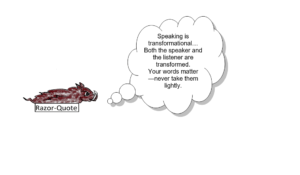
As you read each of these statements, ask yourself what do you think of the teacher and what do you think of the class?
“Email is generally the best way to contact me. Please make sure to put the nature of your email on the SUBJECT line. In your email put your full name and your student’s ID. I will not recognize you by your email address. If there is nothing on the subject line, I will not open the email.” “My job in this course is not to tell you what to think but to help you think better on your own. Keep in mind that “for every complex problem, there is an answer that is clear, simple, and wrong.” By stirring up the waters of easy and taken-for-granted explanations and showing how our world is but one of many possible socially constructed realities, sociology often makes what is familiar seem strange, and what is strange seem more familiar. In so doing, sociology helps us to see the world more clearly and with greater empathy for others. I hope you enjoy the journey, and I am honored to be your guide this quarter.”
When considering the emotional tone of your emails and your syllabus. Ask yourself these questions:
- What is the tone of your syllabus? angry? punitive? friendly? open?
- Does your syllabus read like a legal contract full of rules and punishments?
- Do your emails feel like they are from a teacher who cares?
- Do you use-friendly and inviting language. Do you use “you” instead of “students?” For example, “You will learn to discover” as opposed to “students will discover.”
Setting the Emotional Tone
One of the ways that I set the tone on my syllabus is to include my teaching philosophy :
My Teaching Philosophy Why I Do What I Do and Why it Should Matter to You
- I believe that teaching you is one of my greatest adventures. I LOVE to teach. Teaching is my hobby. It is not the job that I have to do –it is the hobby that I want to do. Working with students is truly one of my greatest joys. If you need help, please come and visit me. I consider it a privilege to work with you one-on-one to develop your full potential.
- I believe that this class will make a difference in your life regardless of your major. This class will be relevant. Improving your public speaking skills will improve your confidence in many areas of your life.
- I believe in being student-centered. I will teach the class with you in mind and will try to let you know not just what to do but also tell you why you should do it to help yourself grow as a speaker.
- I believe that learning should be fun. I intend to make this class enjoyable. The more you smile in class, the more you smile when you think about public speaking.
- I believe you should have your own ideas on things, but you should always ask why you believe the way you do. My goal is never to “lead you to Lynn” but rather to make you challenge your assumptions. I want you to dig deep and learn to find credible information on topics so that you can decide for yourself what you think and feel about a given subject. With that said, whatever you believe, I will play “devil’s advocate” to help you to think of all sides of an issue. If I do this right, you will never quite know what I really believe on an issue.
- I believe in stories. I believe that by connecting content with stories, the information will be more relatable and more memorable. I won’t waste your time with random stories but rather challenge you to engage with concepts thru stories.

THE POWER OF PRESENCE
You set the mood for your class the moment you walk into the room. Look confident, be organized, engage students. When you walk into class, make eye contact, smile, and greet students.
Ask students questions where the answer focuses on the positive: “Are you working on anything exciting lately?” “What is the most interesting thing you have learned in one of your other classes?” Notice how these types of questions have the students call to mind positive things. I have found this particularly helpful on the day that students have a big assignment due. Sometimes they feel overwhelmed by the workload so I help them reframe the situation: “What is an interesting thing you learned when studying for this test that you would have overlooked otherwise?” “I know you had to watch a lot of speeches to find what you need to complete today’s assignment, what’s the most interesting speech you watched?” Both of these questions help them focus on the learning rather than the work.
In online classes, students want to feel your presence. Sending a weekly email or adding a little personal story to the weekly lesson helps them to connect with you. Students want to feel like you care about their well-being. Make sure as an online teacher that you connect with your students and you don’t just give them a list of things to do.
Presence In Online Course
There are many ways to be present in an online course. Some of my colleagues make weekly videos for their students, others use various programs to create video discussions. The goal here is not to do it someone else’s way, but rather to find what fits your personality, your topic, and your class. Since I’m a storyteller, I tell stories.
I teach an online course in nonverbal communication. Every week, a folder opens up in the learning management system and my students complete the work in the folder. Every week. I write them a little personal story that relates in some way to the content for the week. According to student feedback, this makes them feel like they know me personally and it helps them connect the content to the “real world.” Here is an example of one of my weekly posts.
Welcome to the wonderful world of nonverbal communication. I’m sitting here watching my cat laying around and swishing her tail. It makes me wonder if she does that on purpose. I wonder if another cat would think it means something, or if it means nothing at all. I realize as I sit here, I keep pausing to think of the next word to type and I find myself bouncing my leg and sometimes even biting my lip a little. No one is here to see me do these things so it can’t possibly mean something to someone else. But if they were here….what would they think? Would I be communicating with them?
We will start our journey by thinking about when nonverbal communication is biological and innate and when it is learned and why it matters. Last night, I was playing a game with my college-aged sons and their girlfriends. The game is called Exploding Kittens (I highly recommend it–no cats are actually harmed). I pointed at my youngest son who was leaned back in his chair with arms crossed and a certain head tilt and I whispered to my husband, “Who does he look like?” At that moment, he looked just like my husband’s younger brother. Funny thing is that my son hasn’t been around his uncle very much and yet there he was holding himself in some of the same ways. Could it be biological?
I hope your mind is ready to question everything and wonder about every move that you and others make. I am glad you are here and I know that I have many interesting things to teach you, so let us begin.
MANAGE THE DEAD AIR
Years ago, someone loaned me an old VHS tape that looked like it was made in the 1970s. In the video, a teacher walked into the class and shuffled file folders on the desk. The students looked up at the teacher in boredom. The teacher dug through a briefcase to find the chalk and lay it on the chalkboard. Students wiggled in their chairs in boredom. The teacher finally speaks to the class saying, “Raise your hand and say ‘here’ when your name is called.” The students slump in their chairs in boredom. The teacher opens a file folder and says, “Come up here and get your paper when I call your name.” The students slowly, one at a time, move to the front of the class to collect their papers, while the rest of the students lean back in boredom. When the teacher finally begins to lecture, the students are so disinterested and bored it appears as if the teacher will never be able to get them engaged. The scene fades and a commentator asks, “What does the first of your class look like?”
If someone were to record the first of your class, what would it look like?
When I worked as a radio DJ, we had a phrase—”dead air kills.” That phrase meant if we had time on the air that wasn’t filled with talk or music, our listeners would change to another station. A good DJ learned to manage the moments between the content. This is also true of teaching, engaging students means that you manage those transitions. If you have “dead air” while you are shuffling through the calendar, trying to find something on the computer, or fussing with your slides, then students’ brains go dead–they symbolically change to another station. You can often visibly see the change because they grab for their phones and start scrolling while others take on a zombie-eyed glaze. Have a plan to keep them engaged. When I am driving to school and when I am walking to my class, I visualize these transactions to help me create a seamless delivery when the time comes.
Here are a few ways that I manage “dead air” (I use different ones for different classes …not all of these at once).
- I play music playing at the beginning of class that connects with the lesson.
- I ask a student to come to the front and write on the whiteboard “Things to do this week. ” I work on organizing my slides and papers while the whole class mentions activities, outings, concerts, and museums that the volunteer writes on the board.
- I have a list of discussion prompts to stir small talk. “Talk to your neighbors about where to get the best salsa in town.”
- I have opening slides with logic puzzles they have to figure out. I then make my opening point with the puzzle.
- I have prompts on the first slide that asks them to review a theory from the previous class with a classmate.
- In my persuasion class, I have commercials playing at the first of class related to the day’s lesson.
- I never pass out papers at the first of class. If they are working in groups or doing pair-share, I pass papers out then. Sometimes, I fold homework in half, put their names on the outside, and place them on a table. I stand by the table at the end of class (to make sure they only get their own paper) and then I greet them with a smile as they pick them up on the way out the door.
- I have prompts on my slides about how to get into discussion groups and what to do while they are there so they can transition quickly.
- On days that we will have activities in class, I email some instructions out the day before, so everyone knows what to do when they get to class.
- If someone asks a question where the answer only relates to them and not to the group, I invite that person to speak with me after class instead of using up class time.
Thoughts on Attendance
There are thoughts on both sides about whether or not attendance should be required, and it is too big of a topic to debate here. I do, however, want to make a few suggestions for those who want to take attendance. These are things that have worked for me and things that my colleagues do that works well for them. For example, I have a colleague, Kasey Walker, who makes roll fun. Instead of saying “here” she has students answer the daily question; Students have to say their favorite dessert, which animal they are the most like, or what their favorite binge-worthy show is currently. I know several faculty members who use the clicker system for students to use every class to record attendance.
I am a big advocate of rewarding attendance but have had a recent conversion. I had a change of heart when I heard a friend say they didn’t like to award “butts in seat” but rather “minds at work.” After I considered this, I changed my method from checking roll to rewarding action. I teach a variety of classes from small interactive ones to large lecture ones, and I want to share with you some of the ways that I reward “minds at work.”
In my smaller classes (20-30), I take attendance while students are doing a pair-share or group discussion which rewards them for working with others. In some classes, I may have a one-minute paper where they write a reflection of what they learned that day that earns them discussion points. In my large classes (150 students), I do lectures on Monday and Wednesday, and they do group work on Friday related to the topic. A leader from each group submits a report who attended and what the group accomplished. In my larger classes, (150 students), I have a quiz programmed into the learning management system (Blackboard) that I open sometime during the class. The answer to the quiz will be something that was discussed in class. They earn one attendance point if they get the answer wrong and two points if they get it right. Anyone who missed class on days points were earned can write me a two paged paper on the topic discussed that day. Students like it because it if “fair.” It encourages participation while acknowledging that students have lives and they sometime have to miss class.
START STRONG
I teach my speech students that all speeches should begin with a good hook. I strongly believe that this principle applies to lectures as well.
Here are a few ways that I “hook” students:
- Bring in a news item that relates to the topic.
- Ask a thought-provoking question.
- Bring in an object and talk about it.
- Have a game that is related to the topic.
- Show a slide that makes students think.
- Play a song and make them guess why it relates.
- Do a myth buster series of questions on the topic.
- Tell a story and then tell why it relates.
- Have them review previous class concepts in pairs.
There is an entire chapter dedicated to how to creative ways to begin a speech. All of these strategies also work for how to start a college class. You can review that chapter here.
CREATE CURIOSITY

I walked into class one day and my college teacher had the table covered with magazines, advertisements, cartoons, and books with passages underlined. He asked the class to look at what he had displayed and to figure out what they all had in common. We examined the materials, we talked amongst ourselves, and we figured it out–all items on the table made a reference to the Illiad or the Odyssey. We sat down in our seats and took out our notebooks. This was a class on college teaching, and we had been talking about how to relate to our students. Dr. Hammons asked us, “If you had never read the Illiad or the Odyssey , would you have understood what was funny about this cartoon? Would you have gotten the reference in the ad?” He went on to talk about how students are not all reading the same books, how they are not watching the same shows, nor listening to the same music, and how that makes it difficult for teachers to use cultural references in class that all students will understand. It has been over 20 years since I participated in that activity, and I still remember what we did and what it meant. Creating curiosity can be very powerful and very memorable. If you can create a hunger for your students to know the answer, you have their attention. Curiosity is important for cognitive development. Don’t always tell them the answer, let them struggle to figure it out from time to time. You can do this at the beginning of your class, or you can work it in throughout.
- Why does your napkin stick to your glass?
- How do we know if we are born to smile, or we do it because we learned it from our caregivers? Why does it matter?
- Why did they have face shields in castles in Ireland?
PREVIEW THE TOPIC

Students learn best when they know what you will be talking about that day. We hope that they did the reading and that they read the schedule and the syllabus …but… just in case they haven’t (wink, wink)… it is good to say, “Today we will be talking about …” Tell them not only WHAT they will learn but WHY it matters. Write the lesson topic and assignments on the board (or put them on your slide) AND tell them what you will be talking about AND why it matters.
Preview by Writing on the Board (or making a slide):
Today’s topic: Listening What is due : Blackboard quiz due tonight by midnight
What is next: Wed: Read research chapter before class Fri: Exam one—bring a scantron
Preview by Saying: “Today, we will talk about listening, I love this topic because it relates to everyone regardless of major. By improving your listening skills, you can make better grades, improve your relationships, and you can improve your chances in the workplace.”
SO WHAT, WHO CARES?
Students want to know why this topic relates to them. You should remind them daily that what they are learning can help them during their college experience and beyond. They are so much more motivated to learn when they think it matters.
TIPS FOR PRESENTATION SOFTWARE
I am convinced that slide shows are the greatest teaching tool and the worst thing that has happened to education. Let me explain. Projected slides are helpful to give students key terms to write down so they have organized notes. Projected slides can help focus the students’ attention and can show pictures of things to help them understand. The problem is that many teachers use them poorly. In my first semester of teaching, I put all my notes on my slides and then stood there and read them to the very bored students. My students complained that their hands were getting sore from all that writing and that I spoke faster than they could write.
I realized that this should not be a class in speed writing. I realized that students who are rushing to write it all down aren’t taking the time to think about things. I realized that my slides should never be my teaching notes. I realized that if my slides had all the content, what was the point of me talking–I should just send them the slides and shut up.
I think we need to ask ourselves as teachers, “What do I want my students to learn today?” After we answer that, we determine the best way to get that information to them. Just because slides are an option, it doesn’t mean we have to use them every day and for every point. The idea here is to be purposeful with your slides.
Here are some general rules about slide usage:
- 6 x 6 (no more than six words down and six words across). Any more words and students spend all their time writing.
- High contrast—dark backgrounds with light letters or light backgrounds with dark letters. It may look good on your computer at home, but it may not project well. Always go for maximum contrast.
- 28 point or larger font size. (If you are using a small font, it may indicate you have too many words on your slides)
- The plain font is easiest to read when projected: Arial, Tahoma.
- Every time you use presentation software, you are modeling for your students what to do when they give class presentations. Look at your slides, are you modeling good behaviors?
- Show a blank slide or use the blank button when you want the students to stop writing and listen to you.
Pictures on Slides
When I teach students how to use presentation slides, I show a funny picture of a politician that is screaming and holding a cat. Beside the picture is three sentences about the history of PowerPoint. I leave the slide up for a few minutes and then blank it. I ask students, “What did the words say?” Usually, they can’t tell me. Pictures can influence how the content is received. People retain more information when the picture on the slide supports the message they are hearing. John Medina, author of Brain Rules says, “We are incredible at remembering pictures. Hear a piece of information, and three days later you’ll remember 10% of it. Add a picture and you’ll remember 65%.” The key is to make sure the picture you are showing match the content of your slide. If you want to show a funny picture or cartoon, go for it, it can be very engaging. Just make sure the funny photo is on it is on its own slide and not a content slide. When you use pictures, always go for a creative commons license, and make sure to reference your photos. Most universities have strong academic honesty policies that require students to cite their sources and warn them against stealing other people’s work, we need to model integrity.
Make all students feel included by diversifying your slides. If you use photos of people on your slides, be intentional and show people of different races, ages, and abilities.
There is an entire chapter dedicated to using Presentation Slides here.
I’VE NOTICED THAT
Here is a wonderful trick to engage and motivate your students. Point out the good that they do. Point it out before class, email them a note, talk to them after class. One of the greatest phrases is…”I’ve noticed that.”
“I’ve noticed that you seem to enjoy this subject.” “I’ve noticed that all your hard work is paying off and your speeches just keep getting better and better.” “I’ve noticed that you are the encourager of the class.” “I’ve noticed that this class can get a little silly but that it seems to always mix that with high grades.”
After exams, I always notice who made A’s on the exam. I send those students a quick email saying, “I’ve noticed that you made an “A.” Great job acing the exam. I know that other students would like to learn your study strategies. If you let me know how you studied, I can share with others so they can do well too.” This is a win, win. Students love to be acknowledged in this way and they also like to tell you about their process. You can share that process with others to help them improve their study skills.
After the second exam, I send encouraging emails to any students who have at least a 10-point improvement. The subject reads, “Way to Improve!”
DISCUSSION TIPS

When students talk about the material, it gives them a chance to “own” the information. We can help students have productive discussions by helping them be prepared, making them be accountable, and create opportunities where they are given a chance to speak:
- Be prepared . Make sure everyone has information on the topic. Sometimes students don’t discuss because they don’t have any knowledge of the subject. On days where students will be discussing topics, I have a reading quiz at the beginning of class to encourage them to read the material before class so they are prepared. In larger classes, I use the Learning Management System (in my case, Blackboard) to incentivize students to read. I have a quick content quiz programmed and it opens the first five minutes of class. In other classes, I require them to do independent research on the day’s topic (for a quiz grade.) For example, I might say, “On Wednesday, we will be learning about how to give a persuasive speech. To prepare for our discussion, each person should have read three articles for why we should legalize recreational marijuana and three articles against this topic. You must type out the major points for each side before coming to class. This will be worth ten points.” (Students are much more motivated to come to class discussions prepared when there is some type of accountability.)
2. Be given a chance to speak. Make sure everyone who wants to share has a chance to speak. Oftentimes, one person dominates the discussion. To correct this, you might say, “Set a phone timer and give each person two minutes to say their view on the topic. After everyone had said their two-minute opinion, the group can open this topic up for full discussion.” Encourage students to invite quiet members to join the conversation. Some students may have great ideas but won’t share them unless asked directly by their peers.
My favorite strategy is to appoint a leader whose job is to encourage participation. At the end of the session, the leaders send in a report summarizing the discussion.
3. Be accountable. You need to tell students the parameters and expectations of the discussion.
- After ten minutes, I am going to ask each group to highlight the two main ideas that the group discussed.
- After discussing, I want you to summarize your ideas in three sentences that you will share with the class.
- At the end of class today, each group leader will submit a report about the learning outcomes from today’s discussion.
4. Debrief. Discussions, pair-share, and group work can be just busy work unless you allow students to debrief the activity and make connections. This can be done in several ways.
- Students write a reflection paper on how what they did and how it connects to the material.
- The teacher asks students what they learned. The teacher takes the feedback from students and elaborates to help them make connections.
THINK PAIR SHARE
Tell Them What You Expect
You need to remind your students of the expectations you have for discussions such as respecting different opinions and sharing the talk time. This information should be in your syllabus, and you should remind students of this as they begin discussions.
Jennifer Veilleux, who teachers Abnormal Psychology (and makes her syllabus look like a party invitation) says this on her syllabus:
Agreeing to take this course means agreeing to be respectful of your classmates and me, your instructor. No one likes a party guest who trashes the place or insults the other guests, and that is particularly true of this course. We will be discussing sensitive material which can be very y personal for some people, so rude jokes, insults, etc. will result in you being asked to leave class that day.
Katherine Zawisza, who teaching Philosophy Reasoning and Discover includes this on her syllabus:
We will be discussing many controversial and sensitive topics in this course as we assess arguments. While we all feel strongly about our views, it is important to be respectful and courteous to others with different views. Having said that I will not tolerate hateful or disrespectful speech in class. This class is an opportunity to provide thoughtful and well- founded arguments for our beliefs. I will expect you to be able to defend your views. We may not agree with the positions we assess and we do not have to, what we do need to do is assess evidence, provide reasoned arguments, and apply what we are learning. We all want to be right. This class should help you by providing as many tools as possible to get at the truth.
TO GET GOOD ANSWERS, ASK GOOD QUESTIONS
I’ve asked questions in class only to have everyone cast their eyes to the floor. Silence. Since then, I have learned there is an art to asking questions and a skill to eliciting feedback. I’ve included several important factors that encourage student interaction.
1. Make students feel safe. Students are afraid of saying the wrong answer (for that matter so am I) so it is important you let them know it is OK to get it wrong. They will watch to see how you manage when others get it wrong to decide if you are critical and to see if other’s laugh. How you manage those early interactions will set the tone for the rest of the semester. I often tell my students, “I’m not trying to ‘lead you to Lynn’ on this topic, I just want to stir the pot and hear what others think. On this topic, there really is no bad answer.” If the question does have a right or wrong answer, I might say, “Dave was brave enough to get things started, he’s not quite there, who is willing to add a little more information to nudge us closer?”
2. Don’t write stupid questions. I find that silence most often happens when I have badly written questions. To help me write better questions or to help them understand my question, I write them on the slides or the whiteboard. The act of doing that helps me refine my question, it helps everyone know exactly what I am asking, and it helps them take better notes.
- The question, “What is listening?” doesn’t inspire discussion.
- The question, “What are some signs that someone is not really listening?” gets a discussion started.
- The question, “What are your pet peeves about those who pretend to listen?” really gets them discussing.
3. Model the answer. Sometimes, modeling the answer gives them the push they need. “If you were to ask me, what makes a great teacher, I would have in mind, my favorite teacher. I would think of Dr. Bigby who seemed to have so much passion for the subject that I couldn’t help but be engaged. What do you think makes a great teacher?” Note: This works especially well with online discussion forums. I always write out model answers the first two discussion assignments and then I get well-thought-out, detailed answers for the rest of the year.
4. Give them time to think. If you ask a question to the class, usually the class clown or the outspoken student answers. Some students have equally good or better answers but if they know someone will answer for them, they will never even take time to think. Say, “I want everyone to think about this question for a moment, and then I will ask for comments about it” or say, “Write down what three attributes you think make up a good relationship? I will give you a minute to write them down and then call on someone to share.” Asking them to write their answer or telling them you will call on someone encourages everyone to have an answer read and not just wait for the fast talker to answer.
5. Wait 30 seconds. If no one answers when you ask a question, stand there and wait. The silence is uncomfortable for you and for them so usually someone answers. I count to myself silently to help me be patient. If no one answers, repeat the question and say, “I’ve been told that if I wait long enough someone will answer.” Usually, I have someone talking by the time I am done with my sentence. Finally, using the nonverbal hand gesture, come over here, pulls the answer from them. (No kidding, it works).
6. Sing until they answer. The worse I sing, the faster they answer. I’ve also been known to hum the jeopardy song until someone answers my question.
7. Encourage them to be brave by rewarding effort . Make it a safe place to risk being wrong. “I like that you were brave to answer and that you thought about it, you’ve got us thinking but you are not quite there. Who else can add another piece to this answer?” If they seem close enough, you might give them some leading material to get them to the right answer. Education is about the process of pushing yourself and this comes from being open-minded enough to test ideas. We want students to learn to be brave to test out their ideas.
8. Bribe them with gifts . I’ve been known to bring them fortune cookies and once I even bribed them with extra squash from my garden. Intermittent rewards work better than consistent ones. My colleague, Kasey Walker, buys rolls of tickets (like you get at a carnival) and gives them to students who answer her questions. They turn in their tickets for their discussion grade.
CREATIVE WAYS TO CALL ON STUDENTS
One of the classes that I teach is nonverbal communication. In that class, we look at how people take physical cues from others and from the environment when deciding to interact. For example, I’m more likely to call on a student who is making eye contact. I’m more likely to ask a student who looks engaged. Even though I try not to, I tend to call on the person who sits to my left about two rows back. I realize that certain individuals because of cultural or interpersonal challenges may not make eye contact so I am less likely to call on them. I know these things, so I try to find better ways to call on students. Ways that are equal and fair.
- Say, “Tom” at this point Tom looks up in fear. “Point to someone in class.” Once Tom points to Julie say, “Ok, Julie, Tom pointed to you because he thinks you have the answer, let’s see if he is right. If Julie has no answer, it goes back to Tom. This mixes up who gets called on and builds a fun camaraderie in the class.
- Ask a student to pick a number from one to eighteen (assuming that’s how many students are in class). When they give you a number, look at your roll sheet and call on the person whose name corresponds.
- Write students’ names on paper or popsicle sticks. Draw one out and call on that name.
- After a think-pair-share or group, discussion say, “Point to someone in the room who has a thought-provoking example.” Ask that person to share. (It makes them feel good that their friends think they had a good example.)
- “I think we need the perspective of someone in yellow. If you are wearing yellow, please tell us what you think on this topic.”
- Ask students to think of their favorite superhero/villain/ cartoon character and answer the question based on what superman would think of the topic. They have to raise their hand if they have a good superhero answer.
- When I teach in a large auditorium, I run up the stairs and say, “I need an answer from someone in this row.”
- University of Arkansas teacher Tina Howlett gives each student a candy or colored marker. She randomly calls out a color or candy name and that person answers. That person then gets to pick the next color.
DEALING WITH INAPPROPRIATE BEHAVIOR
Sometimes students are speaking out just to get a laugh from friends. When that becomes disruptive, it is important to respect the students who are missing out on a good education for the sake of one obnoxious student. If I have a student who continues to be disruptive, I ask them to come and meet with me in my office. Meeting me in my office takes away the “audience” and it helps me get to the heart of the situation.
- Can you tell me where you got that information?
- What does the research say about that topic?
- Could you connect what you just said to what we had to read for today’s class?
- Sounds like a great conversation for another time.
- Ouch, that kinda hurt my feelings. What did you mean by that?
Food for Thought from an article in the American Journal of Educational Research: “Instructional research suggests that there may be teacher “misbehaviors” that foster or invite student misbehavior…. ‘most frequently cited misbehavior types were sarcasm and putdowns, absent, strays from subject, unfair testing, and boring lectures.’”

THE CURSE OF KNOWLEDGE
I’m so sorry. If you were my student the semester after I graduated from graduate school, I really need to apologize. I need to apologize for using my graduate student vocabulary in your freshman course. I need to apologize for telling you about the detailed educational philosophy behind everything I did. I am so sorry I used the words “pedagogy” and “learning objectives” in the lectures about how to give a good speech.
In my defense, most new teachers do this especially ones right out of school. I can remember having an English teacher who was finishing up her dissertation–she baffled me with her brilliant vocabulary and impressed me with her cerebral lectures. I have no idea what she said, but at least she sounded smart while saying it.
We do this because of the curse of knowledge. Actor and communication expert, Alan Alda in his book, If I Understood You, Would I Have This Look on my Face says,
Once we know something, it’s hard to unknow it, to remember what it’s like to be a beginner. It keeps us from considering the listener. Using shorthand that is incomprehensible to the other person, or referring to a process they’re unfamiliar with, we lock them out, and we don’t even realize it because we can’t believe we are the only person who knows this stuff.
The problem is people are “unable to ignore the additional information they possess,” according to economists Camerer, Loewenstein, and Weber. These researchers questioned whether or not it was beneficial to know more when it came to sales. In short, their finding was that it is not beneficial. If you know too much information, it is hard not to use that information and too much information can be overwhelming. It is hard to remember what it was like before you had that knowledge. It is hard to put yourself in the mind of your audience who does not understand. Sometimes, knowledge is a curse.
Go to one of your friends and ask them to help you with a little experiment. Ask them to “guess this song” and then tap out the tune to the “Star-Spangled Banner” with your finger. Did they guess it? Chances are they can’t. Try another common song like “happy birthday.” Chances are that as the tapper, you are going to get frustrated because it is so obvious and so easy to guess, but most people just won’t get it.
This is a mock-up of what a graduate student at Stanford did. Elizabeth Newton first asked how likely it would be that the person listening would guess the tapped song. They predicted the odds were about 50 percent. The guessers got it right only 2.5% of the time. What seemed obvious to the tapper was not obvious to the listener. You can see where this is going.
When it comes to engaging students, we need to try to remember what it was like when we were in their shoes. Since I teach speech, I try to remember what it was like to be scared before a presentation. I tell the story of one of my worst presentations ever and how I felt. When I teach advanced theory classes, I try to remember what it was like the first time I had to read an article in an academic journal (it was miserable, and I thought “why would anyone ever write like this on purpose?”). When I teach my students how to read articles, I try to remember my frustration. Yes, I need to teach my students advanced vocabulary, but I need to start with words they know to lead them to the advanced place.
FOSTER A GROWTH MINDSET
In her book Mindset: The New Psychology of Success, Carol Dweck emphasizes the importance of fostering a growth mindset instead of a fixed mindset. A fixed mindset assumes that a person either can or can’t do something. A growth mindset assumes that with work, tenacity, and practice that people can get better.
I teach public speaking and students often come in with the attitude of…. “I can’t do public speaking” or “I’m bad at speaking.” Both are fixed mindsets. They emphasize that a person can’t change what they are. We can help our students to embrace a growth mindset so they can allow themselves to grow and learn. I tell my basic communication students several times during the semester, “I hope you mess up this semester.” They all look at me confused and astonished. “I hope you mess up so you have a great story to tell of the time that you really blew it and recovered. Success is not that you are perfect, success is that your recover well. Everyone makes mistakes, this is one of the ways we grow.”
Here are a few growth mindset quotes I want to share with you. These can be helpful to use with your students but they are here for you as well. You are not perfect and you don’t know everything about teaching, but you will continue to get better with practice. I hope you fail at least once so you too can learn to recover well.
It’s not about being the best. It’s about being better than you were yesterday. No matter how many mistakes you make or how slow your progress, you are still way ahead of everyone who isn’t trying. Tony Robbins “If at first, you don’t succeed… you’re normal! Kid President Be better than you were yesterday. Life is 10% what happens to you and 90% how you react to it. Charles Swindoll Courage is like a muscle. We strengthen it when we use it. Ruth Gordon Sometimes what we call “failure” is really just that necessary struggle called learning. May your choices reflect your hopes, not your fears. Nelson Mandela A comfort zone is a beautiful place but nothing ever grows there. John Assaraf Doubt kills more dreams than failure ever will. Suzy Kassem You have not failed unless you have quit trying. Gordon B. Hinckley
Hey teacher, I’m talking to you. There is a chance that you have self-doubt if you are a new teacher or chances are if you are a seasoned teacher, you have made some teaching mistakes. Me too! I have made lots of mistakes. That is how we grow, I just want you to know that this growth mindset section is for you too. We are not perfect yet, but with practice, we are getting better. Samuel Beckett says, ” Ever tried? Ever failed? No matter. Try again. Fail again. Fail better.” Let’s keep getting better and teaching our students to do the same.
Thoughts on Culture
In some cultures, it is considered disrespectful to ask questions. It implies that the teacher did not cover the material well enough for students to understand. You can help students by reinforcing that it is OK to ask questions. You might encourage them by saying, “You might be helping out a classmate by asking this.”
In some cultures, it is threatening for someone to write a message in red ink. For that reason, using a blue or black pen to grade can feel less threatening.
SAVE TIME PUTTING STUDENTS IN GROUPS WITH THESE LITTLE TRICKS
In elementary school, I was always the last one to be picked to be on the dodgeball team– it felt horrible! If we tell students to pick their teams, it often leads some students on the sidelines to feel excluded. It is a terrible feeling to be left out. It is horrible to be the one that no one wants. For that reason, I always assign partners and assign groups. I ask students to count off and then tell all the ones to get in a group in this corner and all the twos to get in a group at the front, etc. By telling them both their group number and where to go, the process is much smoother.
In my 150-student class, I use the Learning Management System, Blackboard, to automatically assign groups. I ask them to look online to see which group they are in before class. On the days they have group work, I have numbers posted all over the room and they have to go sit by their group number.
ASK STUDENTS HOW CLASS IS GOING
Somewhere near the halfway mark of class, you should ask your students how the class is going. By asking in the middle of the semester, you are sending your students the message that you care about their opinions. It also gives you valuable feedback to know if you need to adjust your course. Ask students?
- What has contributed to your learning?
- What has inhibited your learning?
- How has my teaching style helped you to learn?
- What can I do better?
- What is the most valuable thing you learned?

HAVE THEM WRITE A ONE MINUTE PAPER
Near the end of your class, have students write on a piece of paper the most important thing they learned that day. We learn what we retrieve and the more opportunities we offer students to retrieve the information by review and reflection, the more it becomes part of their long-term memory. One of my University of Arkansas colleagues asks: Write down one new idea you had today, one idea that was reinforced, and what will you do differently because of what you learned. Another teacher asks students to write about connections. How does what we learned connect with your family? Your career? Other classes you are taking?
Some teachers will have students keep their one-minute papers and turn them in at the end of the semester while others will collect them each class.
One college teacher put it this way: “What’s in your doggie bag? What will you take home with you after class?”
TELL A STORY
The human mind seems exquisitely tuned to understand and remember stories— so much that psychologists sometimes refer to stories as ‘psychologically privileged,’ eaning that they are treated differently in memory than other types of material. Daniel Willingham, Cognitive Psychologist
Every subject can be storied in some way. It could be the story of how the theory was discovered, the story of the first time you encountered the information, the story of how the topic is used in everyday life. Stories are easier to remember because it engages emotions as well as their sense of logic. If you tell a story in such a way that they see it in their mind’s eye, it can even activate their visual centers.
If you do tell a story, make sure your students get the connection. I listened to a group of students complain about one of the teachers who always went off on random tangents about irrelevant things. As luck would have it, I ran into that very teacher. She was telling me that her classes were going great and her students really liked her stories and how that she thought they were learning so much more because of it. She thought her stories were obviously connected to the material, but the students thought she was just off-topic. Always make sure you make a clear point after your story. I actually have a slide that says, “What’s the point…” to make sure my students get the intended message.
FIRST TIME TEACHING? IF YES, THINK ABOUT THESE THINGS
If you are a first-time teacher, welcome aboard! So glad you are here. I have a few thoughts for you.
- Consider the impact of how you dress. Students make initial decisions about how knowledgeable and how approachable you are based on how you are dressed.
- Decide in advance what you want students to call you. Are you Lynn, Mrs. Meade, Dr. Meade, or Professor Meade? Let them know what to call you by putting your name on a slide or writing it on the board. When you send them an email, make sure you use that same name so they remember how you want to be addressed. If you are a teaching assistant who is close in age to your students, it can be helpful to go for the formal title, “Mr. Smith” instead of “Joe.”
- Decide in advance your policy on phone usage. Have it on your syllabus and make it clear to them what it is that you expect.
- If you are scared that students will ask you a question that you can’t answer, you are normal. All first-time teachers worry about this and most long-term teachers still worry about this. When this happens, simply say, “That’s a great question, let me get back with you.”
THINGS I LEARNED THE HARD WAY

1. If you say, “You may leave when you are done,” everyone is suddenly done, and a mass exodus occurs.
2. If you change a deadline, many students are frustrated because they worked hard to meet the deadline. A few will be relieved, but others will resent you for making exceptions for the slackers.
3. Cancelling class early equals heartache down the line. If you let them out early one day, they will keep expecting you to do it again.
4. If students have presentations, let them draw speech numbers out of the hat and then let them work out any changes that need to be made. That puts everyone on equal footing. Students appreciate you being fair.
5. Not everyone expects “A’s” and giving “A’s” to those who didn’t work for it diminishes those who worked hard. Be clear about your expectations and make sure an “A” is something they earned.
6. You can always loosen up the rules, but students rarely tolerate it if you become stricter.
7. Avoiding students’ bad behavior does not make them go away. Allowing them to take over your class is unfair to those who are there to learn. Talk to students privately about their behavior. Never sacrifice the attentive students who want to learn for those who are just trying to distract.
8. Be sure that you create a place where students feel like they can openly share ideas. Keep reminding them you care. Mentioning it on your syllabus is not enough.
9. Use examples from different cultures and lifestyles. Make sure your slides include people of differing races, genders, and abilities.
10. On your tests, use names that reflect diversity. (I like to use my students’ names)
11. Never talk with a student about grades in the classroom. Always tell them to meet you in your office. It protects their privacy and shows the entire class that you are open to talking with them and that you respect their privacy. (When a student is upset because of their grade, they need to cool off. Meeting in your office gives them time to cool off as well as takes away the audience if they are the type of a student who is performing for their friends.)
12. Before meeting a student about grades or policy issues, ask them to read the syllabus, read the assignment, and review the rubric. Tell them you want them to be ready to talk about specific items of concern.
Final Thoughts
When I go to teacher training or read educational books, I write tips on notecards. One idea per card. I have a giant stack of these that I pull out each year as I’m preparing my class. Many of the suggestions that are in this chapter are from my stack of cards. Tom Jensen, professor of marketing called teaching “the art of thievery” in that the best ideas are stolen from other teachers. I have passed on my thievery, and it is my hope that you will steal some of these ideas, make them your own, use them to engage your students, and then pass them along.
BONUS FEATURES
You may be here because you are teaching public speaking or you may be here because this link was given to you to reference this as a stand-alone resource. Either way, this information can work for you.
This is a chapter in a public speaking textbook. A lot of what we learn in public speaking applies to teaching–in many ways, a lecture is a long speech. Here are a few chapters that may also be helpful for you as you prepare to teach.
Overcoming Communication Apprehension by Hacking Your Body
Overcoming Communication Apprehension by Hacking Your Brain
Delivery Advice: Do Not Imagine the Audience Naked! Managing Eye Contact, Movement, and Gestures
Why Your Voice it The Most Important Part of Your Speech
Don’t Ruin a Good Presentation with Terrible Slides
Alda, A. (2017). If I understood you, would I have this look on my face: My adventures in the art and science of relating and communicating. Random House.
Butler, A. C., & Roediger, H. L. III. (2007). Testing improves long-term retention in a simulated classroom setting. European Journal of Cognitive Psychology, 19 (4-5), 514–527. https://doi.org/10.1080/09541440701326097
Drummond, T. A brief summary of the best practices in college teaching: Intended to challenge the professional development of all teachers. North Seattle Community College. https://www.clemson.edu/assessment/documents/best_practices_college_teaching_Drummond.pdf
Dweck, Carol S. (2008). Mindset : The new psychology of success. Ballantine Books.
Howlett, Tina (2018). Personal email. (Director of Curriculum and Instruction, University of Arkansas).
Koh, A.W.L., Lee, S.C., & Lim, S.W.H. (2018). The learning benefits of teaching: A retrieval practice hypothesis. Applied Cognitive Psychology , 32 , 401-410. https://doi.org/10.1002/acp.3410
Perry, J. (2020). Campus conversations: Exercising temperance in an intemperate time. University of Arkansas presentation.
Kearney, P., Plax, T. G., Hays, E. R., & Ivey, M. J. (1991). College teacher misbehaviors: What students don’t like about what teachers say or do. Communication Quarterly, 39 , 309-324
Kral, T. (2018). Three-minute teaching tips at the University of Arkansas Teaching Camp. Mt. Magazine, Arkansas. August 2018.
Marsh, E., & Eslick, A. (2009). Educational Horizons, 87 (4), 206-210. Retrieved February 3, 2021, from http://www.jstor.org/stable/42923769
Medina, J. (2018). Brain rules. http://www.brainrules.net/vision
Teven, J.J.( 2001). The relationships among teacher characteristics and perceived caring. Communication Education, 50: 159–169.
Willingham, D. (2021) Why don’t students like school? A cognitive scientist answers questions about how the mind worked and what it means for the classroom. 2nd edition. Jossey-Bass.
Zepke, N., & Leach, L. (2010). Improving student engagement: Ten proposals for action. Active Learning in Higher Education, 11 (3), 167-177.
Zull, J. E. (2002). The Art of Changing The Brain: Enriching The Practice of Teaching by Exploring The Biology of Learning. SCHOLE: A Journal of Leisure Studies and Recreation Education, 24 (1), 181.
Public Speaking by Lynn Meade is licensed under a Creative Commons Attribution 4.0 International License , except where otherwise noted.
Share This Book

Speech on My Teacher
Your teacher is a guiding light, shaping your mind and character. They inspire, challenge, and encourage you to reach for the stars.
Think about your favorite teacher. What makes them special? This topic explores the significant role of teachers in our lives.
1-minute Speech on My Teacher
Ladies and gentlemen, today I want to talk to you about a very special person, my teacher. My teacher is not just an educator, but also a guide, a mentor, and a friend. They have a heart full of understanding and a mind bursting with knowledge that they are eager to share with us.
Every day, they stand in front of us, ready to impart wisdom. They teach us about numbers, words, science, and history. But that’s not all. They also teach us about life. They show us how to deal with problems, make good choices, and be better persons. They help us understand the world around us and our place in it.
My teacher is patient. They understand that we all learn at our own pace. If we make mistakes, they don’t scold us. Instead, they show us how to learn from these mistakes. They know that making mistakes is just a part of learning and growing.
With their kind words and helpful advice, my teacher inspires us. They encourage us to dream big, work hard, and never give up. They believe in us, even when we have doubts about ourselves. With their guidance, we learn to believe in ourselves, too.
My teacher is not just a teacher. They are a guiding light that helps us navigate through our learning journey. They are a hero, working tirelessly to make sure we grow into the best versions of ourselves. We may not always say it, but we are grateful for everything they do for us.
In conclusion, my teacher is a true blessing. They are shaping not just our minds, but also our hearts. And for that, we thank them.
Ladies and gentlemen, let’s give a big round of applause for my teacher, and all teachers around the world.
Also check:
- 10-lines on My Teacher
2-minute Speech on My Teacher
Ladies and gentlemen, boys and girls, today I will talk about a very important person in my life, my teacher.
My teacher is like a candle. She burns herself to give us light. She wakes up early in the morning, prepares her lessons, and comes to school with a bright smile. She is always ready to help us, guide us, and support us in our studies.
My teacher is like a gardener. She helps us grow. She waters us with knowledge, removes the weeds of ignorance, and adds the fertilizer of wisdom. She takes care of us like fragile plants in a nursery. She helps us to grow strong, to stand tall, and to bloom into beautiful flowers of success.
My teacher is like a sculptor. She shapes our mind and character. She chisels away our rough edges, smoothens our rough spots, and polishes our skills. She helps us to become the best version of ourselves. She makes us into beautiful works of art, ready to be displayed in the gallery of life.
My teacher is like a lighthouse. She guides us through the stormy seas of life. She shows us the right path, warns us of the dangers ahead, and helps us to reach our destination safely. She is our beacon of hope, our source of light, and our guiding star.
My teacher is like a book. She is full of knowledge, wisdom, and experience. She opens her pages to us, shares her stories with us, and teaches us valuable lessons. She enriches our mind, expands our horizon, and broadens our perspective.
In short, my teacher is my hero. She is my role model, my mentor, and my guide. She has a great impact on my life. She influences my thoughts, shapes my character, and guides my actions. She inspires me to dream big, work hard, and achieve my goals.
I am grateful to my teacher. I am thankful for her hard work, dedication, and sacrifice. I am obliged for her guidance, support, and encouragement. I am indebted to her for her invaluable lessons, priceless advice, and precious time.
I respect my teacher. I admire her knowledge, appreciate her patience, and applaud her efforts. I acknowledge her role, recognize her contribution, and honor her service. I cherish her wisdom, value her guidance, and treasure her teachings.
In conclusion, my teacher is my guiding star, my source of inspiration, and my beacon of hope. She is my mentor, my guide, and my friend. She is my hero, my role model, and my idol. She is my teacher, and I am proud to be her student. Thank you, my teacher, for everything you do for us. Your teachings will always be a part of us, guiding us through life.
- Speech on My School Life
- Speech on My School Library
- Speech on My Pet Cat
We also have speeches on more interesting topics that you may want to explore.
Leave a Reply Cancel reply
Your email address will not be published. Required fields are marked *
Save my name, email, and website in this browser for the next time I comment.

Effective Speech Writing
The Importance of Theme
- Teaching Resources
- An Introduction to Teaching
- Tips & Strategies
- Policies & Discipline
- Community Involvement
- School Administration
- Technology in the Classroom
- Teaching Adult Learners
- Issues In Education
- Becoming A Teacher
- Assessments & Tests
- Elementary Education
- Secondary Education
- Special Education
- Homeschooling
- M.Ed., Curriculum and Instruction, University of Florida
- B.A., History, University of Florida
Writing speeches for graduation, class assignments, or other purposes consists of a lot more than finding a few inspirational quotes and possibly a funny story or two. The key to writing good speeches lies in using a theme. If you always refer back to this theme, the audience will respond positively and remember your words. This does not mean that inspirational quotes are not important, but they should be integrated into your speech in a way that makes sense.
Choosing a Theme
The first task that a public speaker needs to focus on before they do any actual writing is the message they are trying to convey. My inspiration for this idea came from the speeches of John F. Kennedy . In his Inaugural Speech , he chose to focus on freedom. He addressed many different topics, but always came back to this idea of liberty.
When asked to be the guest speaker at a National Honor Society induction recently, I decided to focus on how an individual's daily decisions add up to reveal that person's true character. We can not cheat in the small things and expect these blemishes to never surface. When the real tests in life occur, our character will not be able to withstand the pressure because we have not chosen the harder path all along. Why did I choose this as my theme? My audience consisted of Juniors and Seniors at the top of their respective classes. They had to meet stringent requirements in the areas of scholarship, community service, leadership, and character in order to be accepted into the organization. I wanted to leave them with one idea that might make them think twice.
How does this relate to you? First, you must decide who will make up your audience. In a graduation speech, you are addressing your fellow classmates. However, parents, grandparents, teachers and administrators will also be present. While you will be focusing on people your age, what you say must be in line with the dignity of the ceremony itself. Remembering that, think of the ONE thought with which you want to leave your audience. Why only one idea? Mainly because if you reinforce a single point instead of focusing on a number of different ideas, your audience will have a greater tendency to remember it. A speech does not lend itself to having many themes. Stick with one really good theme, and use each point you make, your theme reinforcers, to bring that idea home.
If you would like some ideas for possible themes, look at the world around you. What are people concerned about? If you are speaking about the state of education, find one central idea that you feel strongly about. Then return to that idea with each point you make. Write your individual points to reinforce your idea. To return to the graduation speech, check out these top ten themes to use when writing your speech.
Utilizing Theme Reinforcers
Theme reinforcers are simply the points that a speechwriter uses throughout his or her speech to "reinforce" the central idea they are trying to get across. In Winston Churchill's famous commencement address to Westminster College in 1946, we find him emphasizing over and over again the need for cooperation against tyranny and war. His speech covered serious problems with which the post-war world was faced, including what he termed as the "iron curtain" that had descended across the European continent. Many say that this speech was the beginning of the " cold war ." What we can learn from his address is the importance of continually reiterating one idea. The effect that this speech had on the world is almost incalculable.
On a more local note, I used the four requirements necessary to become a member of NHS as my four points. When I discussed scholarship, I returned to my idea of daily decisions and said that a student's attitude towards learning is increased positively with each personal decision to focus on the task at hand. If a student enters a class with the attitude that they want to learn what is being taught, then their efforts will shine forth in true learning. I continued in this vein for each of the other three requirements. Of course, this does not mean that throughout the speech the same words are repeated over and over. The hardest part of writing any speech is to approach the main theme from many different angles.
Wrapping it All Together
Once you've picked your theme and chosen the points you want to emphasize, putting the speech together is fairly simple. You can organize it first in outline form, remembering to return at the end of each point to the theme you are trying to get across. Numbering your points sometimes helps the audience remember where you are and how far you have left to travel before the climax of your speech. This climax is the most important part. It should be the last paragraph, and leave everyone with something to think about. One great way to bring your ideas home is to find a quote which aptly embodies your theme. As Jean Rostand said, "Certain brief sentences are peerless in their ability to give one the feeling that nothing remains to be said."
Quotes, Resources and an Unconventional Idea
Find great quotations and other speech writing resources . The tips found on many of these pages are awesome, especially the strategies for giving the speeches themselves. There are also many unconventional ideas that can be incorporated into speeches. A great example of this occurred during a graduation speech by a Valedictorian which incorporated music throughout. She picked three different songs to represent the students' elementary, middle, and high school years and played them softly while she went through memories for the class. Her theme was a celebration of life as it was, is, and will be. She ended with a song of hope and left students with the idea that there was a lot to look forward to in the future.
Speech writing is all about knowing your audience and addressing their concerns. Leave your audience with something about which to think. Include humor and inspirational quotes. But make sure that each of these are integrated into the whole. Study the great speeches of the past to find inspiration. The joy that you will feel when you have given a speech that has inspired people is amazing and worth the effort. Good luck!
Inspiring Speech Example
The following speech was delivered during an induction to the National Honor Society.
Good Evening.
I am both honored and flattered to have been asked to speak for this wonderful occasion.
I congratulate each of you and your parents.
Your achievements in the realms of Scholarship, Leadership, Community Service, and Character are being honored here tonight by your induction into this prestigious society.
An honor such as this is a wonderful way for the school and community to recognize and celebrate the choices, and sometimes the sacrifices, you have made.
But I believe that what should make you and your parents the most proud is not the actual honor itself, but what you had to do to get it. As Ralph Waldo Emerson said, "The reward of a thing well done is to have done it." Any recognition is just the icing on the cake, not to be expected but definitely to be enjoyed.
However, I challenge you not to rest on your laurels but to continue to strive towards even loftier goals.
The four requirements for membership in which you have excelled: scholarship, leadership, community service, and character were not chosen at random. They are the core of a fulfilled and fulfilling life.
The most important thing to remember is that each of these characteristics are the sum of many individual decisions. They embody a positive attitude backed by purpose. The only way to achieve your purpose is to take small actions everyday. In the end, they all add up. My hope for you is that you will cultivate this attitude backed by purpose in your own life.
Scholarship is much more than just getting straight A's. It is a life-long love of learning. In the end it is a sum of small choices. Each time you decide you WANT to learn something, the experience will be so rewarding that the next time becomes easier.
Soon learning becomes a habit. At that point, your desire to learn makes getting A's easier while taking the focus off of grades. The knowledge can still be hard to gain, but knowing you've mastered a difficult subject is an awesome reward. Suddenly the world around you becomes richer, full of learning opportunities.
Leadership is not about being elected or appointed to an office. The office does not teach someone how to be a leader. Leadership is an attitude cultivated over time.
Are you one to stand up for what you believe in and 'face the music' even when that music happens to be unpleasant? Do you have a purpose and follow that purpose to get the ends you desire? Do you have a vision? These are all questions that true leaders answer in the affirmative. But how do you become a leader?
Each small decision you make takes you one step closer. Remember the goal is not to get power, but to get your vision and your purpose across. Leaders without visions can be likened to driving in a strange town without a road map: you are going to wind up somewhere, it just might not be in the best part of town.
Many see community service as a means to an end. Some might see it as a way to get service points while socializing, while others may view it as an unfortunate (and often inconvenient) necessity of high school life. But is that true community service?
Once again true community service is an attitude. Are you doing it for the right reasons? I'm not saying there won't be Saturday mornings when you would rather sleep your heart out than paint your heart out.
What I'm talking about is that in the end, when it is all done, and you are once again well-rested, you can look back and realize that you did something worthwhile. That you helped your fellow man in some way. Remember as John Donne said, "No man is an island entire of himself."
Finally, character.
If there is any one thing that is evidenced by your daily choices it is your character.
I truly believe what Thomas Macaulay said, "The measure of a man's real character is what he would do if he knew he would never be found out."
What do you do when no one's around? The teacher steps out of the room for a moment while you are taking a test after school. You know exactly where in your notes the answer to question 23 is. Do you look? Minimal chance of being caught!
The answer to this question is the key to your true character.
For while being honest and honorable when others are watching is important, being true to yourself is tantamount.
And in the end, these private day-to-day decisions will eventually reveal your true character to the world.
All in all, are making the tough choices worth it?
While it would be easier to slide through life without a purpose, without a code, it would not be fulfilling. Only by setting difficult goals and achieving them can we find true self-worth.
One final thing, each person's goals are different, and what comes easy to one may be difficult for another. Therefore, do not squash others' dreams. This is a surefire way to know that you aren't working towards fulfilling your own.
In conclusion, I congratulate you for this honor. You are truly the best of the best. Enjoy yourself, and remember as Mother Teresa said, "Life is a promise; fulfill it."
- Memorable Graduation Speech Themes
- How to Give an Impromptu Speech
- 5 Tips on How to Write a Speech Essay
- How to Write and Structure a Persuasive Speech
- How to Write a Graduation Speech as Valedictorian
- Give a Speech People Remember
- Inspirational Quotes from Mother Teresa
- 50 Topics for Impromptu Student Speeches
- Audience Analysis in Speech and Composition
- Awesome Quotes by Famous People
- Ted Sorensen on the Kennedy Style of Speech-Writing
- Definition and Examples of Linguistic Accommodation
- Focusing in Composition
- How to Speak Shakespearean Verse
- Topic In Composition and Speech
- How to Create a Free Video Blog
- CBSE Class 10th
- CBSE Class 12th
- UP Board 10th
- UP Board 12th
- Bihar Board 10th
- Bihar Board 12th
- Top Schools in India
- Top Schools in Delhi
- Top Schools in Mumbai
- Top Schools in Chennai
- Top Schools in Hyderabad
- Top Schools in Kolkata
- Top Schools in Pune
- Top Schools in Bangalore
Products & Resources
- JEE Main Knockout April
- Free Sample Papers
- Free Ebooks
- NCERT Notes
- NCERT Syllabus
- NCERT Books
- RD Sharma Solutions
- Navodaya Vidyalaya Admission 2024-25
- NCERT Solutions
- NCERT Solutions for Class 12
- NCERT Solutions for Class 11
- NCERT solutions for Class 10
- NCERT solutions for Class 9
- NCERT solutions for Class 8
- NCERT Solutions for Class 7
- JEE Main 2024
- MHT CET 2024
- JEE Advanced 2024
- BITSAT 2024
- View All Engineering Exams
- Colleges Accepting B.Tech Applications
- Top Engineering Colleges in India
- Engineering Colleges in India
- Engineering Colleges in Tamil Nadu
- Engineering Colleges Accepting JEE Main
- Top IITs in India
- Top NITs in India
- Top IIITs in India
- JEE Main College Predictor
- JEE Main Rank Predictor
- MHT CET College Predictor
- AP EAMCET College Predictor
- GATE College Predictor
- KCET College Predictor
- JEE Advanced College Predictor
- View All College Predictors
- JEE Main Question Paper
- JEE Main Cutoff
- JEE Main Advanced Admit Card
- AP EAPCET Hall Ticket
- Download E-Books and Sample Papers
- Compare Colleges
- B.Tech College Applications
- KCET Result
- MAH MBA CET Exam
- View All Management Exams
Colleges & Courses
- MBA College Admissions
- MBA Colleges in India
- Top IIMs Colleges in India
- Top Online MBA Colleges in India
- MBA Colleges Accepting XAT Score
- BBA Colleges in India
- XAT College Predictor 2024
- SNAP College Predictor
- NMAT College Predictor
- MAT College Predictor 2024
- CMAT College Predictor 2024
- CAT Percentile Predictor 2023
- CAT 2023 College Predictor
- CMAT 2024 Admit Card
- TS ICET 2024 Hall Ticket
- CMAT Result 2024
- MAH MBA CET Cutoff 2024
- Download Helpful Ebooks
- List of Popular Branches
- QnA - Get answers to your doubts
- IIM Fees Structure
- AIIMS Nursing
- Top Medical Colleges in India
- Top Medical Colleges in India accepting NEET Score
- Medical Colleges accepting NEET
- List of Medical Colleges in India
- List of AIIMS Colleges In India
- Medical Colleges in Maharashtra
- Medical Colleges in India Accepting NEET PG
- NEET College Predictor
- NEET PG College Predictor
- NEET MDS College Predictor
- NEET Rank Predictor
- DNB PDCET College Predictor
- NEET Admit Card 2024
- NEET PG Application Form 2024
- NEET Cut off
- NEET Online Preparation
- Download Helpful E-books
- Colleges Accepting Admissions
- Top Law Colleges in India
- Law College Accepting CLAT Score
- List of Law Colleges in India
- Top Law Colleges in Delhi
- Top NLUs Colleges in India
- Top Law Colleges in Chandigarh
- Top Law Collages in Lucknow
Predictors & E-Books
- CLAT College Predictor
- MHCET Law ( 5 Year L.L.B) College Predictor
- AILET College Predictor
- Sample Papers
- Compare Law Collages
- Careers360 Youtube Channel
- CLAT Syllabus 2025
- CLAT Previous Year Question Paper
- NID DAT Exam
- Pearl Academy Exam
Predictors & Articles
- NIFT College Predictor
- UCEED College Predictor
- NID DAT College Predictor
- NID DAT Syllabus 2025
- NID DAT 2025
- Design Colleges in India
- Top NIFT Colleges in India
- Fashion Design Colleges in India
- Top Interior Design Colleges in India
- Top Graphic Designing Colleges in India
- Fashion Design Colleges in Delhi
- Fashion Design Colleges in Mumbai
- Top Interior Design Colleges in Bangalore
- NIFT Result 2024
- NIFT Fees Structure
- NIFT Syllabus 2025
- Free Design E-books
- List of Branches
- Careers360 Youtube channel
- IPU CET BJMC
- JMI Mass Communication Entrance Exam
- IIMC Entrance Exam
- Media & Journalism colleges in Delhi
- Media & Journalism colleges in Bangalore
- Media & Journalism colleges in Mumbai
- List of Media & Journalism Colleges in India
- CA Intermediate
- CA Foundation
- CS Executive
- CS Professional
- Difference between CA and CS
- Difference between CA and CMA
- CA Full form
- CMA Full form
- CS Full form
- CA Salary In India
Top Courses & Careers
- Bachelor of Commerce (B.Com)
- Master of Commerce (M.Com)
- Company Secretary
- Cost Accountant
- Charted Accountant
- Credit Manager
- Financial Advisor
- Top Commerce Colleges in India
- Top Government Commerce Colleges in India
- Top Private Commerce Colleges in India
- Top M.Com Colleges in Mumbai
- Top B.Com Colleges in India
- IT Colleges in Tamil Nadu
- IT Colleges in Uttar Pradesh
- MCA Colleges in India
- BCA Colleges in India
Quick Links
- Information Technology Courses
- Programming Courses
- Web Development Courses
- Data Analytics Courses
- Big Data Analytics Courses
- RUHS Pharmacy Admission Test
- Top Pharmacy Colleges in India
- Pharmacy Colleges in Pune
- Pharmacy Colleges in Mumbai
- Colleges Accepting GPAT Score
- Pharmacy Colleges in Lucknow
- List of Pharmacy Colleges in Nagpur
- GPAT Result
- GPAT 2024 Admit Card
- GPAT Question Papers
- NCHMCT JEE 2024
- Mah BHMCT CET
- Top Hotel Management Colleges in Delhi
- Top Hotel Management Colleges in Hyderabad
- Top Hotel Management Colleges in Mumbai
- Top Hotel Management Colleges in Tamil Nadu
- Top Hotel Management Colleges in Maharashtra
- B.Sc Hotel Management
- Hotel Management
- Diploma in Hotel Management and Catering Technology
Diploma Colleges
- Top Diploma Colleges in Maharashtra
- UPSC IAS 2024
- SSC CGL 2024
- IBPS RRB 2024
- Previous Year Sample Papers
- Free Competition E-books
- Sarkari Result
- QnA- Get your doubts answered
- UPSC Previous Year Sample Papers
- CTET Previous Year Sample Papers
- SBI Clerk Previous Year Sample Papers
- NDA Previous Year Sample Papers
Upcoming Events
- NDA Application Form 2024
- UPSC IAS Application Form 2024
- CDS Application Form 2024
- CTET Admit card 2024
- HP TET Result 2023
- SSC GD Constable Admit Card 2024
- UPTET Notification 2024
- SBI Clerk Result 2024
Other Exams
- SSC CHSL 2024
- UP PCS 2024
- UGC NET 2024
- RRB NTPC 2024
- IBPS PO 2024
- IBPS Clerk 2024
- IBPS SO 2024
- Top University in USA
- Top University in Canada
- Top University in Ireland
- Top Universities in UK
- Top Universities in Australia
- Best MBA Colleges in Abroad
- Business Management Studies Colleges
Top Countries
- Study in USA
- Study in UK
- Study in Canada
- Study in Australia
- Study in Ireland
- Study in Germany
- Study in China
- Study in Europe
Student Visas
- Student Visa Canada
- Student Visa UK
- Student Visa USA
- Student Visa Australia
- Student Visa Germany
- Student Visa New Zealand
- Student Visa Ireland
- CUET PG 2024
- IGNOU B.Ed Admission 2024
- DU Admission 2024
- UP B.Ed JEE 2024
- LPU NEST 2024
- IIT JAM 2024
- IGNOU Online Admission 2024
- Universities in India
- Top Universities in India 2024
- Top Colleges in India
- Top Universities in Uttar Pradesh 2024
- Top Universities in Bihar
- Top Universities in Madhya Pradesh 2024
- Top Universities in Tamil Nadu 2024
- Central Universities in India
- CUET Exam City Intimation Slip 2024
- IGNOU Date Sheet
- CUET Mock Test 2024
- CUET Admit card 2024
- CUET PG Syllabus 2024
- CUET Participating Universities 2024
- CUET Previous Year Question Paper
- CUET Syllabus 2024 for Science Students
- E-Books and Sample Papers
- CUET Exam Pattern 2024
- CUET Exam Date 2024
- CUET Cut Off 2024
- CUET Exam Analysis 2024
- IGNOU Exam Form 2024
- CUET 2024 Exam Live
- CUET Answer Key 2024
Engineering Preparation
- Knockout JEE Main 2024
- Test Series JEE Main 2024
- JEE Main 2024 Rank Booster
Medical Preparation
- Knockout NEET 2024
- Test Series NEET 2024
- Rank Booster NEET 2024
Online Courses
- JEE Main One Month Course
- NEET One Month Course
- IBSAT Free Mock Tests
- IIT JEE Foundation Course
- Knockout BITSAT 2024
- Career Guidance Tool
Top Streams
- IT & Software Certification Courses
- Engineering and Architecture Certification Courses
- Programming And Development Certification Courses
- Business and Management Certification Courses
- Marketing Certification Courses
- Health and Fitness Certification Courses
- Design Certification Courses
Specializations
- Digital Marketing Certification Courses
- Cyber Security Certification Courses
- Artificial Intelligence Certification Courses
- Business Analytics Certification Courses
- Data Science Certification Courses
- Cloud Computing Certification Courses
- Machine Learning Certification Courses
- View All Certification Courses
- UG Degree Courses
- PG Degree Courses
- Short Term Courses
- Free Courses
- Online Degrees and Diplomas
- Compare Courses
Top Providers
- Coursera Courses
- Udemy Courses
- Edx Courses
- Swayam Courses
- upGrad Courses
- Simplilearn Courses
- Great Learning Courses
Thank You Speech For Teachers - 10 Lines, Short and Long Speech
Thank You Speech For Teachers - On behalf of the entire school's students, I would like to thank all the teachers for shaping us into the students we are today. Before I say anything, I would like to appreciate what I should have paid more attention to, your hard work and effort in saving me in teaching me the lesson I needed. Thank you for taking the time to teach me.
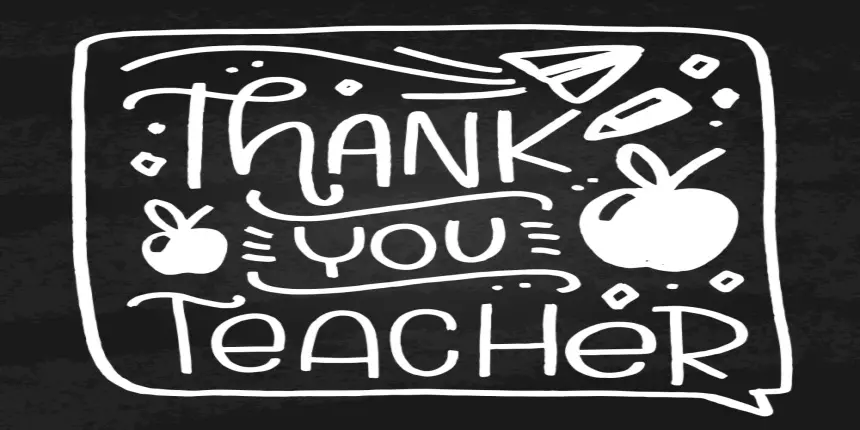
10 Line Thank You Speech For Teachers
Teachers are like our parents. They guide us when we are lost.
Teachers have always cared for us at school and taught us the difference between right and wrong.
Life has been difficult, but the teachers have led us to fight through difficult times.
Every student has a teacher they admire as an inspiration and role model.
Teachers always put student's work as the priority
The courage and confidence I have built today are due to the outstanding teachers who guided me on my journey.
Teachers are the most powerful pillars for building all these educational institutions.
Teachers have brightened our future and helped us to develop true character.
Teachers' contribution to society and the nation is immeasurable and cannot be expressed in a few words.
Teachers have nurtured us with education and motivational learning.
Short Speech On Thank You Speech For Teachers
As we leave this school today, I would like to thank all the teachers who have been a part of my life.
Every teacher deserves tremendous love, care, affection and respect. We all need to recognize the importance of a teacher's presence. They made us who we are today, shaped our character, and guided us toward our dreams and ultimate success. Our teachers let us see what was good for us and told us which path to choose.
Out Teachers: Our Support
I know a teacher who works day and night to solve a particular student's problem. Teachers are our guardians next to our parents. They rebuke us when we are wrong and support us when we are right. It may seem unfair at the time, but as we grow up, we begin to understand the real world.
Growing up is hard, but if you still remember your teacher's values, you can easily face real problems. It taught me not to run away from problems but to face them with courage.
I am and will always be grateful to the teachers who have significantly influenced my life. I was never a good student, but my teachers always supported me, guided me on the right path, and encouraged me to do better than before. I thank all the teachers who have shaped me into who I am today.
Long Speech On Thank You Speech For Teachers
Today I'm here and would like to welcome all of you on the day of our farewell. Now, this is a very emotional moment for all of us. On the one hand, we are being promoted to a new life. On the other hand, we also leave our favourite place: school, where we spent the most crucial period of our lives growing up.
Last Day Of School
On this day, I want to thank all the teachers for guiding us for 14 years of school life and preparing us for the world. Our teachers symbolise strength and excellent support to all of us. You were strict like a father, loving like a mother, caring like a friend, and stern disciplinarian, yet always very approachable. Our teachers are wonderful people because they accepted all of our weaknesses and worked with us to overcome those weaknesses.
I remember when I was enrolled in this school, I was quiet and shy and was not good at public speaking, but today I am standing here and giving a farewell speech because of the wonderful and loving teachers I met at this school. You have worked hard on me to change my character and attitude. They worked with me further to prepare me for the outside world. Teachers are mentors and role models for their students and special thanks to the principal who has so much faith in me and allowed me to enrol in this school. For me, this school is like home because I spent most of my school days here.
Students believe their teachers and every word they say. Today we can make ourselves so competent because of your love, care, guidance and support. All of our teachers have been our source of inspiration. Being a teacher is a big job. Not only is it confined to a few classroom lessons, but it's also much more than those lessons, from preparing exam questions to preparing teaching materials and special sessions for these students. Whatever a teacher does, all these efforts are respected and commendable.
My parents always say school is the golden time of life for everyone. I now find myself standing among my beloved teachers and fellow friends, saying goodbye to this life, and entering a new world.
Thanking My Teachers
I want to thank Mrs Smith and Achinth Sir for giving a particular time to this event and always being my guide, showing me the right direction and path. It was more difficult for me than for other students to complete the projects and tasks you gave us. They both took extra time and extra care to prepare me for the "real world."I remember the day I gave up and lost all hope in Class XI. But I remember, You encouraged me in your unique way, sharing examples of great people who failed first and became famous later. It taught me to pursue my dreams without doing anything. This is one of the few lessons I learned from you guys. We have always been very grateful to all of you, and all my friends would like to express their gratitude to our excellent teacher.
Applications for Admissions are open.

Aakash iACST Scholarship Test 2024
Get up to 90% scholarship on NEET, JEE & Foundation courses

ALLEN Digital Scholarship Admission Test (ADSAT)
Register FREE for ALLEN Digital Scholarship Admission Test (ADSAT)

JEE Main Important Physics formulas
As per latest 2024 syllabus. Physics formulas, equations, & laws of class 11 & 12th chapters

PW JEE Coaching
Enrol in PW Vidyapeeth center for JEE coaching

PW NEET Coaching
Enrol in PW Vidyapeeth center for NEET coaching

JEE Main Important Chemistry formulas
As per latest 2024 syllabus. Chemistry formulas, equations, & laws of class 11 & 12th chapters
Download Careers360 App's
Regular exam updates, QnA, Predictors, College Applications & E-books now on your Mobile
Certifications
We Appeared in

How to Write and Deliver a Memorable Graduation Speech: Tips, Examples, and Techniques
- The Speaker Lab
- March 7, 2024
Table of Contents
The goal of any graduation speech is to find words that capture the essence of years spent learning and growing. Today, we’ll guide you through that process and help you craft a memorable graduation speech . You’ll learn to weave gratitude with shared experiences, and balance humor with wisdom. We’ll even help you find quotes that strike a chord and deliver them in a way that resonates.
But that’s not all! Dive into proven strategies for public speaking, managing stage fright, and drawing inspiration from iconic commencement speeches. Discover how personal growth stories add depth to your message and explore themes that leave a lasting impact on your peers as they step forward into new beginnings.
Crafting Your Graduation Speech: A Step-by-Step Guide
When it comes to marking the end of your high school or university journey, a graduation speech can capture the essence of this pivotal moment. But how do you start such an important address?
Opening with Impact
The first words of your graduation speech are crucial. They set the stage for what’s to come and grab your audience’s attention. Think about starting strong by sharing a personal anecdote that ties into the broader experience of your class or drawing from Steve Jobs’ Stanford University commencement speech , where he began with, “Today I want to tell you three stories from my life.” This technique instantly piques interest because it promises narratives that have shaped who you are.
An impactful opening also acknowledges shared experiences. Perhaps you could reflect on how moments in classrooms turned strangers into lifelong friends. Or for university commencements, consider touching upon those late-night study sessions that tested perseverance but ultimately led to academic achievements worth celebrating today.
Building the Body of Your Graduation Speech
In crafting the body content, intertwine lessons learned throughout high school years or during university courses with aspirations for what lies ahead. For instance, share how overcoming obstacles like balancing extracurricular activities and academics taught valuable time management skills.
To add depth, incorporate quotes from luminaries like Oprah Winfrey or draw parallels between classroom learnings and real-world applications. Dive deeper by discussing milestones achieved together as a graduating class and recognizing the hard work everyone put in to make it to this monumental occasion.
Concluding with Inspiration
Your conclusion should leave fellow graduates feeling inspired while helping them celebrate high school memories one last time—or honor those unforgettable college years if addressing higher education grads.
Closing remarks could include heartfelt gratitude towards teachers’ support and parental guidance. You might even crack a joke or two. It’s these personalized touches paired with universal truths that resonate most deeply as students step forward into new chapters post-graduation.
Find Out Exactly How Much You Could Make As a Paid Speaker
Use The Official Speaker Fee Calculator to tell you what you should charge for your first (or next) speaking gig — virtual or in-person!
Delivery Techniques for Confident Speaking
Standing in front of a crowd can turn even the most composed student into a bundle of nerves. But fear not, with some smart strategies, you’ll be able to channel your inner orator and deliver your graduation speech with confidence.
Practicing Your Graduation Speech
Becoming familiar with every word of your speech is key. Rehearse it out loud until the words feel like second nature. This practice does more than just help you remember what comes next; it lets you find the natural rhythm and pace of your delivery. Consider recording yourself to catch any quirks or stumbling blocks—you might be surprised at how much this helps refine your presentation.
A trick often overlooked is practicing in different environments. If possible, stand on the actual stage where you will deliver your commencement address. Familiarity breeds comfort, making that once daunting podium seem like an old friend when graduation day arrives.
Overcoming Nervousness and Stage Fright
Nervousness is normal but doesn’t let it dictate your performance. Before stepping up to speak, take deep breaths to steady yourself—a calm body encourages a calm mind. An effective method for easing anxiety is visualization. Imagine delivering each line perfectly and receiving an enthusiastic response from listeners—envisioning success can make it so.
Maintaining Eye Contact
The power of eye contact cannot be overstated. It connects speaker and listener on a personal level that amplifies engagement significantly. Scan across different sections of the audience periodically without lingering too long on any one individual.
Incorporate these techniques diligently when preparing for the big day. In doing so, they become part of muscle memory and help build confidence. With confidence and plenty of practice on your side, your graduation speech is sure to conclude to applause leaving you to celebrate yet another milestone achieved.
Analyzing Renowned Graduation Speeches for Inspiration
When crafting a commencement speech, it’s often helpful to look at the giants whose words have echoed through auditoriums and across campuses. Steve Jobs’ Stanford University Commencement Speech is a classic example of weaving life lessons into an address that connects deeply with graduates. Similarly, Oprah Winfrey’s Harvard University Commencement Address showed how stumbling blocks can become stepping stones if we learn from them.
Steve Jobs’ Storytelling Mastery
Jobs had a knack for turning personal anecdotes into universal truths. In his Stanford address, he shared three stories from his own life without sounding self-indulgent. These stories worked because each one carried a broader message relevant to every graduate: finding what you love, dealing with loss, and facing death head-on. Jobs famously urged students to “stay hungry, stay foolish,” encouraging them not just to pursue success but remain curious about life despite challenges. This advice is especially poignant for today’s graduating class.
Like Jobs, you too can craft narratives around moments that speak volumes about perseverance and passion.
Oprah’s Unflinching Honesty
Much like her television persona suggests, Oprah did not shy away from discussing her setbacks in front of Harvard’s graduating class. Instead, she confidently laid bare the challenges faced by anyone who dares greatly because failure is part of achieving greatness. As she reminded students, “It doesn’t matter how far you might rise… At some point you are bound to stumble.”
In doing so she forged an instant connection with listeners grappling with their fears about what the future holds post-graduation. It was a powerful reminder that even icons like Oprah are not immune to trials but emerge stronger through them.
The power behind these speeches lies not just in their content but also in their delivery. These speakers mastered the art of speaking confidently before crowds, maintaining eye contact, and conveying authenticity—techniques any speaker should aspire to replicate on graduation day.
Themes and Messages That Resonate with Graduates
Facing a sea of caps and gowns, the right words can turn a graduation ceremony from mundane to memorable. When crafting your commencement speech, focusing on themes like overcoming obstacles and perseverance connects deeply with graduates who have hurdled high school or college challenges.
Overcoming Obstacles
Talking about stumbling blocks is not just relatable; it’s inspirational. Think Steve Jobs at Stanford University or Oprah Winfrey at Harvard—both shared personal tales of setbacks turned into comebacks. Beyond simply telling their stories, they showed how those hurdles were stepping stones to success.
Weave your narrative around the potholes you’ve navigated during your high school years. This doesn’t mean airing every bit of dirty laundry, just highlighting that one significant moment where everything seemed against you yet failed to defeat you.
The Power of Perseverance
Perseverance is more than sticking to something—it’s pushing forward when every fiber wants to quit. It resonates because everyone, including your fellow graduates, has felt that urge to give up but chose to persevere instead.
Incorporate this theme by using vivid examples that mirror collective experiences—the all-nighters before exams or balancing sports stars ambitions with academics—to illustrate perseverance isn’t just an idea but lived reality for many students.
Free Download: 6 Proven Steps to Book More Paid Speaking Gigs in 2024
Download our 18-page guide and start booking more paid speaking gigs today!
Life Lessons Shared During Graduation Speeches
In addition to sharing content that fellow graduates will find relatable and inspirational, you should also consider sharing life lessons with your audience. Whether young or old, everyone has a unique perspective on life and sharing your wisdom can steer graduates toward a fulfilling path.
The Power of Kindness
Making a positive impact doesn’t require grand gestures; sometimes it’s found in small acts of kindness or an innovative idea that simplifies lives. This message sticks because everyone wants their work to mean something—to know they’ve left footprints on society’s vast canvas.
True Grit and Tenacity
Embracing failure and resilience is another powerful theme echoed by commencement speakers across podiums. Let’s face it; not all endeavors lead straight to success. But as Oprah Winfrey once said during her Harvard University commencement address, “It doesn’t matter how far you might rise… At some point, you are bound to stumble.” Her words remind us: How we pick ourselves up matters more than how we fall.
Making a Positive Impact
A graduating class stands poised on tomorrow’s threshold ready to mold history—and speeches should fuel this transformative fire within them. Memorable graduation speeches show individuals that ovation-worthy achievements are possible if you believe your actions count.
As you prepare your graduation speech, consider including one of these life lessons or one of your own. Don’t be afraid to share your hard-won insights to your fellow graduates—you just might inspire them to make history.
Celebrating Achievements and Acknowledging Contributions
Graduation is not just a ceremony. It’s a tribute to the academic achievements and extracurricular activities that have shaped students into who they are. The acknowledgment of teacher support and parental guidance also plays a pivotal role in these speeches, as they’re the scaffolding upon which student successes are built.
Academic Achievements, Extracurricular Activities
Acknowledging academic prowess goes beyond GPA scores or honor societies; it’s about highlighting unique intellectual journeys. Similarly, shining a light on extracurricular triumphs—be it sports stars setting records or artists winning competitions—adds depth to your speech. Remembering these moments isn’t merely recounting victories but celebrating the relentless spirit of your fellow graduates.
Diving deeper into personal anecdotes helps you connect with peers by reminding them of their growth through challenges faced together—from late-night study sessions to championship games. It’s these stories that make graduation memories stick with classmates long after commencement ends.
Teacher Support, Parental Guidance
The unsung heroes behind every graduate deserve their moment in your address too. Teachers’ dedication can turn classrooms into launch pads for dreams, while parents’ unwavering belief often fuels aspirations during tumultuous times like the pandemic.
In weaving tales of mentorship from teachers or wisdom imparted by parents, you remind everyone that success is rarely a solo act—it’s supported by many hands and hearts along the way. Celebrate this collective effort because each person has contributed uniquely to shaping graduating classes across America, including yours.
Common Issues in Writing and Delivering Graduation Speeches
Staring at a blank page as the clock ticks down to graduation day can rattle even the most seasoned speech writers. Overcoming writer’s block is about finding your message stick—the core idea that you want to leave with your peers. Remember, this isn’t just any talk; it’s one that marks a significant transition for both you and your audience.
Overcoming Writer’s Block
Finding yourself stumped on how to write a speech ? Don’t sweat it. Start by jotting down memories from school years or powerful life lessons that resonate. Think of Steve Jobs’ Stanford University commencement speech where he shared personal stories, which became an inspirational backbone for many other speeches.
If inspiration doesn’t strike immediately, step away from the computer. Take a walk and reflect on high school experiences or browse through commencement speeches archives—like Lin-Manuel Miranda’s address at the University of Pennsylvania. They might spark ideas you hadn’t considered yet.
Navigating Technical Troubles
A great speech can stumble over technical hiccups. To avoid glitches, check all equipment beforehand—a simple but crucial task often overlooked due to nerves or excitement about graduating class celebrations.
Prior rehearsals will also let you handle these issues like a pro should they pop up during delivery. Make sure any videos or slides complement rather than overshadow what you’re saying. After all, graduates aren’t there for bells and whistles—they’re there for meaningful words.
Handling Stage Fright
Your knees may shake thinking delivering in front of proud parents and peers—it’s no small feat, after all. Before you step on stage, visual your success until it feels more real and attainable.
And don’t forget to watch your body language. During your speech, maintain eye contact—not stare-downs—to connect genuinely with fellow students. And if anxiety creeps up despite practice sessions? Take deep breaths to steady yourself and keep going. You’ve handled high school—you can handle this.
FAQs on Writing and Delivering a Graduation Speech
What do i say in my graduation speech.
Share heartfelt stories, acknowledge support from others, and inspire your classmates to chase their dreams boldly.
How do you write a 3 minute graduation speech?
Keep it tight: hit the high notes with gratitude, shared memories, a dash of humor, and wrap up with punchy inspiration.
How do I start a graduation speech?
Kick off with thanks. Give props to family and mentors. Set the stage for reflecting on past adventures together.
What is the most important message of a graduation speech?
The core should spark hope—urge peers to leap into tomorrow equipped with lessons learned during these formative years.
Master your moment with a graduation speech that turns heads and warms hearts. Remember the power of gratitude and connect with your audience through stories, those shared adventures that bind you to your classmates. Don’t be afraid to add a few jokes and quotes to your speech either, as well as personal growth stories to inspire.
When you hit the stage, stand tall, make eye contact, and speak from your heart—the podium’s yours. If butterflies invade, breathe deep and know everyone’s rooting for you. Writer’s block didn’t stop you and neither will this.
Your graduation speech is not just words—it’s a battle cry for your graduating class as you prepare to conquer what lies ahead!
- Last Updated: March 5, 2024

Explore Related Resources
Learn How You Could Get Your First (Or Next) Paid Speaking Gig In 90 Days or Less
We receive thousands of applications every day, but we only work with the top 5% of speakers .
Book a call with our team to get started — you’ll learn why the vast majority of our students get a paid speaking gig within 90 days of finishing our program .
If you’re ready to control your schedule, grow your income, and make an impact in the world – it’s time to take the first step. Book a FREE consulting call and let’s get you Booked and Paid to Speak ® .
About The Speaker Lab
We teach speakers how to consistently get booked and paid to speak. Since 2015, we’ve helped thousands of speakers find clarity, confidence, and a clear path to make an impact.
Get Started
Let's connect.
Copyright ©2023 The Speaker Lab. All rights reserved.
- PRO Courses Guides New Tech Help Pro Expert Videos About wikiHow Pro Upgrade Sign In
- EDIT Edit this Article
- EXPLORE Tech Help Pro About Us Random Article Quizzes Request a New Article Community Dashboard This Or That Game Popular Categories Arts and Entertainment Artwork Books Movies Computers and Electronics Computers Phone Skills Technology Hacks Health Men's Health Mental Health Women's Health Relationships Dating Love Relationship Issues Hobbies and Crafts Crafts Drawing Games Education & Communication Communication Skills Personal Development Studying Personal Care and Style Fashion Hair Care Personal Hygiene Youth Personal Care School Stuff Dating All Categories Arts and Entertainment Finance and Business Home and Garden Relationship Quizzes Cars & Other Vehicles Food and Entertaining Personal Care and Style Sports and Fitness Computers and Electronics Health Pets and Animals Travel Education & Communication Hobbies and Crafts Philosophy and Religion Work World Family Life Holidays and Traditions Relationships Youth
- Browse Articles
- Learn Something New
- Quizzes Hot
- This Or That Game
- Train Your Brain
- Explore More
- Support wikiHow
- About wikiHow
- Log in / Sign up
- Education and Communications
- Personal Development
- School Leadership
How to Write a Student Council Speech
Last Updated: April 24, 2024 Approved
This article was co-authored by Patrick Muñoz . Patrick is an internationally recognized Voice & Speech Coach, focusing on public speaking, vocal power, accent and dialects, accent reduction, voiceover, acting and speech therapy. He has worked with clients such as Penelope Cruz, Eva Longoria, and Roselyn Sanchez. He was voted LA's Favorite Voice and Dialect Coach by BACKSTAGE, is the voice and speech coach for Disney and Turner Classic Movies, and is a member of Voice and Speech Trainers Association. wikiHow marks an article as reader-approved once it receives enough positive feedback. This article has 127 testimonials from our readers, earning it our reader-approved status. This article has been viewed 2,038,496 times.
Being a member of the student council can help you help your school. However, it takes hard work to get into the student council . You need to craft a good speech that gives your classmates incentives to vote for you.
Your Student Council Speech
Use a strong, attention-grabbing opening. Discuss your qualifications briefly, then move on. Focus your speech on your passion and present a blueprint to achieve your goals. Close with a strong summary and call to vote for you.
Sample Speeches

Writing the Introduction

- Do not merely start by saying, "My name is ___ and I'm running for student council." Your classmates will already know as much and this is not really a unique statement. There will be time to state the basic information after you've got the class's attention. [1] X Research source
- You can open with a question. Something like, "If there was one thing you could change about this school, what would it be?" Or a question that adds some humor , like, "I know what you're thinking. Why should I listen to this person?" and then proceed to lay out your credentials. Quotes on leadership, power, and guidance would also make good openings. However, make sure to double-check your sources and especially if you're finding quotes online. Many online quote databases, like Quote Garden or Brainy Quote, sometimes attribute quotes to the wrong sources. [2] X Research source
- If you're stuck, look up and read famous speeches. You can find many speeches from presidents, world leaders, civil rights activists, and others online. Pay attention to how they opened their speeches and ask yourself, "Was this interesting? Do I want to keep reading/listening? Why?" [3] X Research source

- State your name and grade in school. This may feel somewhat unnecessary if you go to a small school, but it's considered a formality. If you're missing this part of the speech, you may end up looking sloppy in comparison to other students. [5] X Research source
- State what you want. That is, what you're running for. Do you want to be the president , vice president , treasurer, secretary? Even if you think most students are aware of what position you're running for, make sure you state it here to remind them. [6] X Research source
- Try to keep this section brief as it's not as important as your qualifications and plans to improve the school . Even one sentence would suffice. For example, "My name is Ramona Hart, I'm in the 11th grade, and I'm running for treasurer of the student council."

- Any accomplishments relevant to the position warrant mentioning here. If you're running for secretary, for example, talk about your summer job filing papers in your uncle's law firm. If you're running for student council president, talk about your leadership experience being captain of the swim team. [7] X Research source
- While this section is important, try to keep it minimal. A couple of sentences laying out your qualifications is enough as the body of your speech is where you should spend the most time. For example, let's go back to the above example. From there, we could say, "I am currently enrolled in advanced placement algebra and I have been an honor roll student for three years. This knowledge of numbers and diligence qualifies me to have responsibility for finances for our student council." [8] X Research source
Writing the Body of the Speech

- You should list your ideas and then expand on them later in the body. It might take a bit of research to figure out what you want to change. Ask around the school, talking to students and teachers, and see where there's room for improvement. What are the concerns of the students? What are people happy with regarding the school? What would they like to see change? Asking these questions can help you get a sense of your audience and community.
- Remember, you should not make promises you cannot keep. Do not say anything just to get elected. While many students might want gum-chewing policies eliminated or for the lunch period to run twice as long, this is probably not necessary or possible. Try to focus on areas that seem important to keep your school running safely and efficiently. Concerns about things like bullying , academic standards, and extracurricular activities should be your concern over fun and games. [10] X Research source
- A good opening statement for your body would state the causes important to you and what you plan to do about them. For example, if you were running for president, you could say something like, "I understand we need to improve how we handle bullying, increase interest in extracurricular activities, and expand access to AP courses throughout the school. As your president, I would work to bring in speakers to talk about sensitivity in the classroom, increase advertising for basketball games and quiz bowl tournaments, and start a tutoring program to help students struggling with certain subjects." [11] X Research source

- Using the school library or computers, figure out the best means to tackle certain problems many schools face. How have other schools dealt with bullying? Poor test scores? Low interest in extracurricular activities? What can you reasonably do as a student council member to address these problems? [12] X Research source
- You do not have to have a point-by-point plan laid out, but a few sentences on some preliminary ideas can help you stand out from your peers. People are more inclined to vote for someone who's thought about how to solve problems in addition to identifying problems. [13] X Research source

Ending with a Strong Conclusion

- Do summarize, briefly, your qualifications but do not put the main focus on them. This is where you should sincerely state your passion. Students should not just vote for you because you'd do a good job but because you genuinely care about the school. State your passion for your community and how much you want to see other students succeed. Lots of students have high qualifications. You can set yourself apart by being a candidate who really cares. [16] X Research source

- Research what other student council speeches are like on video websites. This could help give you ideas.
Expert Q&A

- Only promise to do things that you really can do. Thanks Helpful 6 Not Helpful 0
- Practice reading your speech a few times, as you'll likely be nervous before giving it. Thanks Helpful 6 Not Helpful 0

- Even if you write a great speech, understand you may lose. Be prepared to lose graciously and sincerely congratulate the winning candidate. Thanks Helpful 104 Not Helpful 16
- Unlike in a governmental election, student council candidates should not attack each other, previous leaders, or other students. Otherwise, you could get into trouble and leave a bad impression on voters. Thanks Helpful 78 Not Helpful 16
You Might Also Like

- ↑ http://www.studentcouncilpro.com/student-council-speeches.html
- ↑ http://www.write-out-loud.com/student-council-speeches.html
- ↑ Patrick Muñoz. Voice & Speech Coach. Expert Interview. 12 November 2019.
About This Article

To write a student council speech, start with an attention-grabbing statement such as a question or a powerful quote about leadership. Next, briefly explain who you are, what position you are running for, and why you are running. Then list any relevant qualifications, such as a summer job. In the body of the speech, discuss at least 3 ways to improve the school. For this section, make sure not to make any promises you can’t keep. Finally, end by briefly reiterating your main points and asking for the students’ vote. To learn more about how to support your ideas and research for your speech, keep reading! Did this summary help you? Yes No
- Send fan mail to authors
Reader Success Stories
Did this article help you?

Mihrimah G.
Sep 27, 2017
Kyla Harvie
Jun 11, 2017

Featured Articles

Trending Articles

Watch Articles

- Terms of Use
- Privacy Policy
- Do Not Sell or Share My Info
- Not Selling Info
Get wikiHow's expert advice in our new
Weekly Relationships Newsletter
35 Teacher Quotes to Thank the Inspirational Educators You Know
"Teaching is the greatest act of optimism."

As the school year comes to a close, it's time to honor the educators who have made such a big impact on your children this year. How to thank them? Consider the gift of words with the best teacher quotes .
So, between that spring break trip and planning summer activities , take time to #ThankATeacher, whether it's the last day of school or during Teacher Appreciation Week, May 6-10, 2024. You can also express your gratitude to teachers "just because" whenever you are inspired to do it. They'll certainly appreciate affirmation for their hard work and care for their students any day you share it!
More Inspiration for Teachers, Education, and Parenting
- The Very Best Gifts for Teachers
- Inspiring Quotes About Education
- Fun Ideas for Kids, Parents, and Families
Dorothea Dix
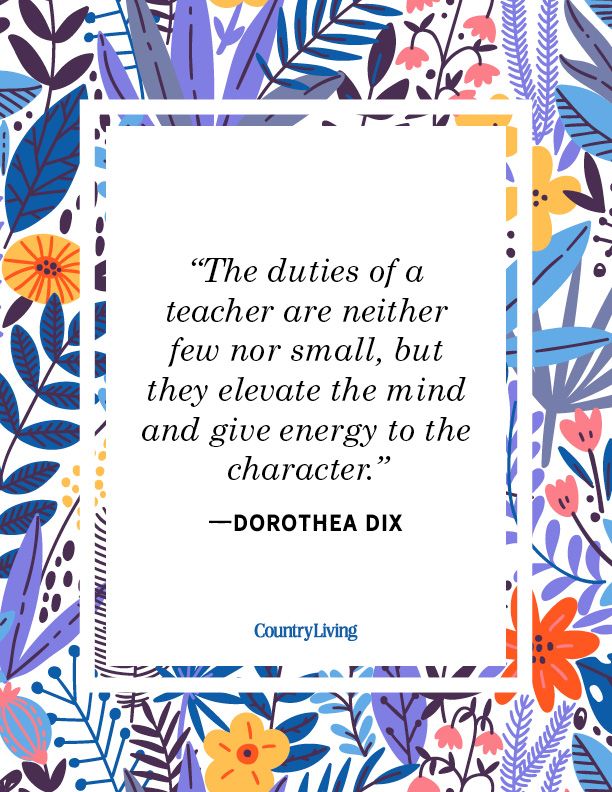
"The duties of a teacher are neither few nor small, but they elevate the mind and give energy to the character."
Darwin D. Martin
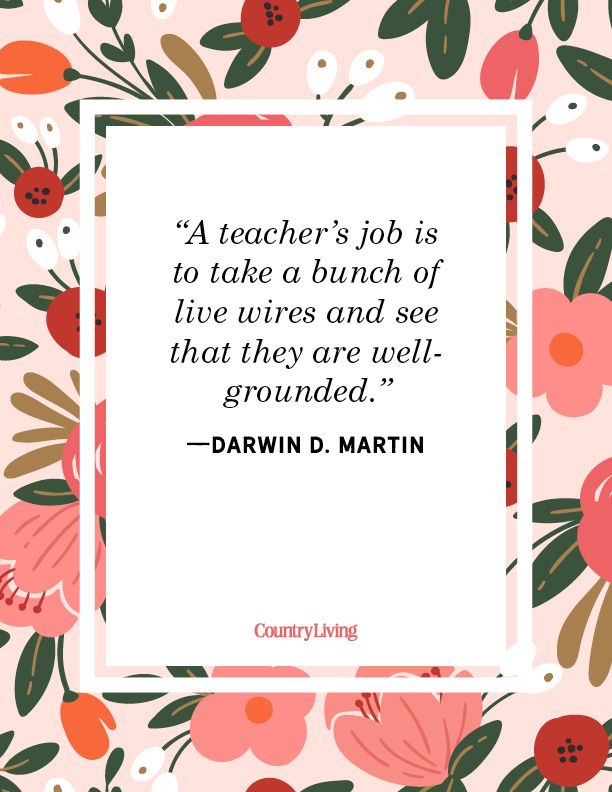
"A teacher's job is to take a bunch of live wires and see that they are well-grounded."
Jeannette Walls
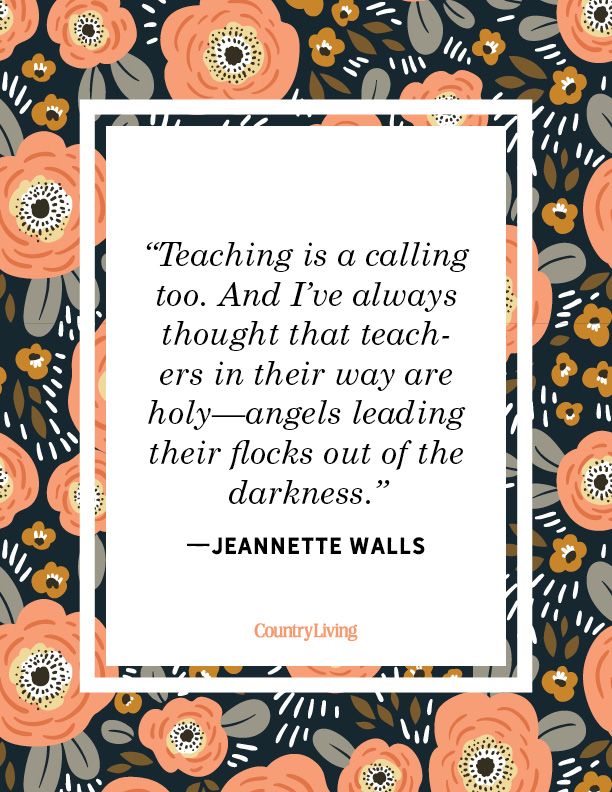
"Teaching is a calling too. And I’ve always thought that teachers in their way are holy—angels leading their flocks out of the darkness."
Guy Kawasaki
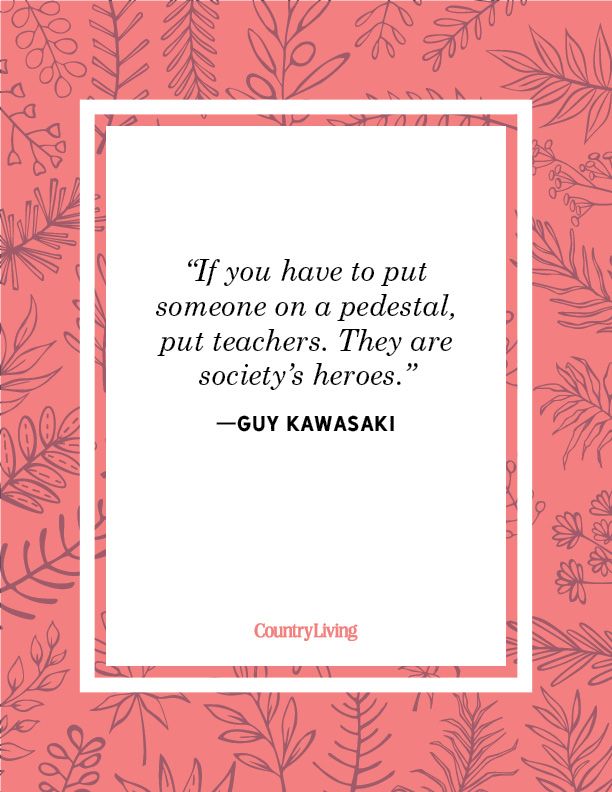
"If you have to put someone on a pedestal, put teachers. They are society's heroes."
Japanese Proverb

"Better than a thousand days of diligent study is one day with a great teacher."
Aaron Bacall
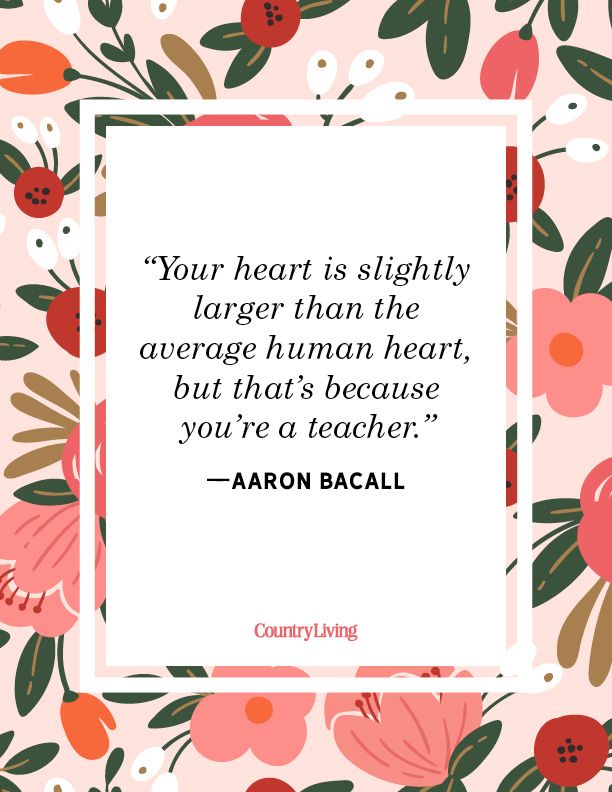
"Your heart is slightly larger than the average human heart, but that's because you're a teacher."
Joyce Meyer
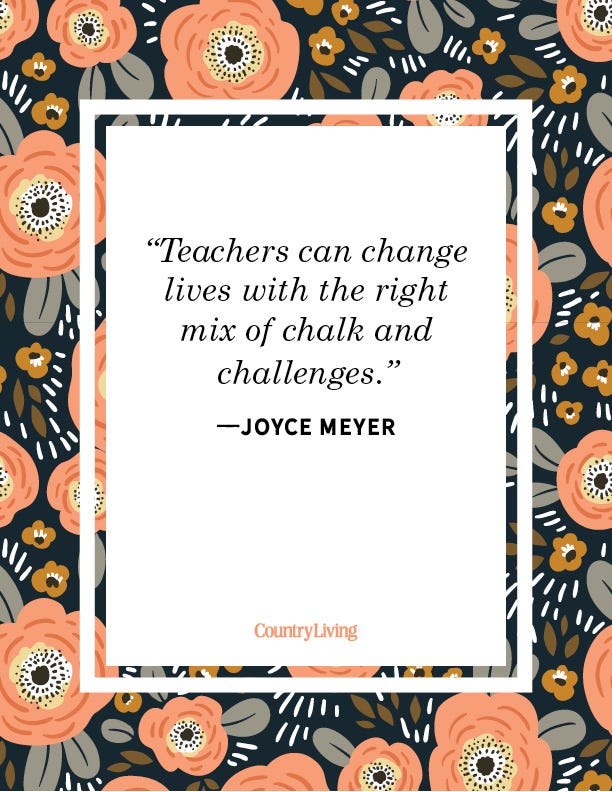
"Teachers can change lives with the right mix of chalk and challenges."
Colleen Wilcox
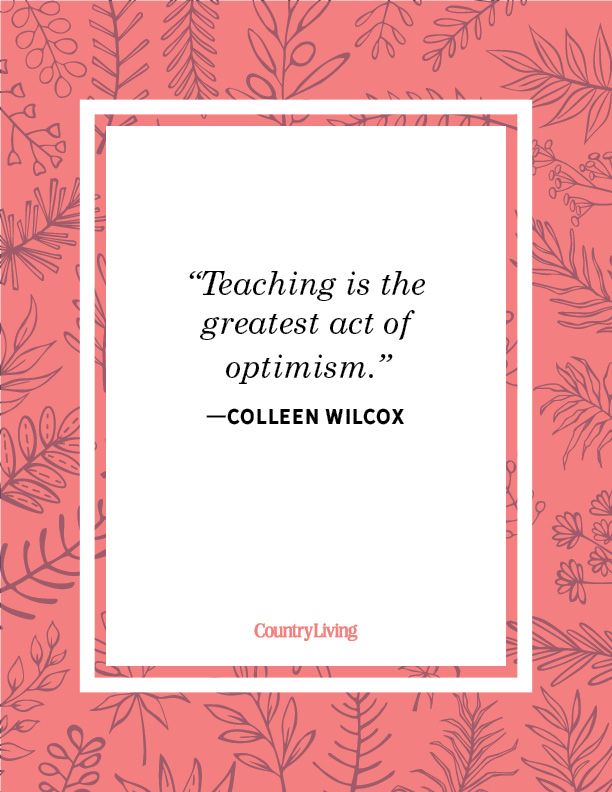
John C. Maxwell
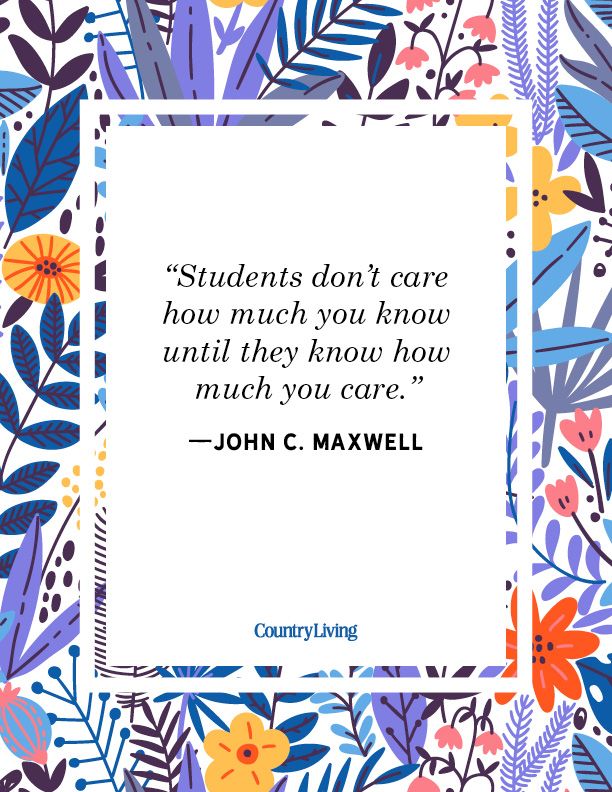
"Students don't care how much you know until they know how much you care."
E.P. Bertin
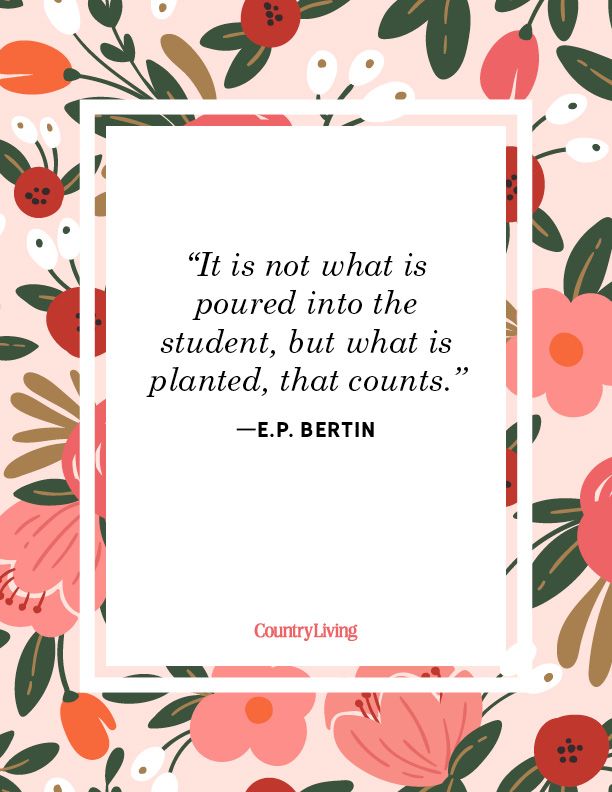
"It is not what is poured into the student, but what is planted, that counts."
Robert Frost
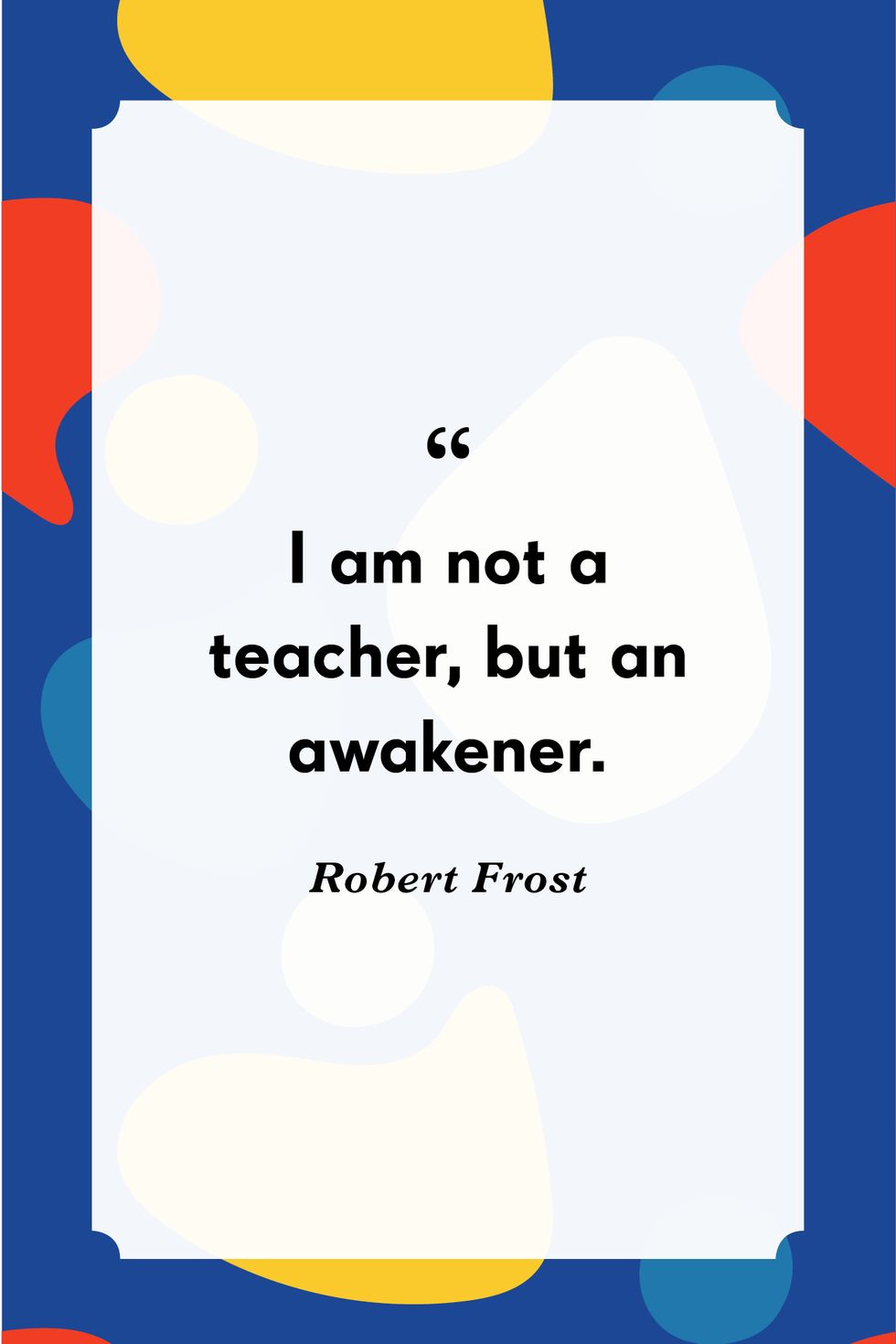
"I am not a teacher, but an awakener."
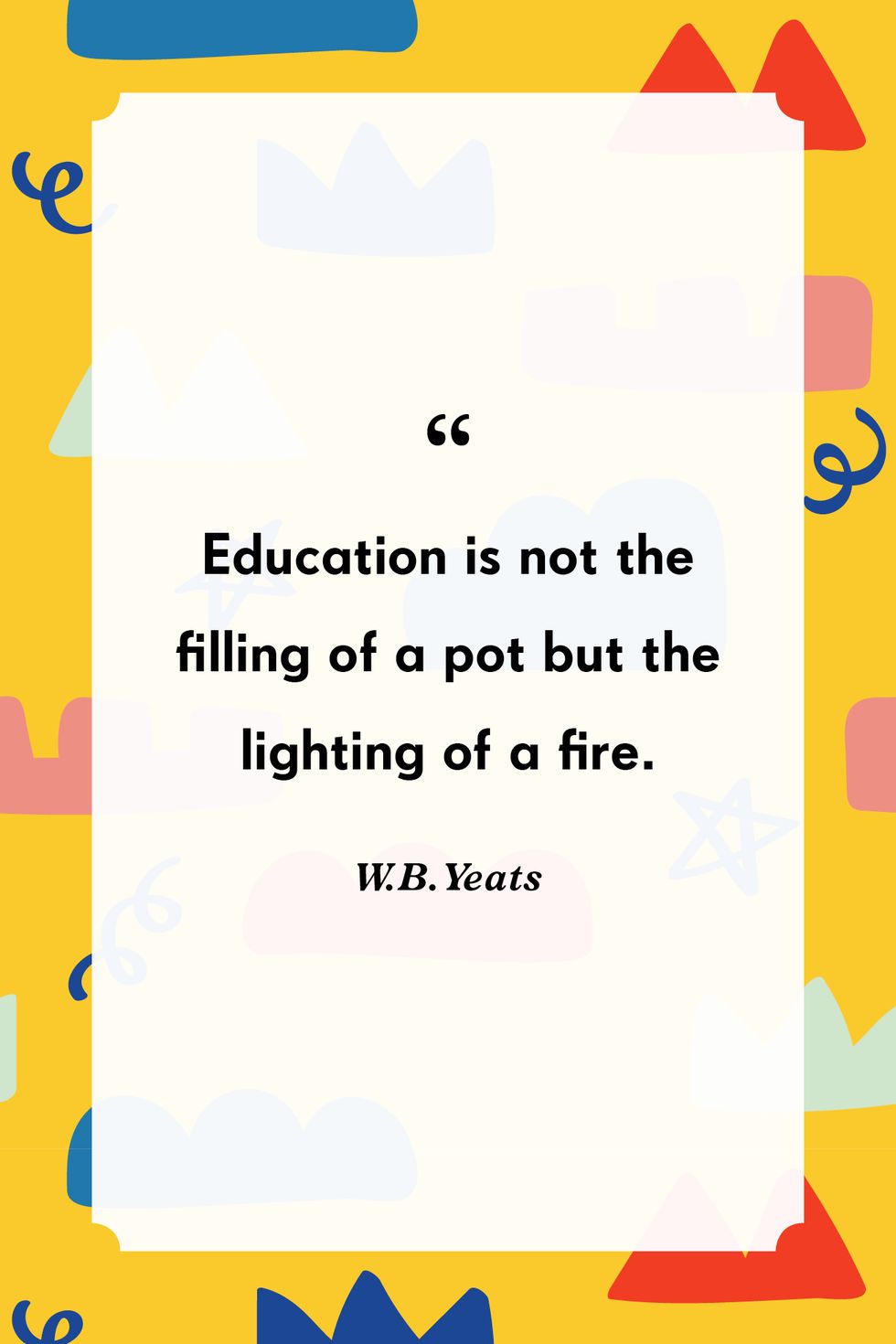
"Education is not the filling of a pot but the lighting of a fire."
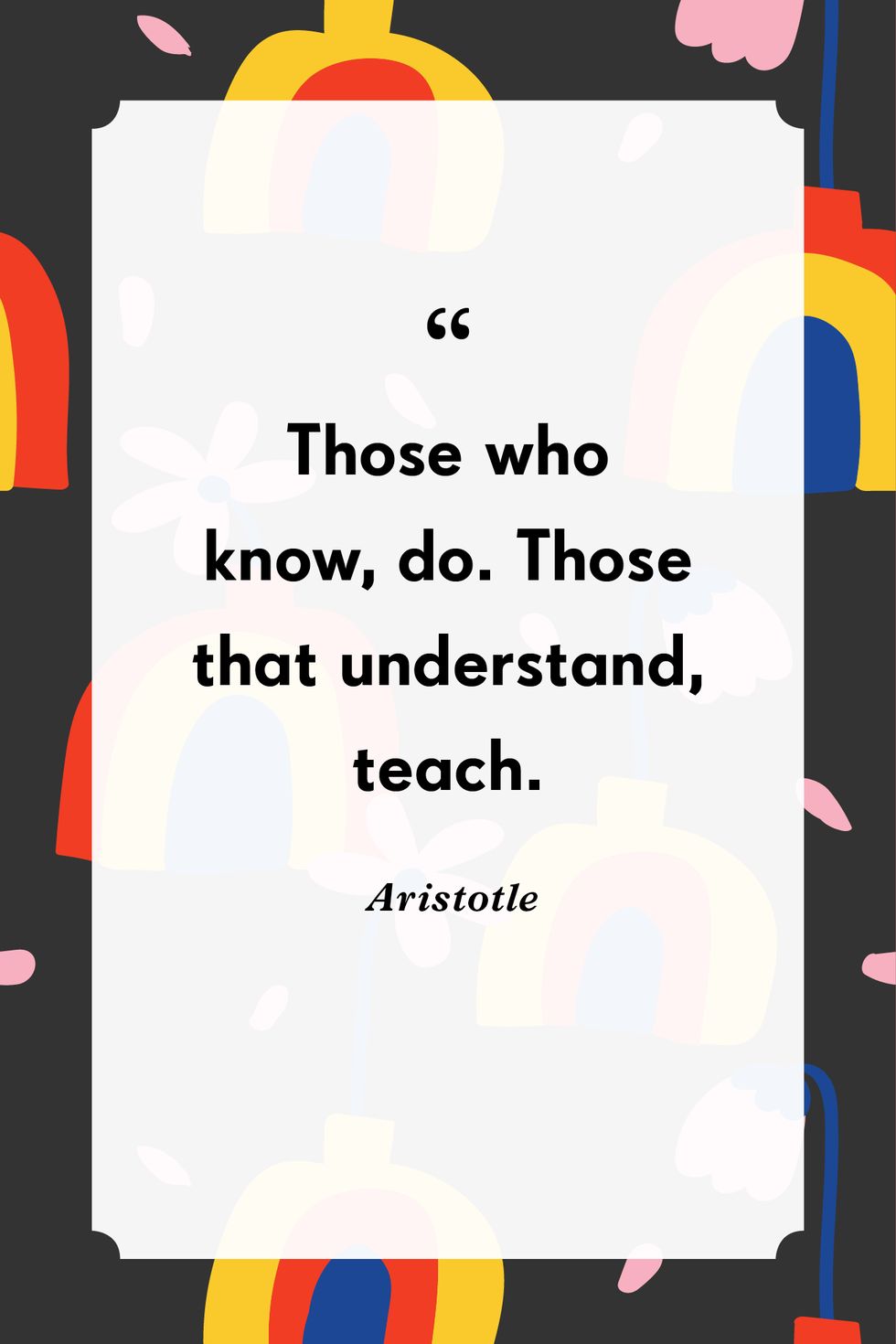
"Those who know, do. Those that understand, teach."
Martin Luther King, Jr.
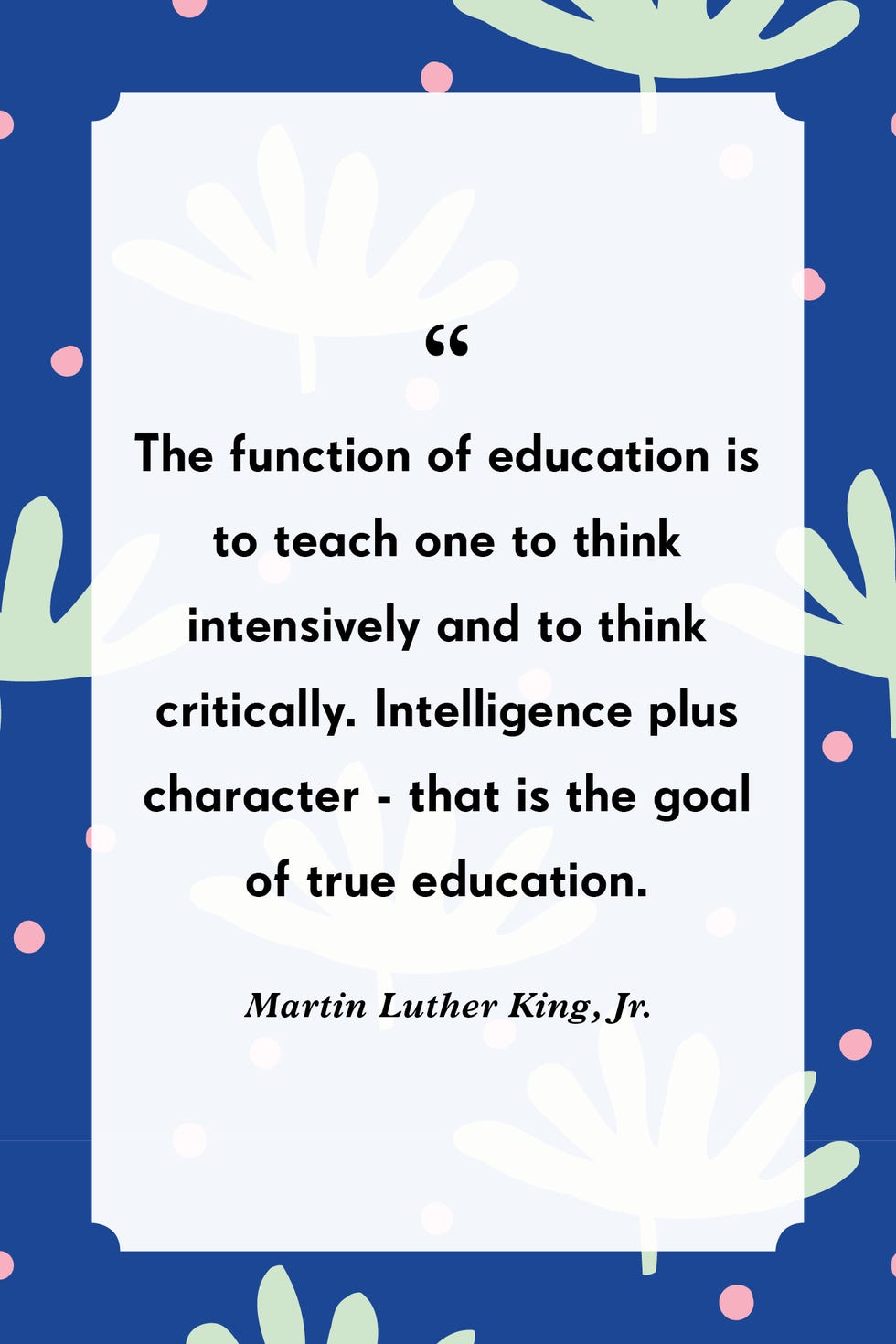
"The function of education is to teach one to think intensively and to think critically. Intelligence plus character—that is the goal of true education."
Terry Heick
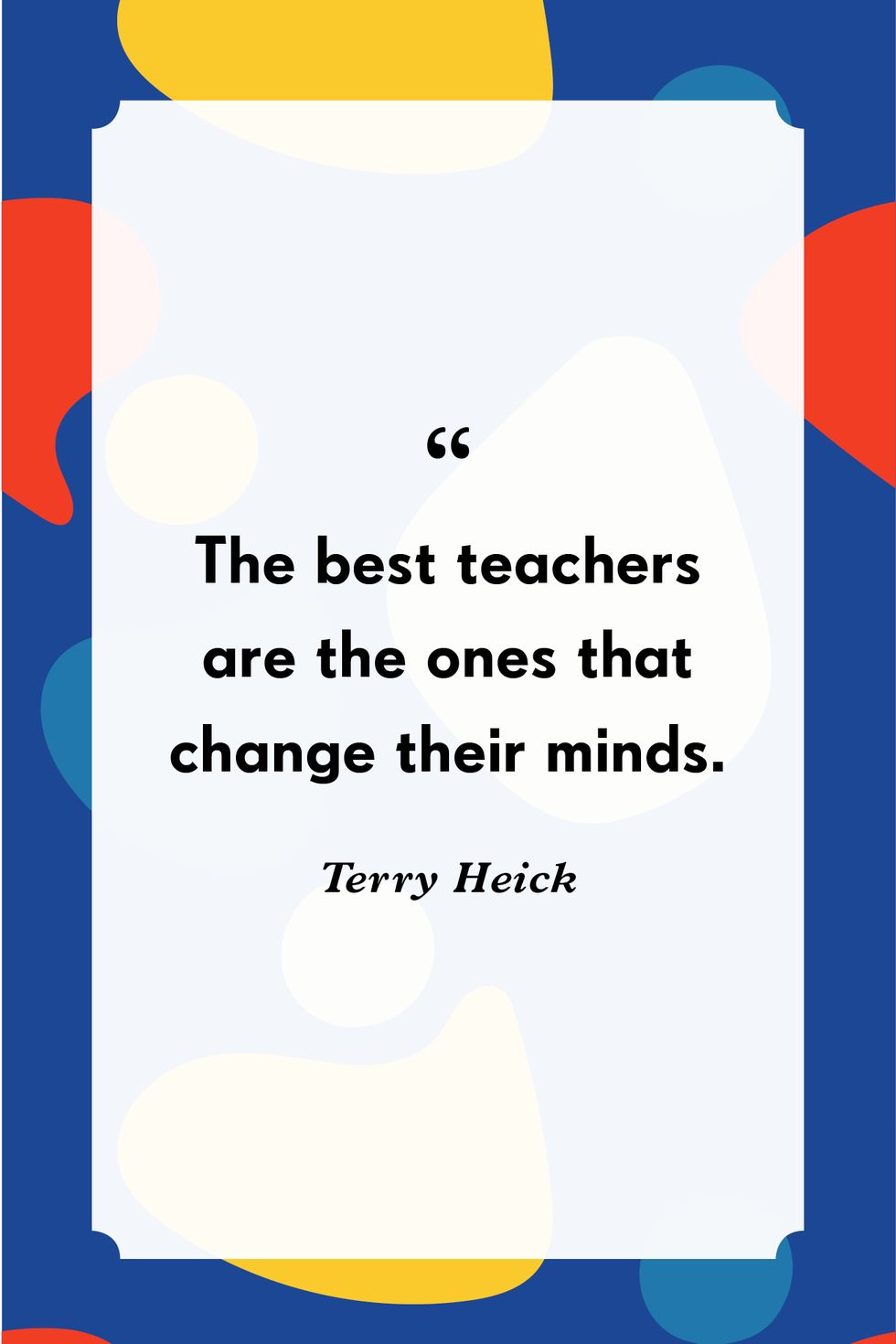
"The best teachers are the ones that change their minds."
Scott Hayden
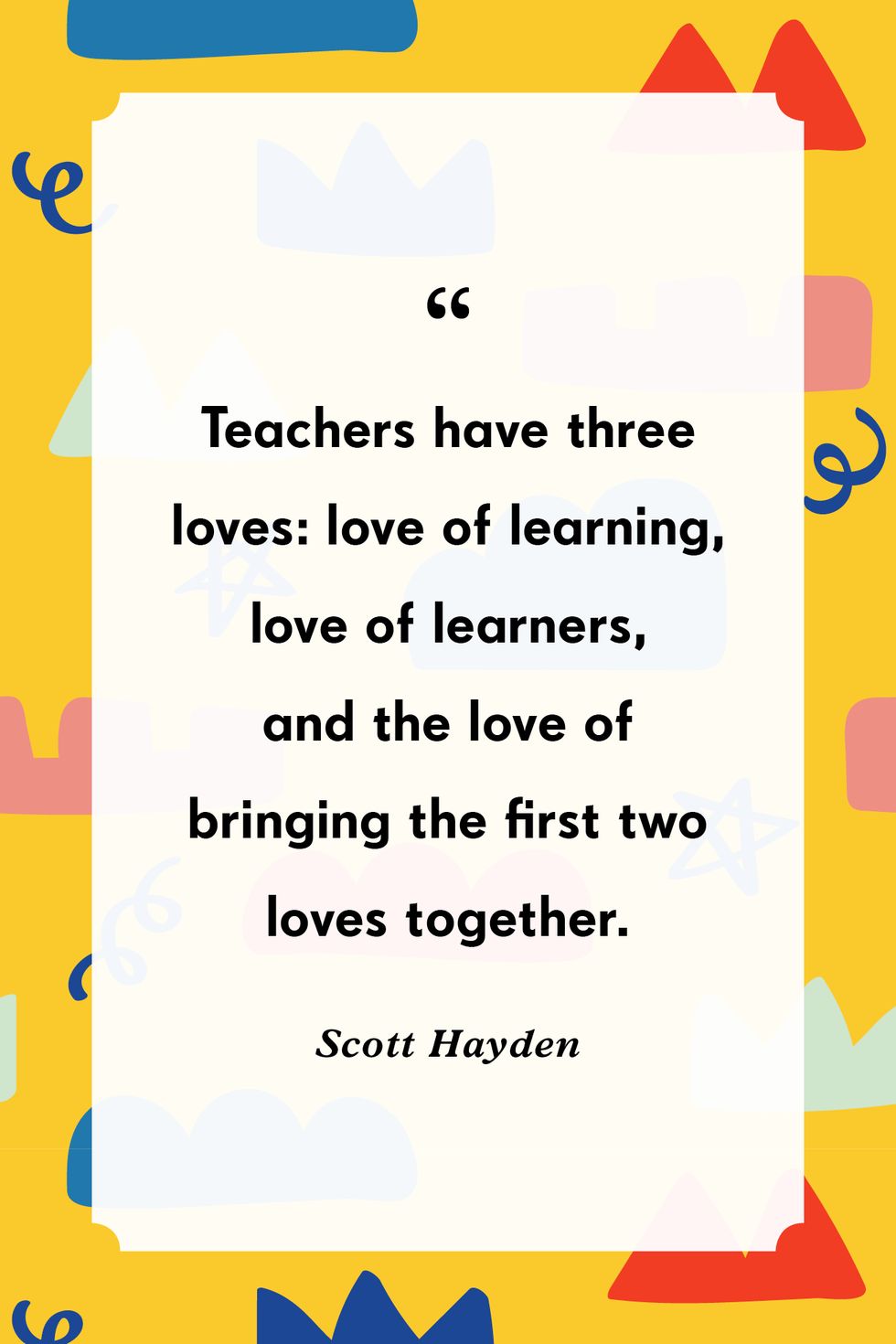
"Teachers have three loves: love of learning, love of learners, and the love of bringing the first two loves together."
Albert Einstein
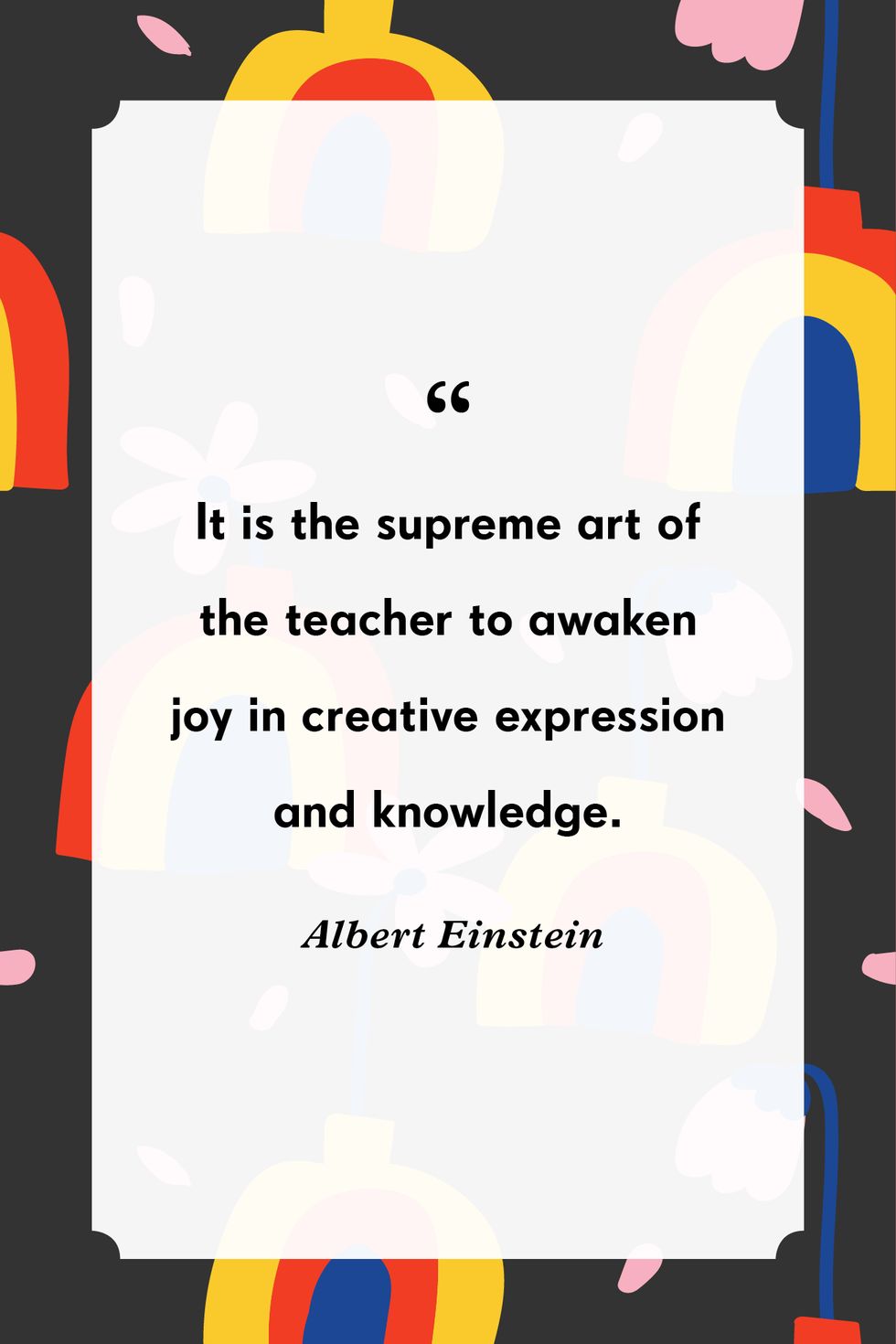
"It is the supreme art of the teacher to awaken joy in creative expression and knowledge."
Alexandra K. Trenfor
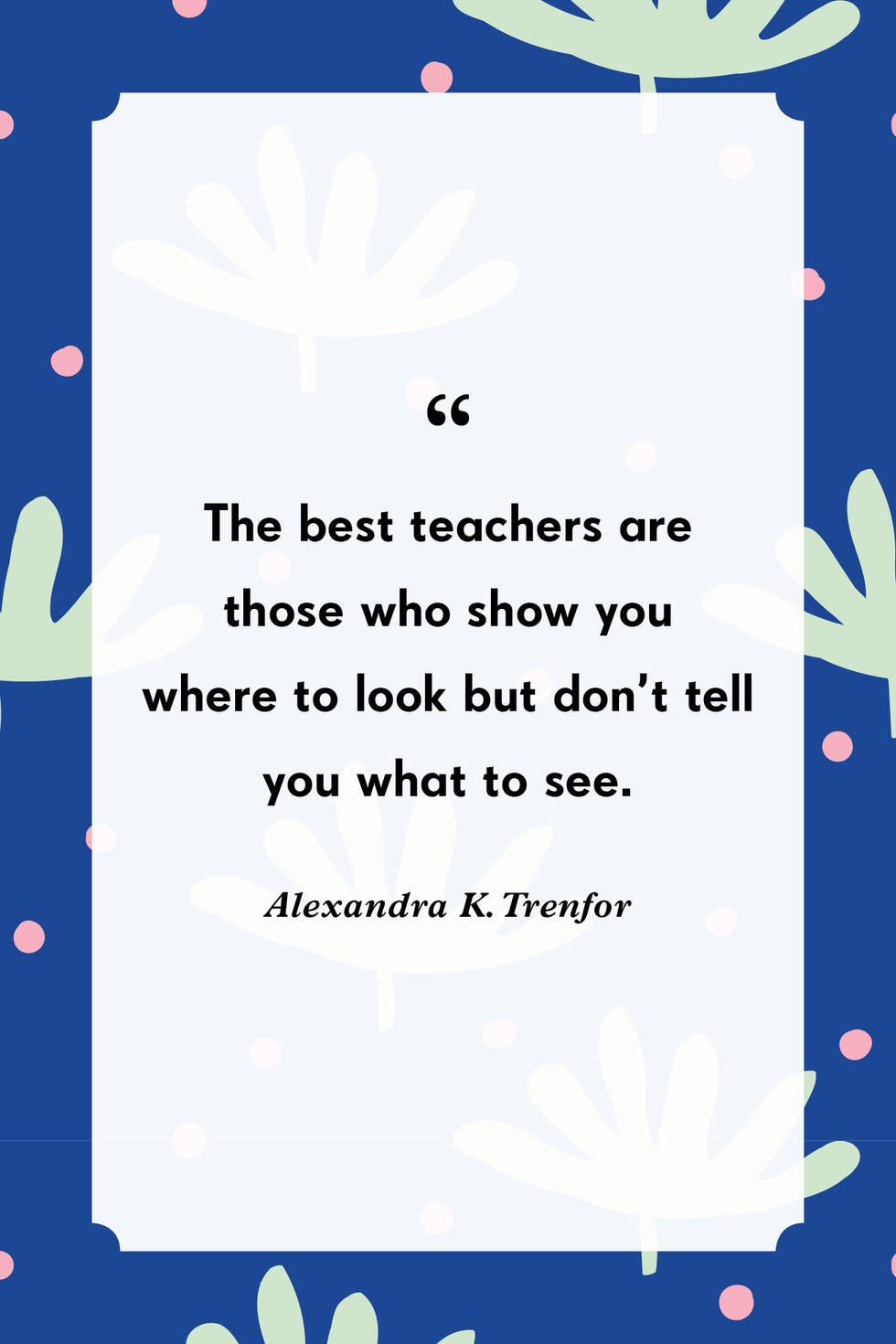
"The best teachers are those who show you where to look but don’t tell you what to see."
Malala Yousafzai
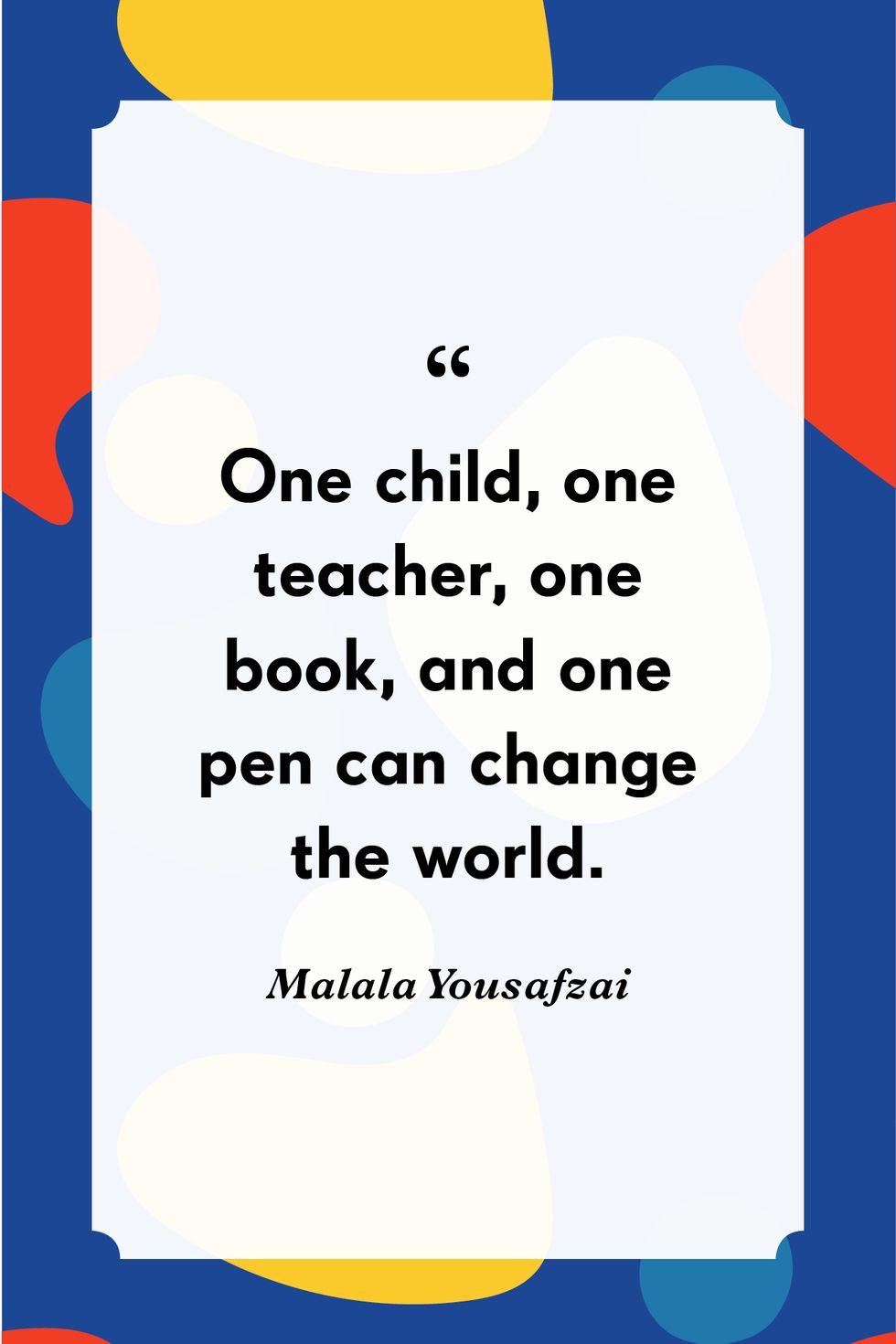
"One child, one teacher, one book, and one pen can change the world."
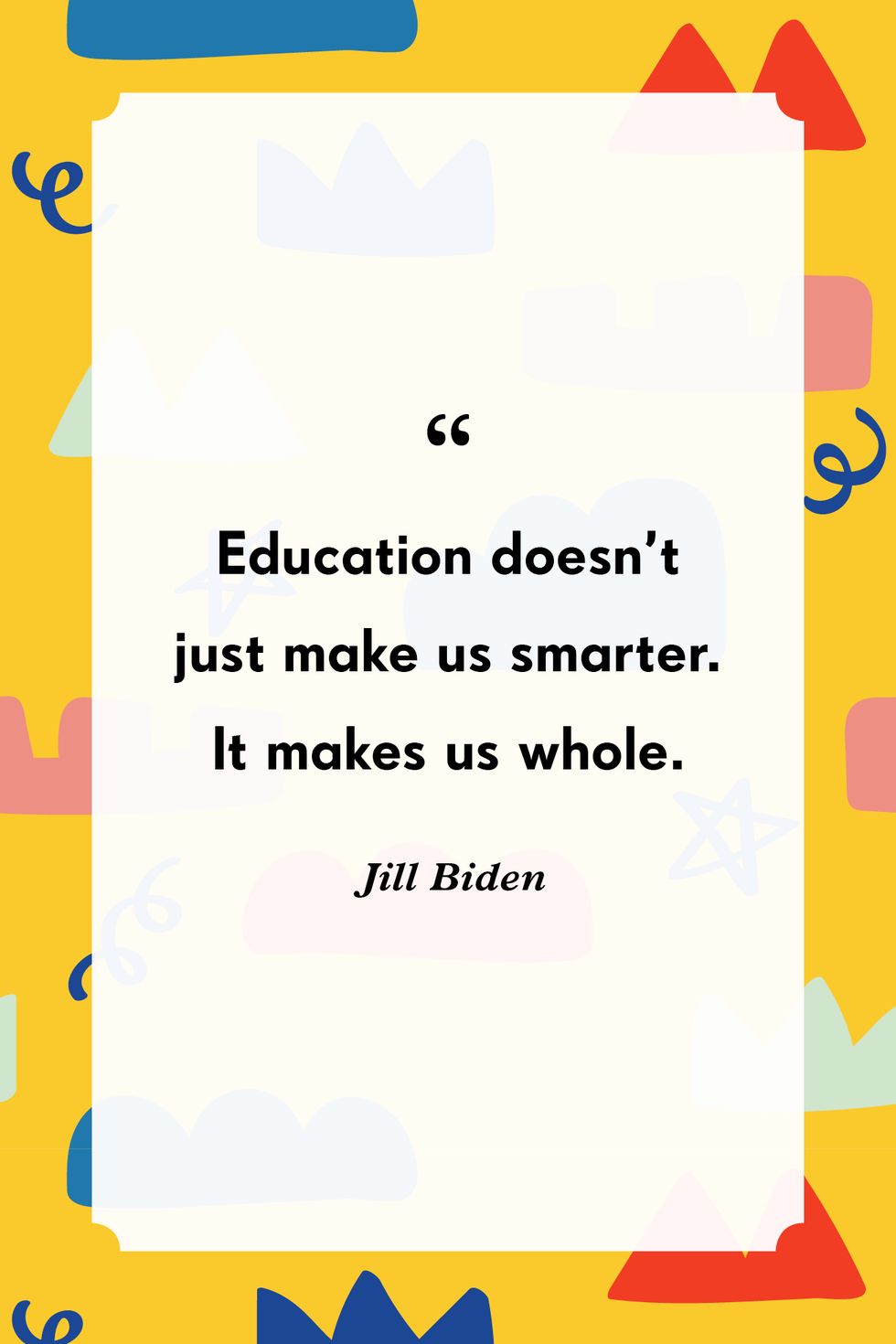
"Education doesn't just make us smarter. It makes us whole."
Leah Hall is currently a digital producer and writer for Country Living. She is based in Huntsville, Alabama.
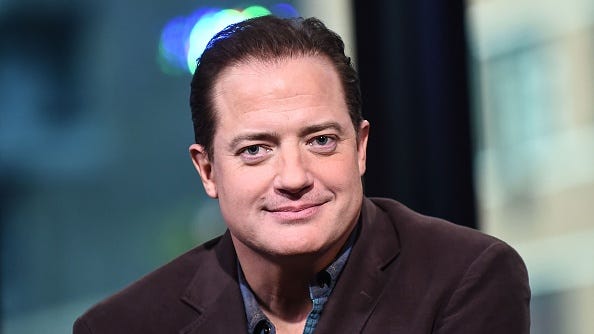
.css-1shyvki:before{background-repeat:no-repeat;-webkit-background-size:contain;background-size:contain;content:'';height:0.819rem;margin-bottom:0;margin-right:-0.9375rem;width:3.125rem;}.loaded .css-1shyvki:before{background-image:url('/_assets/design-tokens/countryliving/static/images/arrow.svg');}@media(max-width: 48rem){.css-1shyvki:before{display:none;}}@media(min-width: 40.625rem){.css-1shyvki:before{display:inline-block;}} 100+ Quotes for Every Occasion .css-unxkmx:before{background-repeat:no-repeat;-webkit-background-size:contain;background-size:contain;content:'';height:0.819rem;margin:0.7rem auto 0.9375rem;width:3.125rem;}.loaded .css-unxkmx:before{background-image:url('/_assets/design-tokens/countryliving/static/images/arrow.svg');}@media(max-width: 48rem){.css-unxkmx:before{display:block;}}@media(min-width: 40.625rem){.css-unxkmx:before{display:none;}}

125 Birthday Wishes for Your Brother

80 Best Friend Quotes to Share with Your BFF

125 of the Best Birthday Wishes for Your Sister

Short Mother-Daughter Quotes to Touch Her Heart

75 Inspirational Graduation Quotes for 2024 Grads

99 Inspiring Messages for Inside Your Grad's Card

55 Patriotic Quotes to Honor America

Beach Instagram Captions to Seas the Day
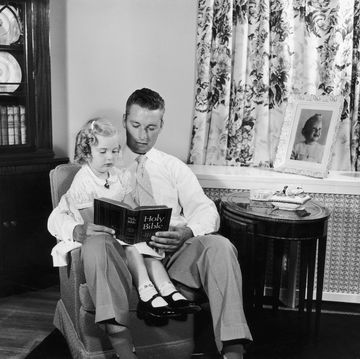
30 Meaningful Bible Verses About Children

Happy St. Patrick's Day Quotes and Messages

Moving Easter Quotes to Inspire Hope

ChatGPT for Teachers
Trauma-informed practices in schools, teacher well-being, cultivating diversity, equity, & inclusion, integrating technology in the classroom, social-emotional development, covid-19 resources, invest in resilience: summer toolkit, civics & resilience, all toolkits, degree programs, trauma-informed professional development, teacher licensure & certification, how to become - career information, classroom management, instructional design, lifestyle & self-care, online higher ed teaching, current events, simple steps to create a persuasive speech.

When creating a lesson plan to teach persuasive speech, it is important to model what a persuasive speech sounds like by providing students with specific examples.
There are countless easily accessible speeches online to help students visualize their task. One example is the TeacherTube video of Angelina Jolie discussing global action for children. Or the audio clip of Martin Luther King, Jr. delivering his historic “I Have a Dream” speech. Once students are allowed to see and hear a persuasive speech in action, they’ll be more prepared for the written portion of the assignment.
Topic ownership
Everyone wants something and is willing to try and convince someone else to provide it. That is how most environments in the modern adult world work. Students of all ages and abilities need to learn how to craft a persuasive speech to be successful later in life.
Students use persuasion in life, often without realizing it. Young children may want their parents to take them out for ice cream. Middle school children may want to have a sleepover with friends. High school students may want to persuade their parents to buy them a car when they get their driver’s license.
If students are allowed to choose their own topic, they will feel more ownership in the assignment.
Preparing and writing the first draft
Students need to create a logical argument giving details about why they should get what they want. Some persuasive strategy definitions include:
- Claim: The main point of your argument.
- Big Names: The experts referred to during a speech.
- Logos: The logic or rationale of your argument.
- Pathos: The emotional aspect to your argument.
- Ethos: The trustworthiness of your claims.
- Kairos: The urgency of your argument.
- Research: The graphs, tables and illustrations that support your argument.
After outlining all areas of the argument, students can begin to write the first rough draft of their speech. To begin, the introduction should include the main topic and the argument.
Next, the body of the paper should include correct sequencing of examples as well as a counter argument. It’s very important to include a counter argument in your speech.
Finally, the conclusion of your speech should make a strong statement and give a call-to-action to the audience.
When writing a persuasive speech, students should make sure their facts are accurate and their voice is expressed. If students are having trouble creating the essay, using a graphic organizer is sometimes helpful. There are many interactive organizers that can assist students, including the persuasion map.
Peer editing
Once students have written a rough draft of the persuasive speech, it is important to peer edit . Teachers should put students in groups of three to four and allow them to read each other’s essays. They can give feedback about whether the speech is convincing and ways it can be improved.
Often, when students work together, they more effectively point out mistakes in their peer’s argument while also providing words of encouragement about their strengths. You want to make sure when creating the groups that there are varying ability levels grouped together.
Next, students can revise their speech. Classmates may have pointed out areas that needed improvement or clarification. Students often need a different perspective to make sure the argument they are making is clear and reasonable.
Speaking and presenting
Finally, students should be allowed to present their persuasive speeches. Although getting up in front of the class is the best way to present orally, shy students could also be allowed to create a PowerPoint presentation that integrates the audio feature so they can practice reading their speech for the presentation.
Teachers and students can complete grading rubrics for the student presentations. Students need to learn how to evaluate other students and provide appropriate feedback. Using a grading rubric is the best way to make sure the assessment if fair and accurate.
Creating persuasive speeches is a valuable skill for students to learn at any age. Whether they are trying to relay an idea to their parents, their peers, or their government, it’s important to know how to create logical arguments and provide accurate, reliable support. The more students practice writing and presenting persuasive speeches, the more confident they will be when a real-life situation presents itself.
You may also like to read
- Help for Students With Speech Sound Disorders: Speech Buddies
- CCSS: Five Steps to Get Students Involved in Class Discussions
- How Teachers Can Help ELL Students Create a Community
- Create a Makerspace for Your School in 5 Easy Steps
- How to Create an Oral History Rubric
- Making Persuasive Speeches a Priority in the Classroom
Categorized as: Tips for Teachers and Classroom Resources
Tagged as: Language Arts
- Back to School Resources for Online & In-clas...
- Master's in Trauma-Informed Education and Car...
- Online & Campus Master's in Early Childhood E...
- Our Mission
4 Strategies for Developing Confident Student Speakers
Consistent support and low-stakes opportunities to practice go a long way to help students overcome the challenges of speaking in front of a group.

I belted out the opening line to Marc Antony’s funeral speech from The Tragedy of Julius Caesar , leaping up the stairs to the stage in my school’s auditorium. Thirteen ninth-grade students dressed in togas sat in the front rows, mouths agape, as they witnessed their goofy teacher unexpectedly launch into the 35-line monologue they had all just beautifully performed.
Confession: I was nervous walking onto that stage—I sometimes get uncomfortable in the (literal) spotlight. To normalize feelings of anxiety during a performance, I revealed those emotions to my class afterward.
Public speaking is hard, and it can be extremely daunting for our most introverted students ; however, with modeling and practice, I believe that teachers can cultivate confident speakers.
Strategy 1: Provide Direct Instruction
A poster inspired by Erik Palmer’s work on public speaking ( PVLEGS : Poise, Voice, Life, Eye Contact, Gestures, Speed) hangs in the back of my classroom. Well before we launch into a study of the funeral orations from Caesar , I explicitly teach those skills. I demonstrate for students appropriate eye contact—the speaker locks eyes briefly with individual audience members and scans the room as she speaks, establishing a connection with her audience. The speaker might also speed up his voice for a certain effect or raise his arms to command the attention of his audience.
Strategy 2: Provide Public Speaking Models
After we spend a class closely reading and analyzing the two funeral orations by Marc Antony and Brutus, I play clips of the speeches from the two film adaptations. We watch the performances and think about PVLEGS: Which speaking moves does each actor utilize in his performance? Which actor delivers the stronger performance and why? After we watch and students share their observations with partners, we discuss and debate the merits of each performance.
When my classes work on memorizing and performing the monologues, I ask them to study the models and even borrow some of the actors’ techniques. They consider: Do I want to take an angrier approach to the Antony speech like Marlon Brando? Should I adopt a regretful tone like Jason Robards’ Brutus? This type of close viewing could be applied to any speaking performance. On a related note, I also hope that I serve as a public speaking model for my students as I stand in front of my English classes daily.
Strategy 3: Acknowledge and Coach through Anxiety
I remember stumbling through my senior research presentation in high school, well before the advent of interactive whiteboards and Google Slides. I’m vulnerable with my students about my former public speaking struggles. I want them to know that they’re not alone, and through practice and repetition, their self-doubt and fear can transform from an eardrum-rupturing siren into a quiet background hum.
I give a few bits of advice to nervous speakers as they prepare for any public speaking activity. First, I urge them to “practice, practice, practice!” If they know their stuff, they’ll be much more confident on game day. I also find that most students who report feeling very nervous while speaking don’t always appear nervous to others. Sharing this anecdotal evidence with them helps students tune out their inner critics and feel more calm. I also find lots of opportunities to confer with reluctant speakers and give them plenty of encouragement. This fosters stronger connections with my students and boosts their confidence.
Strategy 4: Provide Lots of Low-Stakes Speaking Opportunities
My Caesar unit usually takes place in the second semester, when students have had plenty of low-stakes speaking opportunities. In almost every class, I ask students to turn and talk to their partners to share a sentence from a quickwrite or to check in on their current drafts. Earlier in the year, I coach them on how to effectively talk to their partners, and the process quickly becomes routine. An effective technique to get all students speaking, even if it’s a quick response, is the whip-around. Teacher Marcus Luther asks a question with a short, one-word answer. He then goes around the room and has each student answer aloud, followed by a debrief with partners or groups.
My favorite low-stakes speaking activity is the Pop-Up Debate , which teacher Dave Stuart Jr. invented and has been writing about for years. In this activity, the class is presented with a question, and they spend 10 minutes writing an answer to it. After that, the debate begins, and students simply “pop-up” at their desks to enter into the conversation. In my experience, this activity can transform a usually quiet class into an engaged one. Secondary students love to argue, even about literature!
Flexibility, Support, and Incentives Develop Strong Speakers
In many ways, the memorized funeral oration is the most high-stakes speaking task my ninth-grade honors students participate in throughout the year. I give a grade for this assessment, but to take the focus off of grades and to place that focus on improvement instead, I provide students with a few crutches to lean on.
First, if students forget a line, a friend acts as a prompter in the pit with the text ready. Students can also revise the performance if they choose to. I tell students that they can redo the performance if it doesn’t go as planned. At the end of the class, if time allows, a handful of students always choose to give it another shot. I find that this also takes the pressure off. I think of it like a writing assignment; students can always revise a paper to improve it. Finally, I give them extra credit for wearing togas, which adds to the fun of the special day.
In a recent article in The Atlantic , “ End the Phone-Based Childhood Now ,” author Jonathan Haidt reports that Gen Z students are more anxious, shy, and risk-averse than the children of the past, which he attributes to social media and the introduction of the smartphone. Risk-taking, Haidt argues, “promote[s] competence, maturity, and mental health.” Public speaking, a type of risk-taking, can be very frightening for some of our students, but if teachers provide them with speaking opportunities each day, month, and school year, perhaps we can help mold them into confident, healthy young adults who venture into the world as strong public speakers.
Thank you to my former department chair, Janet Matthews, for the Julius Caesar performance activity.
StarTribune
As a former teacher, classroom chick-hatching projects haunt me.
Opinion editor's note: Star Tribune Opinion publishes a mix of national and local commentaries online and in print each day. To contribute, click here .
Thousands of chicks are living in elementary school classrooms across the United States. Each spring, teachers incubate eggs under warming lamps until they hatch as students observe the baby birds to learn about the life cycle. As a former kindergarten teacher, I have seen the unexpected animal cruelty and miseducation implicit in this seemingly joyful classroom tradition.
During my time teaching, in a nearby classroom, a student playing with a chick accidentally squeezed the bird so hard that its intestines were expelled through its bottom. As the traumatized bird stumbled around, its intestines dragged behind.
A parent happened to enter the classroom and offered to help. Not knowing what else to do, the teacher entrusted the bird to the man, and he left the school with the chick in hand. The next day, someone asked the man what he had done with the bird. He said — in front of children — that he threw it into a dumpster.
Heartbreaking outcomes like this are not uncommon in chick-hatching projects. Overworked teachers often make mistakes in the incubation process that lead to the chicks suffering deformities and even death, which occurred repeatedly in the school where I taught. Reports from other schools describe employees flushing deformed chicks down the toilet.
Surviving birds often face a grim fate, too. While some are taken in by local families or sanctuaries, many are slaughtered, returned to suppliers (to be culled) or sent to poultry markets.
Mary Britton Clouse, who cofounded a Minnesota animal sanctuary called Chicken Run Rescue , has experienced the fallout of these projects for decades. Every year for the past 23 years, Britton Clouse has received requests for help from teachers, parents and students struggling to care for classroom hatchlings or concerned about their fate.
"There are real individual birds who suffer, and kids become confused and damaged by what they learn," she said. "Poor incubation and handling results in injured, deformed or dead chicks to be disposed of in any convenient way. The ones who survive come into the world with no mother and no home, given away like door prizes to unwitting children and unwilling parents."
Hatching projects not only pose threats to chicks, but also to the human children who participate in them. Birds carrying salmonella and E. coli can put children at risk for infection . While such infections from exposure to live birds are uncommon, the Centers for Disease Control and Prevention states that children are more likely than adults to become ill from exposure to germs that certain animals carry, and suggests that children under 5 should avoid contact with chicks.
The broader risk to children is what chick-hatching projects teach them. These projects convey that thinking and feeling animals — even babies — are disposable.
"Ethical questions are raised when unwanted animals are brought into this world, diminishing our sense of the inherent value of the living creature. The positive lesson that can come from observing and respecting normal parenting of adult birds for their future offspring is lost. In these school hatching projects, any sense of parent birds carefully preparing nests and tending their future babies is lost," F. Barbara Orlans, a former senior research fellow at Georgetown University's Kennedy Institute of Ethics, has said .
Chick-hatching projects also impart misconceptions about the life cycle. These projects suggest that chicks come from — and can thrive in — a mechanized environment while failing to represent the crucial role that a mother's exacting care plays in animal development.
Today, some 70 years after the advent of classroom chick-hatching projects, widespread public criticism is emerging. In 2019, a member of the New York Assembly proposed a bill to ban the use of animals in hatching projects in schools statewide. An online petition to end classroom hatching projects boasts more than 75,000 signatures .
Some schools are taking matters into their own hands and implementing alternative curriculums . Observing live camera feeds of wild nesting birds is one example of an ethical approach to teaching animal development.
If there is one thing I learned about children as a teacher, it is that they possess a pure and unyielding love for animals. When we choose instructional tools that harm animals, we undercut the very values of our students and lose opportunities to cultivate their compassion. By abandoning chick-hatching projects, we can foster children's love for animals, prevent animal cruelty and improve the quality of education in our schools.
"The objective should be a lesson in the beauty and wisdom of animals, taking responsibility for their well-being, and nurturing empathy. That is what the world needs now," Britton Clouse said.
Julie Knopp is a former public school teacher. She serves on the board of Compassionate Action for Animals in Minneapolis.
- 'Downward spiral.' What if troubled Canterbury Park fails?
- Protesters gather outside the GOP dinner to take issue with Trump
- New overtime pay rules start July 1. Employers say that's too soon.
- Rare photo of 'cryptic' bobcat captivates Minnesota
- House bill setting pay for Uber, Lyft drivers could be amended to remove rates

Let voters decide on Equal Rights Amendment

Editorial cartoon: Presidential election hurdles

Readers Write: Graduation, child care, midwifery, Timberwolves fans

How to avoid an Uber/Lyft disaster

Legislature must solve rideshare issue — now

- New overtime pay rules start July 1. Employers say that's too soon. 9:02am
- House bill setting pay for Uber, Lyft drivers could be amended to remove rates 5:44pm
- A rousing Minnesota unwelcome for Donald Trump • Opinion Exchange
- Counterpoint: Has the center line moved on HMOs? • Opinion Exchange
- U.S. Rep. Pete Stauber: Let's recommit to defending law enforcement • Opinion Exchange
- Counterpoint: So you're leaving Minneapolis. I'm staying. • Opinion Exchange
- What a 'free Palestine' means in practice • Opinion Exchange
© 2024 StarTribune. All rights reserved.

IMAGES
VIDEO
COMMENTS
Maintaining Eye Contact. Connect with Your Audience: Maintain eye contact with different individuals in the room to establish a personal connection and convey sincerity. Engage with Emotion: Use eye contact to express genuine gratitude and appreciation for the teachers you are addressing.
20 Thank you message for teachers from students. Here are 20 thank you message for teachers from students: "Thank you for believing in me when I doubted myself." "Your passion for teaching is contagious; thank you for igniting our curiosity." "Your guidance has been the compass navigating me through challenges.
Write a thoughtful thank you note, sharing specific examples of how the teacher has positively impacted your child. Volunteer your time in the classroom or at school events to show your appreciation. Offer a small gift as a token of gratitude, such as a gift card, a homemade treat or a special item related to the teacher's interests.
3) Conclusion. The conclusion of your speech should restate your main message. You basically summarize the main points of your speech which will help you to create a long-lasting impression in the minds of your audience. You can end your speech in much the same way you began- with a story, quotation, or a question.
Listed below we have some great thank you speech for teachers examples in PDF. Choose which you want and simply click the download button. 1. Thank you Speech for Teachers Template. campionschool.in. Details. File Format. PDF. Size: 181 KB.
6 Practice and deliver. The last step is to practice and deliver your speech with confidence and enthusiasm. You should practice your speech several times, preferably in front of a mirror, a ...
Tell them (Body of your speech - the main ideas plus examples) Tell them what you told them (The ending) TEST before presenting. Read aloud several times to check the flow of material, the suitability of language and the timing. Return to top. A step by step guide for writing a great speech.
Writing an inspiring speech for Teacher's Day requires careful consideration of the audience, a well-structured outline, personal anecdotes, expressions of gratitude, and a memorable conclusion. By honoring teachers through our words, we celebrate their impact on our lives and recognize their pivotal role in shaping the future generations. ...
Help your child deliver a memorable Teachers' Day speech with these expert tips. From brainstorming ideas to perfecting their delivery, we've got you covered. ... After guiding your child to write a well-crafted Teachers' Day Speech, the next step is to help them practice and deliver it with confidence. Here are some tips to ensure your child ...
Like those in other professions, teachers feel valued when their accomplishments and successes are highlighted. Yet, teachers may receive little praise for the work they put in. A speech provides a good platform to display gratitude and make teachers feel appreciated. To ensure that the speech leaves the educator ...
The ways you use language and vocabulary when writing the words of a speech will depend on the audience the purposeand you are writing for ; for example, in a speech to a group of teachers and parents giving your views on a recent proposal, formal language is most appropriate. Tips for writing a speech . Language - think about: •
7. Practice in front of a test audience. Gather together your family members or friends and ask them to listen to your practice. You'll probably feel nervous, but the practice will make you more confident for the actual speech. Try to make eye contact with different members of your audience throughout the speech.
Need examples on how to say thank you to a teacher? Browse through these heartfelt notes, quotes, and ideas to inspire you. Dictionary Thesaurus Sentences ... To get a sense of how to write a thank you note for a teacher, look at the example below. Dear Mrs. Windsor,
Create an outline: Develop a clear outline that includes the introduction, main points, supporting evidence, and a conclusion. Share this outline with the speaker for their input and approval. Write in the speaker's voice: While crafting the speech, maintain the speaker's voice and style.
I always write out model answers the first two discussion assignments and then I get well-thought-out, detailed answers for the rest of the year. 4. Give them time to think. If you ask a question to the class, usually the class clown or the outspoken student answers.
1-minute Speech on My Teacher. Ladies and gentlemen, today I want to talk to you about a very special person, my teacher. My teacher is not just an educator, but also a guide, a mentor, and a friend. They have a heart full of understanding and a mind bursting with knowledge that they are eager to share with us.
The key to effective speech writing is the development of an awesome theme. This article provides guidance and insight to help create inspiring speeches. ... Melissa Kelly, M.Ed., is a secondary school teacher, instructional designer, and the author of "The Everything New Teacher Book: A Survival Guide for the First Year and Beyond."
Your speech should capture how everyone in your class feels. And don't forget to add your own personal touch too! Here are a few important pieces to keep in mind: Gratitude: First and foremost, show your gratitude. Express thanks to the people who have supported you: your parents, your teachers, your classmates, and your friends.
On this day, I want to thank all the teachers for guiding us for 14 years of school life and preparing us for the world. Our teachers symbolise strength and excellent support to all of us. You were strict like a father, loving like a mother, caring like a friend, and stern disciplinarian, yet always very approachable.
The body of the speech includes: Factual experiences should be shared. A positive message should be passed. The outstanding contributions and achievements made to the school by that particular teacher. The duration of that teacher has spent. Dont forget to add some humor in your farewell speech. Question 2.
Conclusion. Master your moment with a graduation speech that turns heads and warms hearts. Remember the power of gratitude and connect with your audience through stories, those shared adventures that bind you to your classmates. Don't be afraid to add a few jokes and quotes to your speech either, as well as personal growth stories to inspire.
3. Keep your ideas short but very strongly worded. Your body should be about two paragraphs of 5 to 6 sentences each. This might sound brief, considering how much information you'll have to get across, but you have limited time and must keep people's attention.
35 Teacher Quotes to Thank the Inspirational Educators You Know. "Teaching is the greatest act of optimism." Leah Hall Updated: May 8, 2024. Save Article. SDI Productions // Getty Images. As the school year comes to a close, it's time to honor the educators who have made such a big impact on your children this year. How to thank them?
It's very important to include a counter argument in your speech. Finally, the conclusion of your speech should make a strong statement and give a call-to-action to the audience. When writing a persuasive speech, students should make sure their facts are accurate and their voice is expressed. If students are having trouble creating the essay ...
Introduction 9 lectures • 21min. Writing an effective speech involves several key steps to ensure your message is. 01:02. Stories and Examples: Humanize your speech by including personal stories. 01:48. Define Your Purpose: Determine the primary goal of your speech. 03:03. Craft a Compelling Introduction: Start with a strong opening. 03:45.
Strategy 4: Provide Lots of Low-Stakes Speaking Opportunities. My Caesar unit usually takes place in the second semester, when students have had plenty of low-stakes speaking opportunities. In almost every class, I ask students to turn and talk to their partners to share a sentence from a quickwrite or to check in on their current drafts.
Use it as a way to guide the message of your speech. For example, if you began your speech using the quote by E.E. Cummings in the image above, you might tell a story of a time you were courageous and also reflect on your students' courage in school. Use a "What if" scenario: Create a hypothetical scenario and invite the audience into it ...
Today, some 70 years after the advent of classroom chick-hatching projects, widespread public criticism is emerging. In 2019, a member of the New York Assembly proposed a bill to ban the use of ...